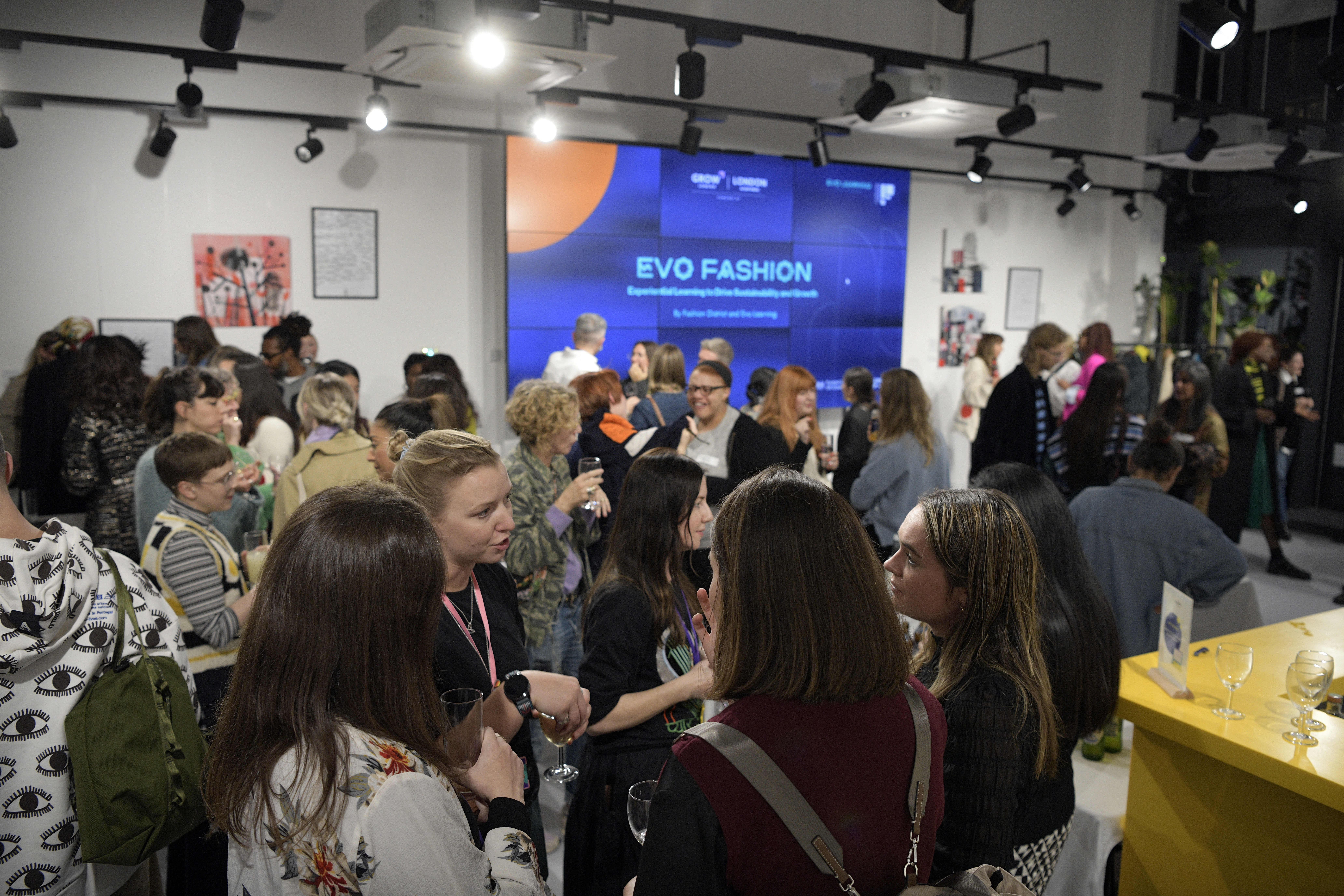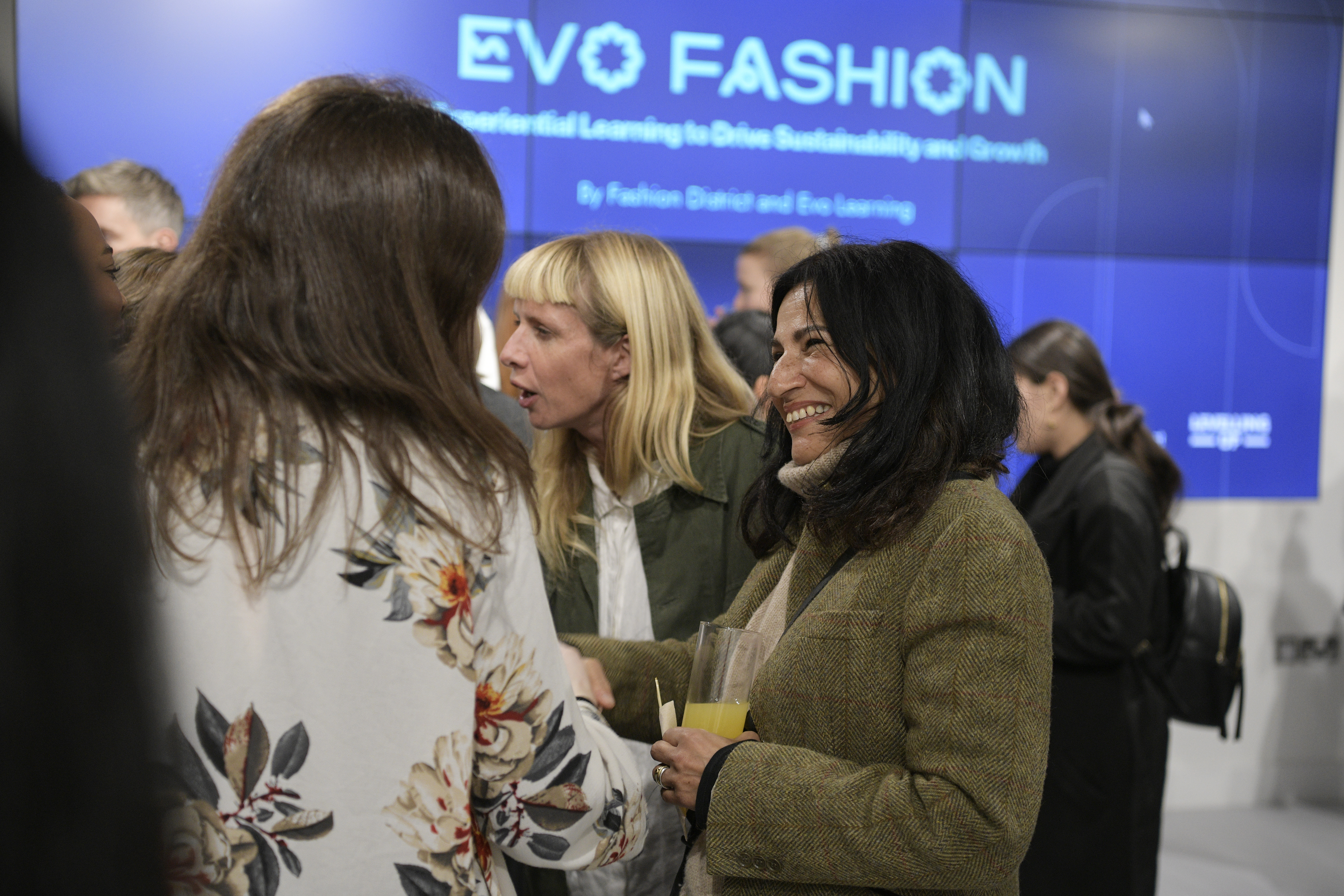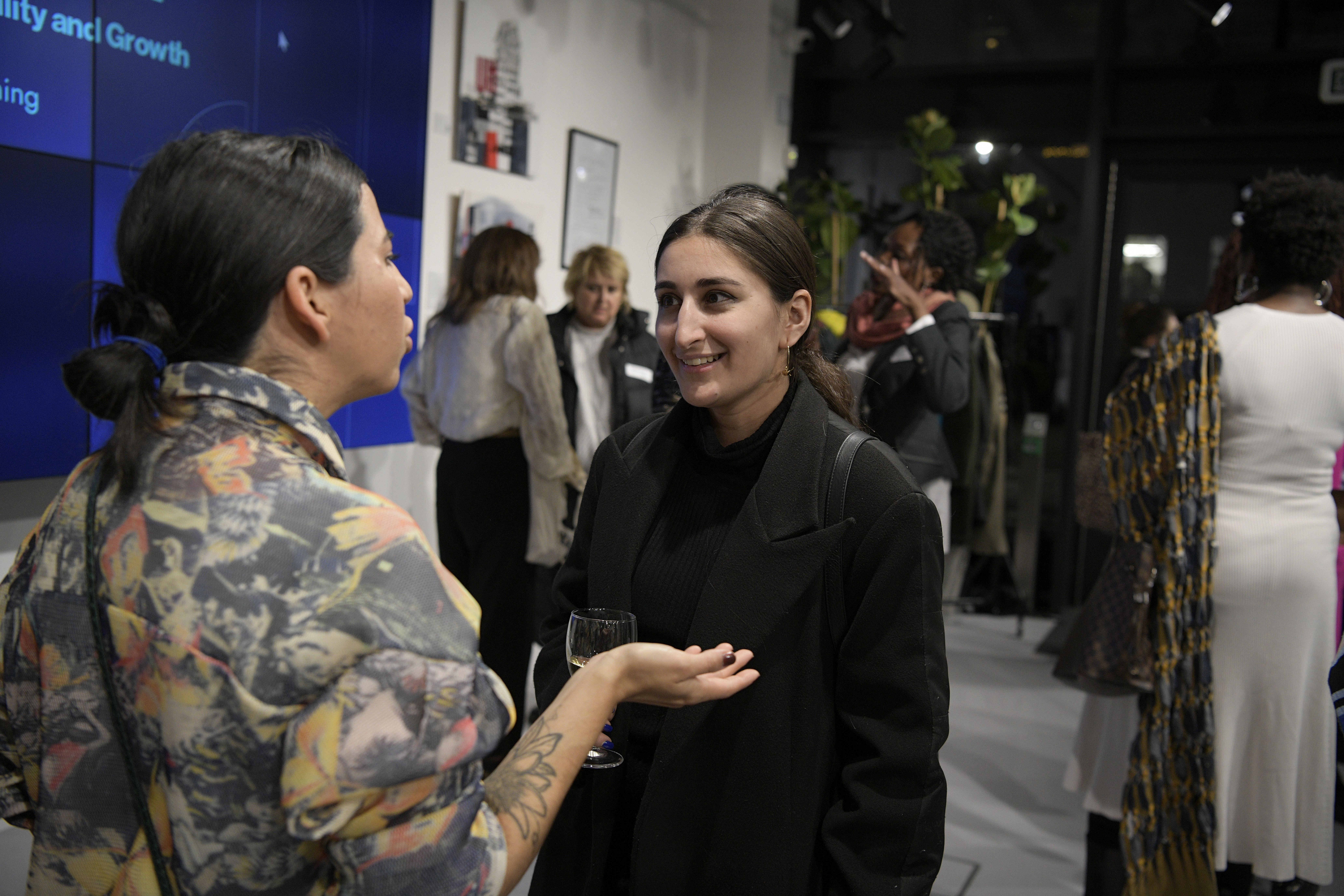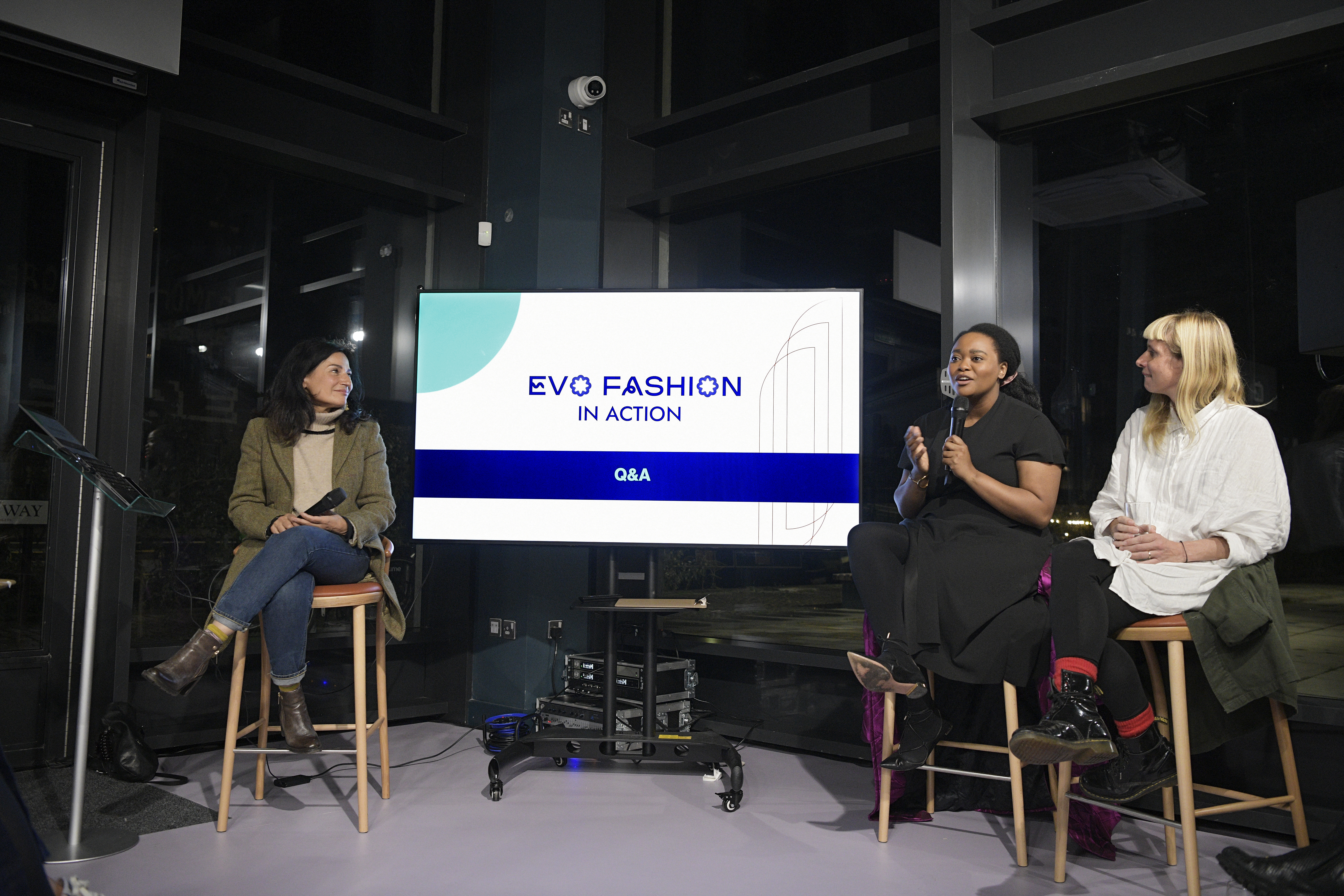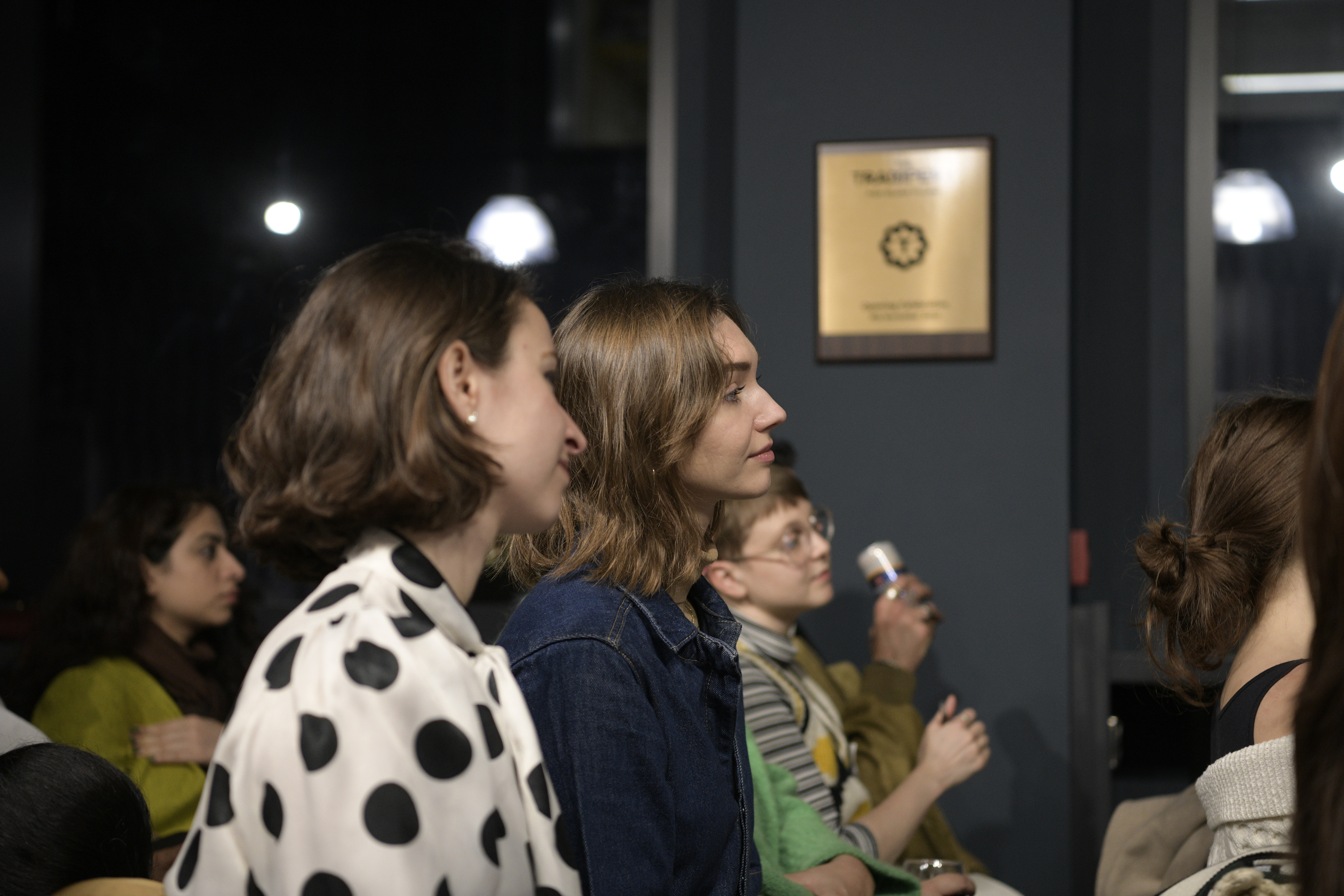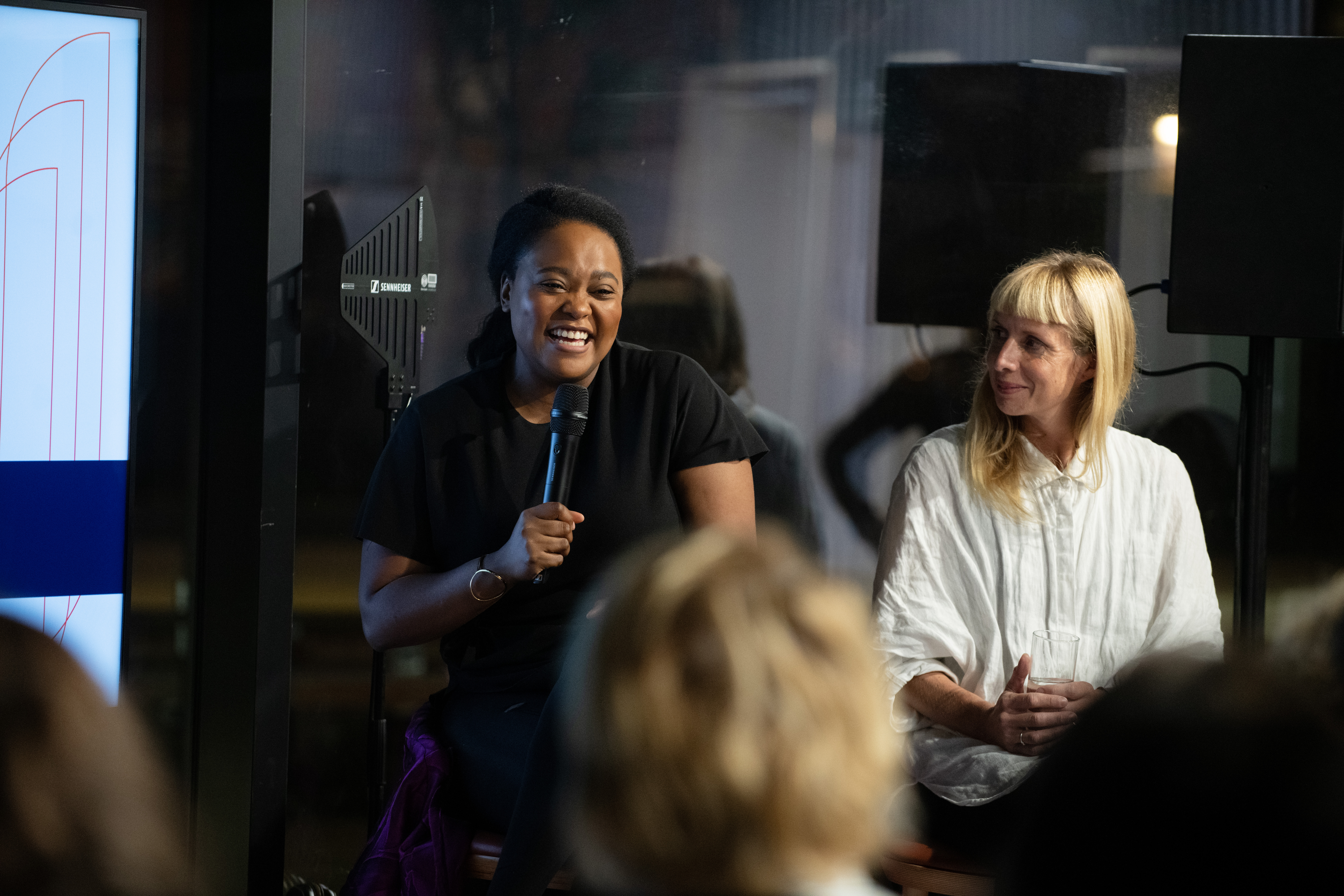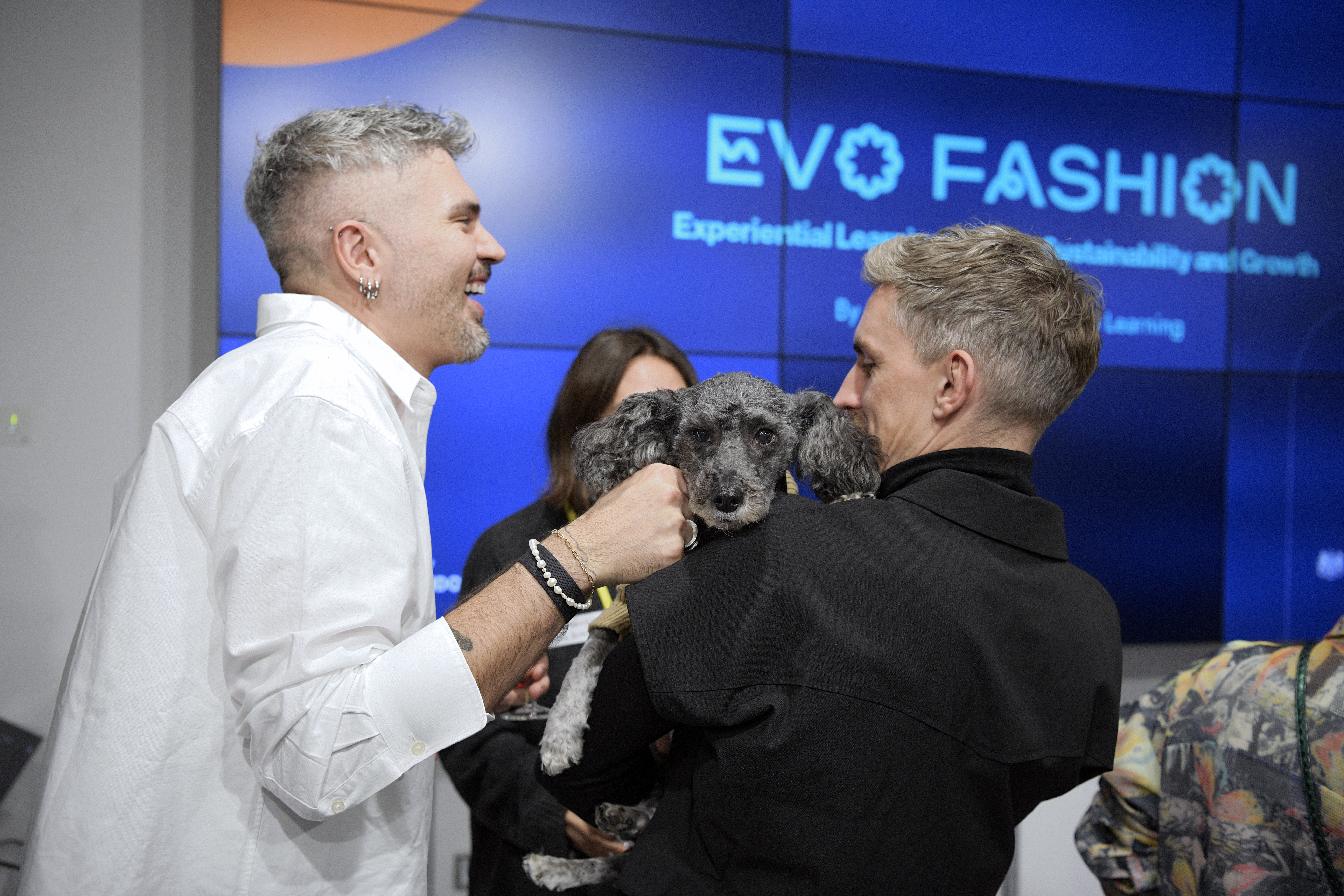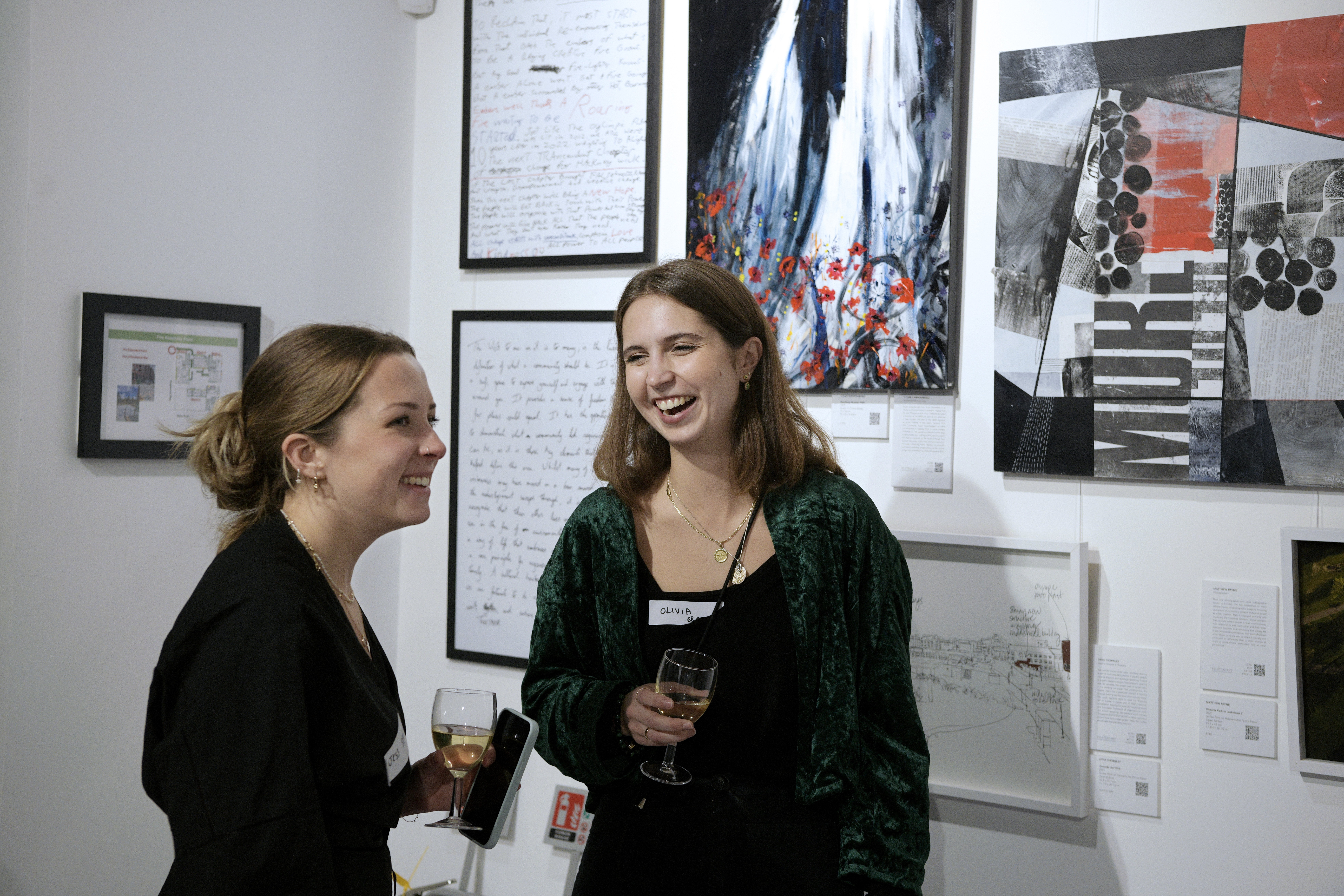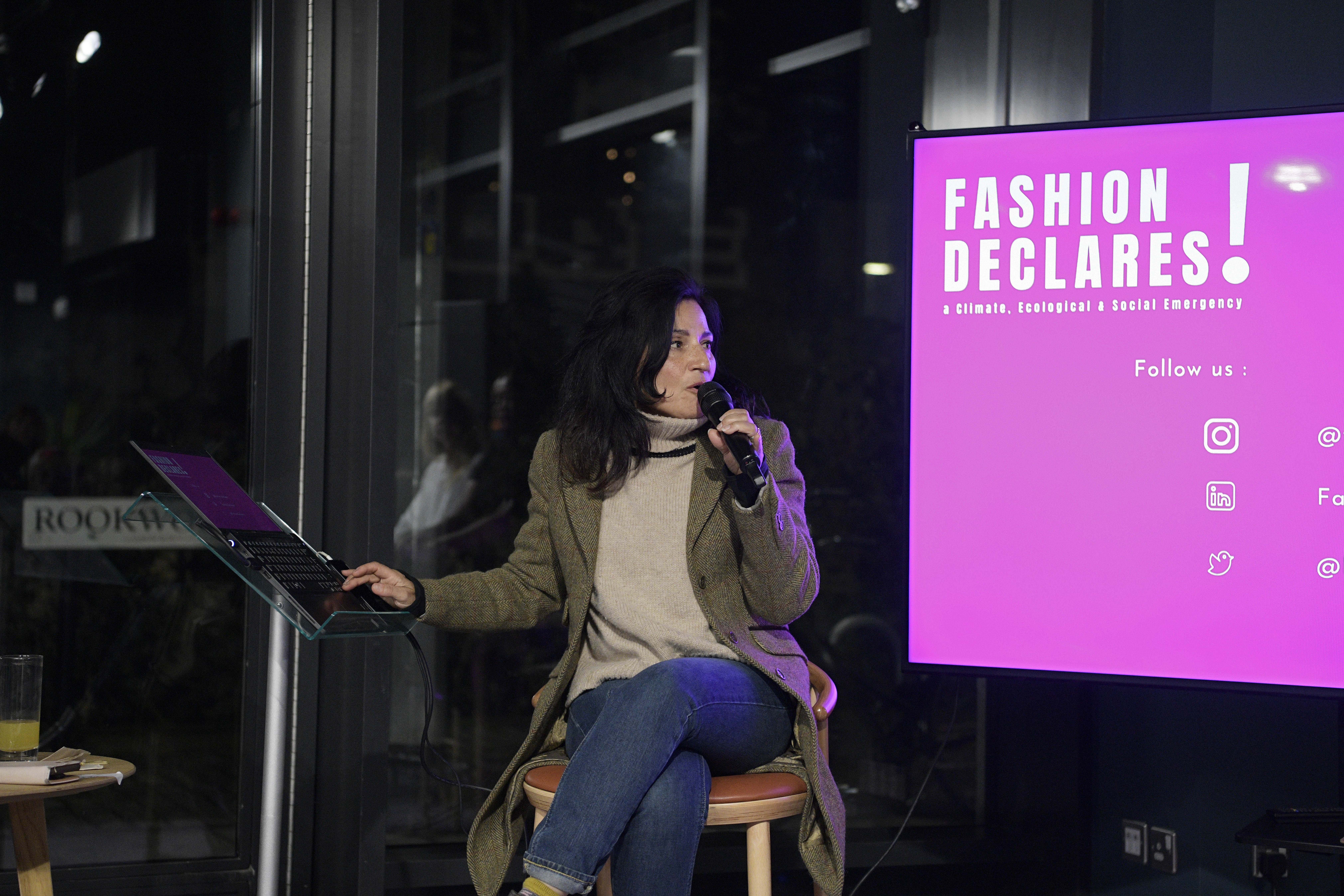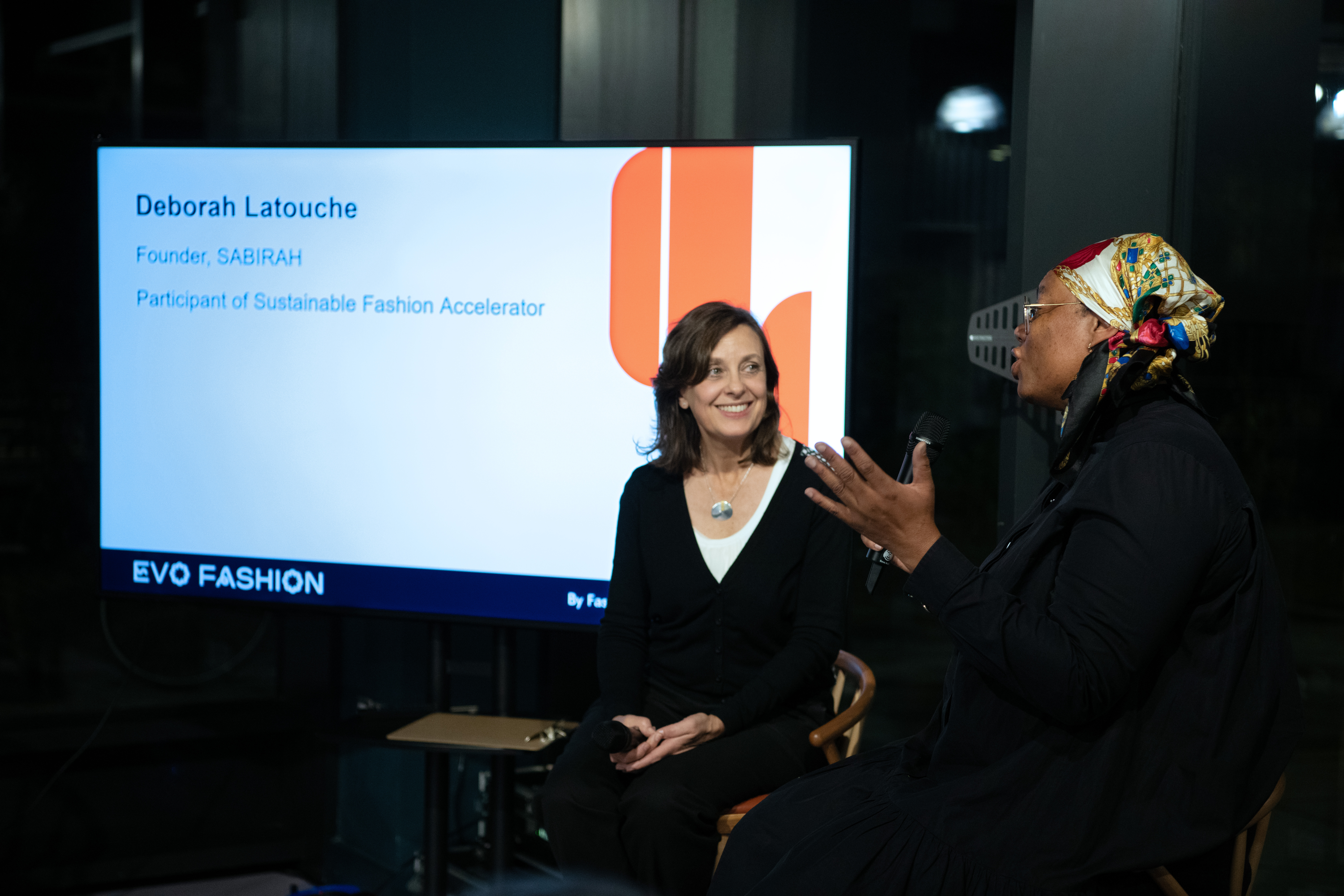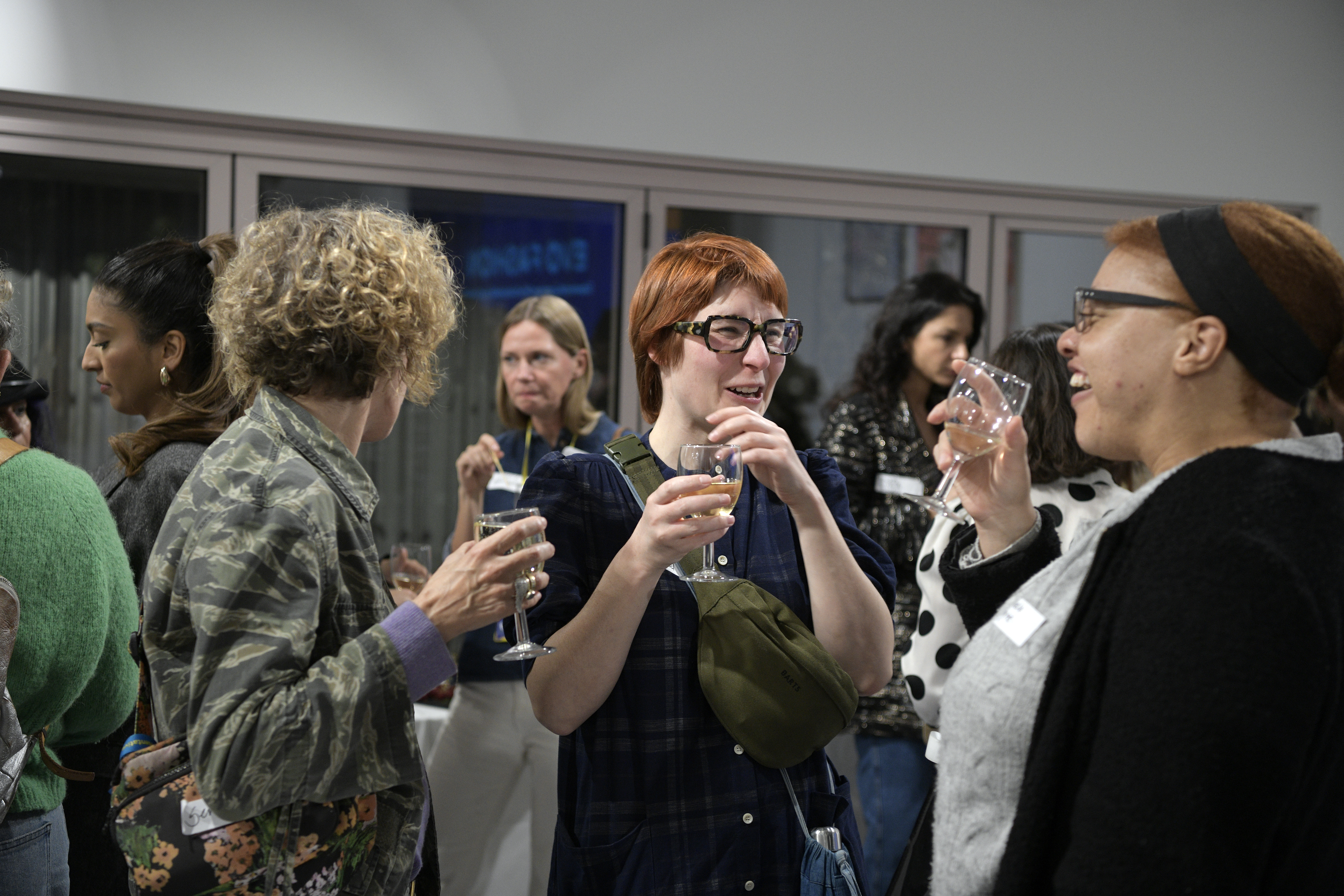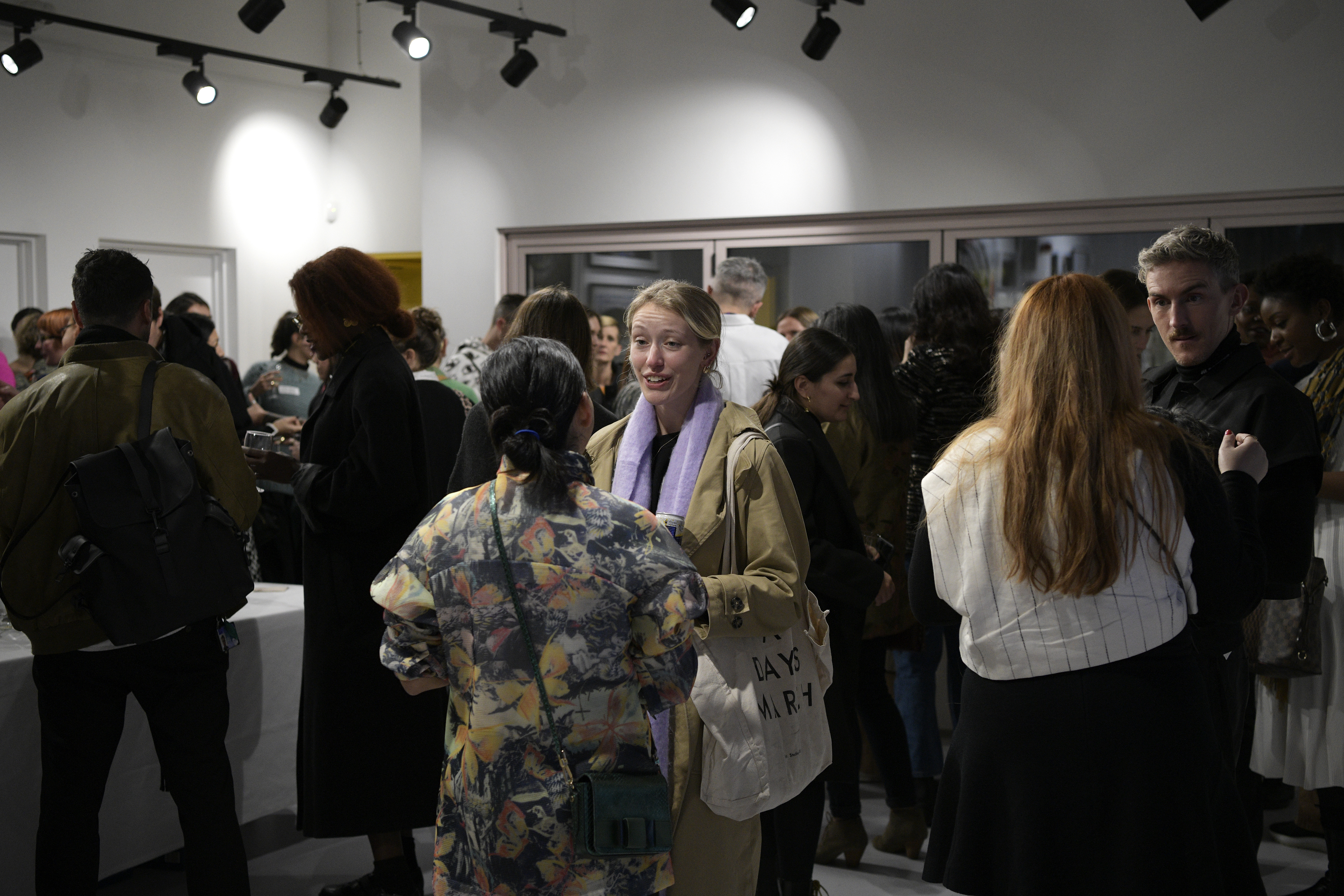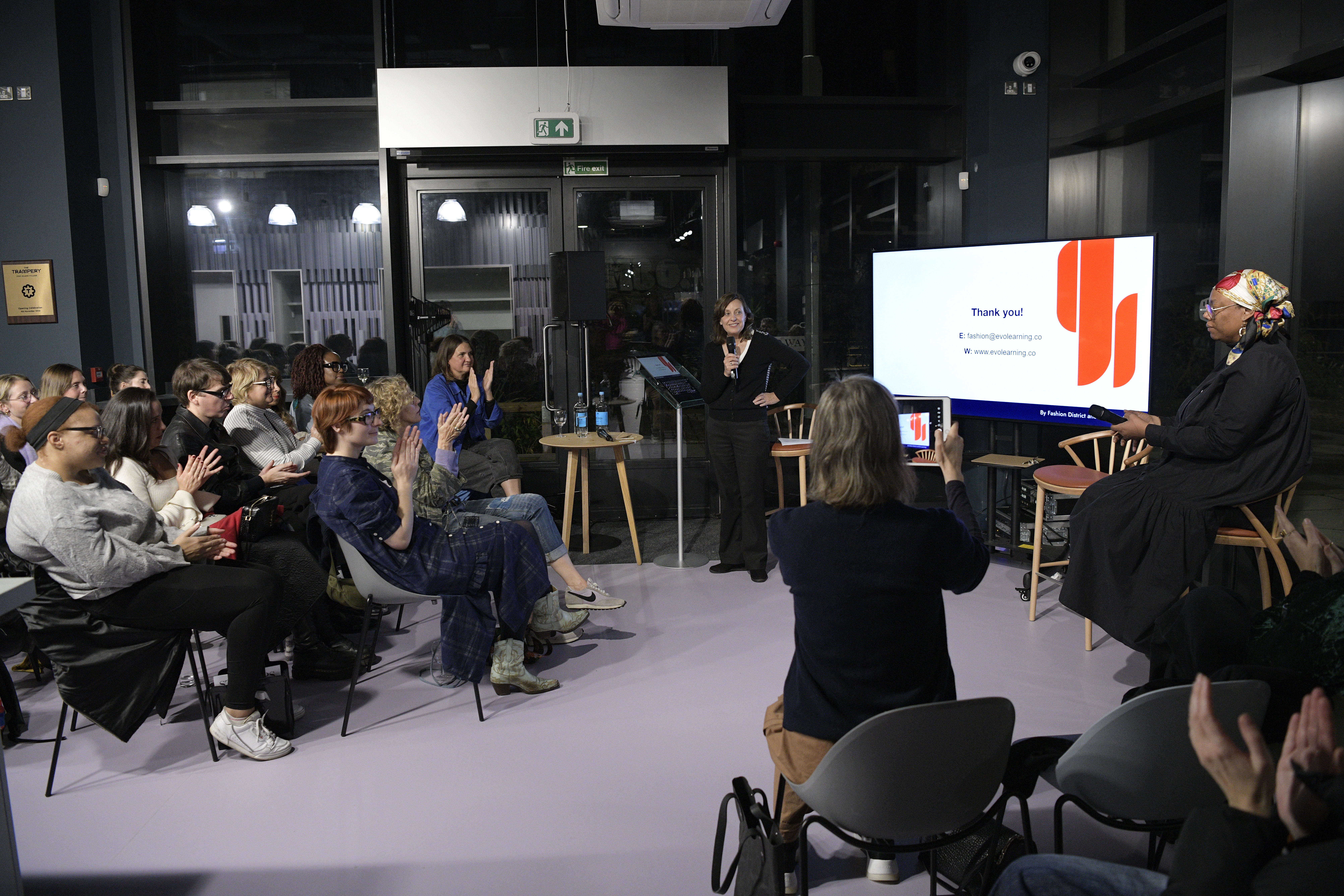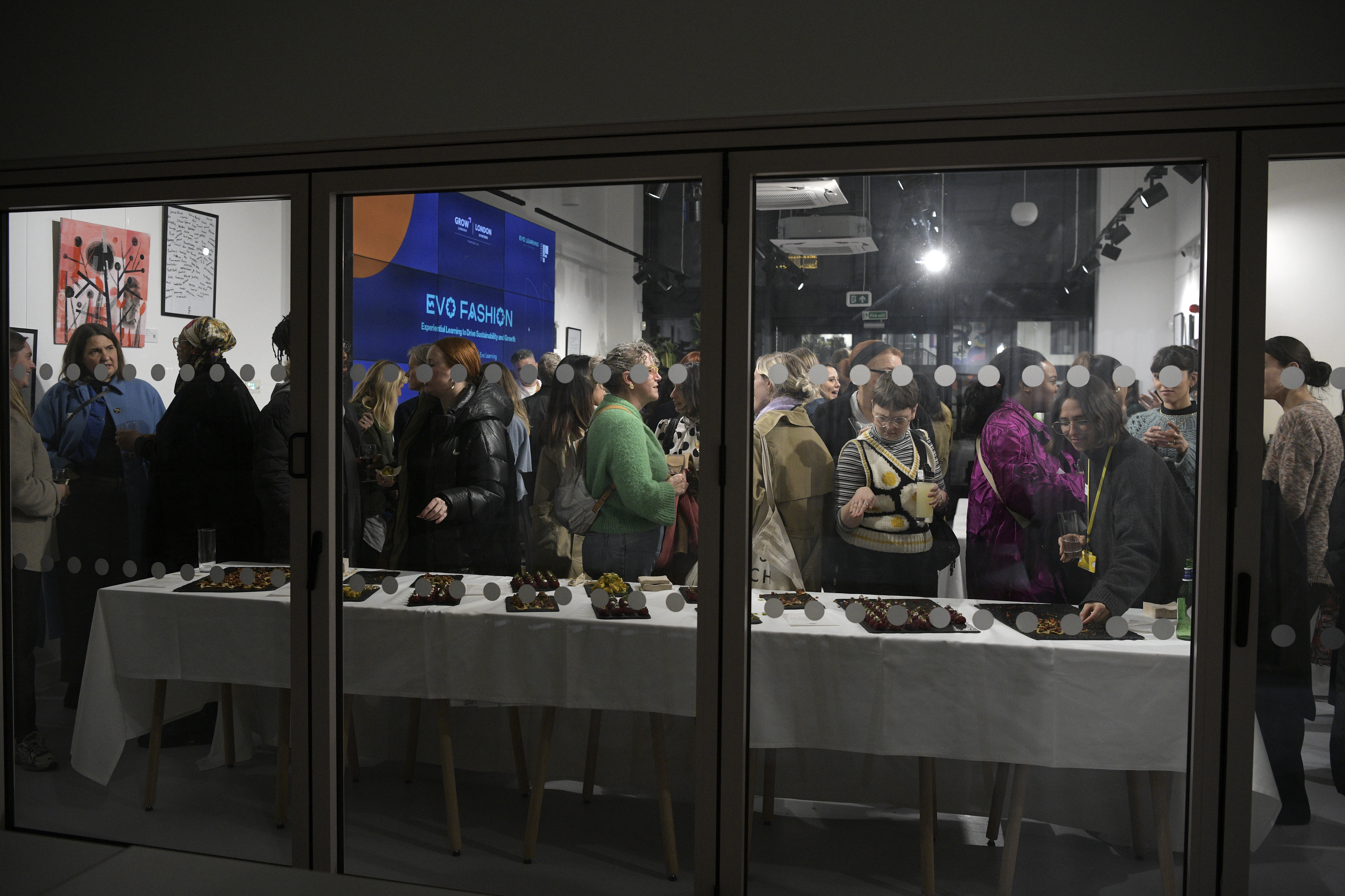Evo Fashion: Cohort Two Graduates at The Backroom Pitch!
On Tuesday, the spotlight shone brightly at The Trampery Old Street, where The Backroom Pitch marked the finale of the Evo Fashion programme. An evening steeped in innovation and ingenuity, the event brought together 24 start-ups, each with a vision to transform the fashion industry. From trailblazing sustainability solutions to bold new technologies, the event was a celebration of purpose-driven entrepreneurship, showcasing the power of creativity and dedication in tackling the fashion industry’s most pressing issues.
As the final Evo Fashion event of the year, The Backroom Pitch not only concluded the programme but also represented the beginning of an exciting new chapter in our founders’ entrepreneurial journeys. For each start-up, it was an opportunity to gain invaluable insight into their business’s potential – insight that will shape the future of their ventures. The event also provided an opportunity to connect with investors, business advisers, and industry experts, all eager to engage with the next wave of breakthrough ideas.
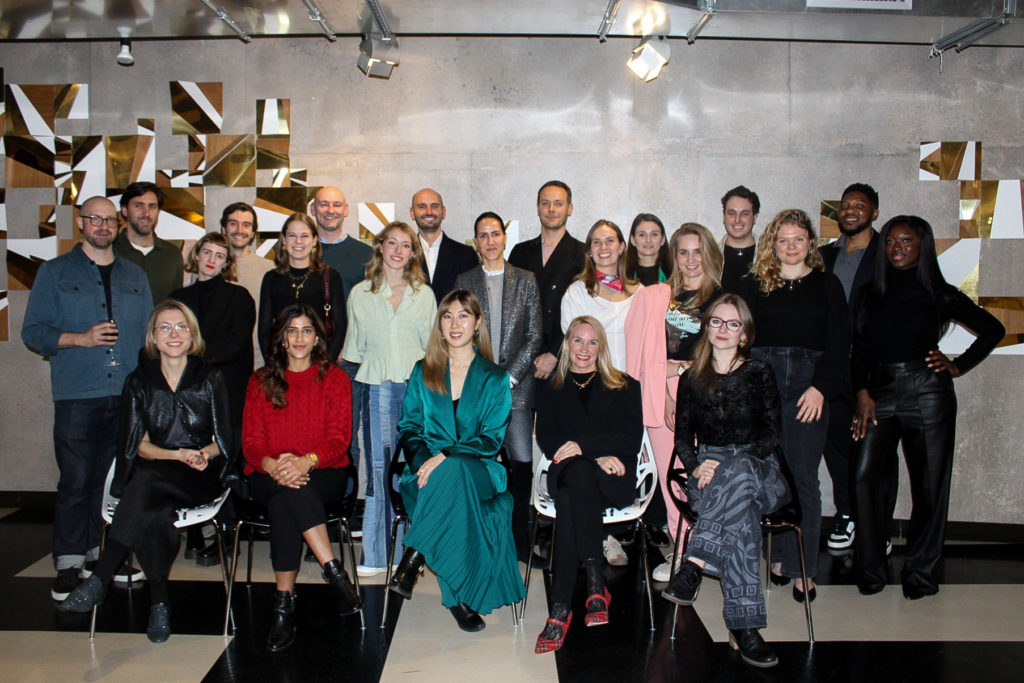
Evo Fashion
Delivered in partnership with Evo Learning – a training subsidiary of The Trampery, as part of London & Partners’ Grow London Early Stage Programme funded by the UK Shared Prosperity Fund – Evo Fashion delivered an experiential programme for start-ups and early-stage businesses that took an holistic approach to business strategy, helping them drive economic growth while also integrating sustainability into every aspect of their businesses.
Designed to fit in with work commitments and delivered by experts, the programme consisted of a two-day intensive launchpad and four full-day masterclasses which focused on different aspects of learning, including environmental and social governance, opportunities for innovation, sustainable growth and investment, finance and business planning, and founder wellbeing, leadership and impactful teams. Peppered in amongst the sessions and masterclasses, there was tailored 1-2-1 mentoring, three peer-to-peer learning workshops, and the opportunity to showcase and pitch to investors, business advisors, and industry experts at this week’s Backroom Pitch.
About The Backroom Pitch
Taking place across two spaces within The Trampery, the event saw founders pitch to carefully selected panels.
In the first room, start-ups pitched to experienced investors with knowledge on how to spot high-potential ventures. The focus was on investment readiness, with panellists offering constructive feedback that helped founders view their businesses through a financial lens. This was a key opportunity to pitch to seasoned investors and gain insights into how to attract funding and scale successfully.
Meanwhile, in the second room, a panel of five business advisers and industry experts offered a different kind of expertise. Here, the emphasis was on refining business models, improving pitch presentations, and assessing innovation strategies. The advisers provided actionable feedback that allowed each founder to refine their presentation skills, focusing on the strengths of their business and potential areas for improvement. This gave the start-ups the clarity they needed to take their ventures to the next stage.
Each pitch expressed creativity and innovation, with start-ups tackling sustainability challenges across an array of different areas, including:
- Retail and manufacturing technology
- Supply chain software
- AI and AR solutions
- Circular and regenerative practices
- New materials and textile waste innovations
- Digital innovation
After each pitch, panel members offered tailored feedback, asked thoughtful questions, and shared their expert advice. For the founders, it was a rare chance to showcase their businesses and receive feedback on their pitch, deck, innovation, business model, and more. Throughout the evening, guests enjoyed drinks and nibbles provided by INIS.
The highlight of the event was the opportunity for our startups to interact with an incredible panel of investors and advisers. The experts brought a wealth of experience and insight, helping each founder identify key areas for growth and development. A huge thank you to everyone who took part.
A Green Future
Marking the final event on the Evo Fashion calendar for 2024, this year has seen Fashion District and Evo Learning support 39 start-ups committed to making the fashion industry more sustainable, ethical, innovative, circular, and regenerative. We look forward to watching their next steps, offering support wherever we can, and we wish all Evo Fashion graduates continued success on their entrepreneurial journeys.
Want to stay up to date on Fashion District’s latest opportunities, news, and events? Sign up for our newsletter.
Emerging Designers Graduate from Evo Fashion With a Showcase at The Conduit
On Wednesday 3rd July, the first cohort of fashion brands and designers graduated from our Evo Fashion programme, delivered in partnership with Evo Learning, at a special industry showcase at The Conduit.
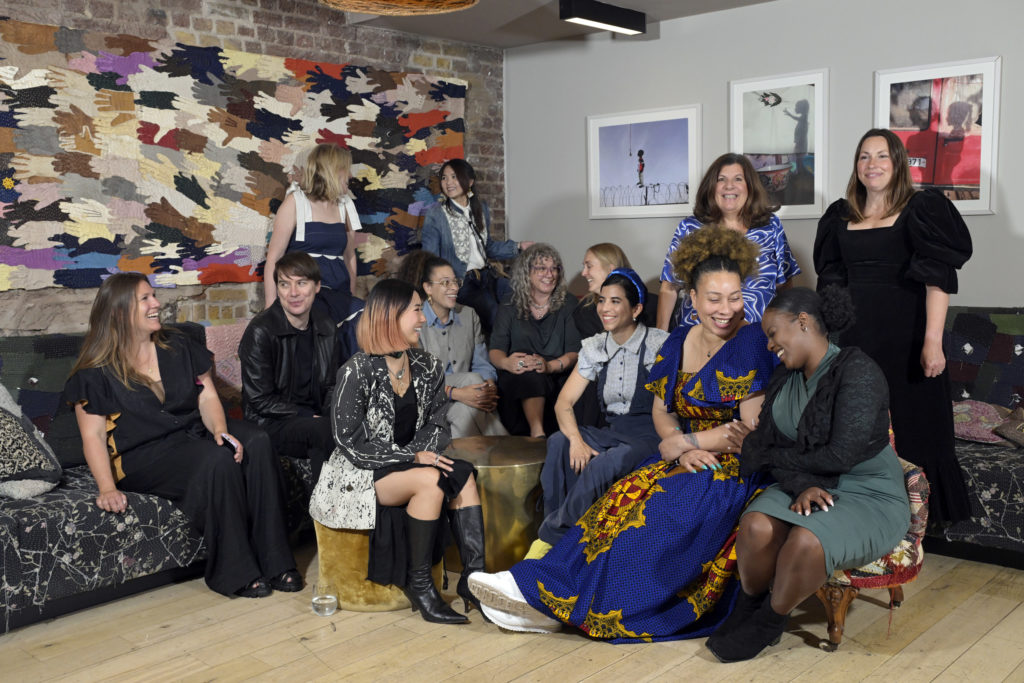
‘I want to say a big congratulations to our Evo designers—the first cohort to attend our Evo Fashion business programme—who are showcasing their outstanding products, garments, and accessories in the room tonight,’ says Helen Lax, Director of Fashion of District, onstage at the Manufacturing Futures 2024 Awards Supper. ‘The programme was designed to help businesses become more robust, focusing on all aspects of their operations, including finance, production, distribution, and product.’
Looking around the room at The Conduit, where mannequins draped in beautiful prints boldly catch the eye and rails displaying everything from chunky knitwear, summer dresses, and streetwear, to fun accessories, inclusive underwear, and luxury leather shoes are being perused by attendees, one can’t help but admire the wealth of talent showcased by the Evo Fashion designers. It’s not hard to feel optimistic about the future of the fashion industry with brands like these emerging.
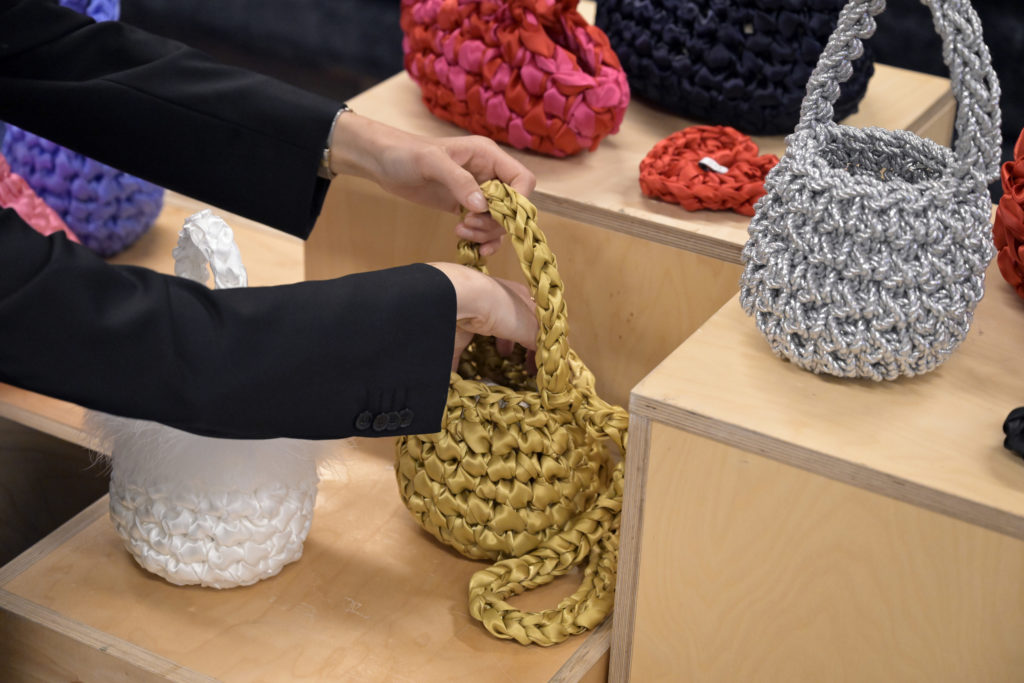
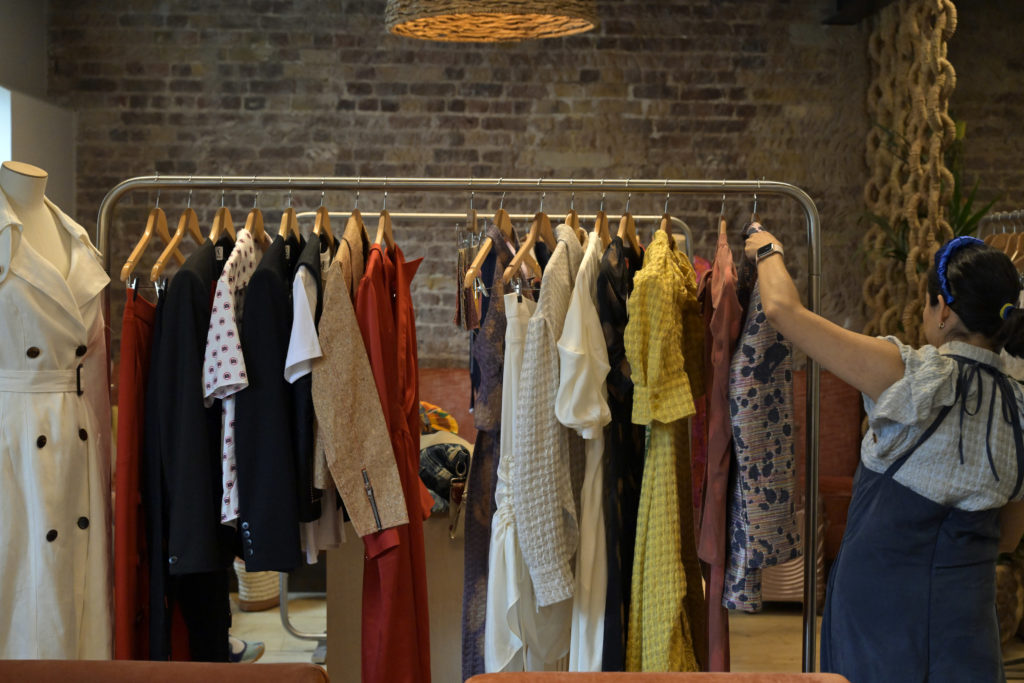
Delivered in partnership with Evo Learning, a training subsidiary of The Trampery, as part of London & Partners’ Early Stage Grow Programme funded by the UK Shared Prosperity Fund, Evo Fashion delivers an experiential programme for emerging brands that takes a holistic approach to business strategy, helping them drive growth while also integrating sustainability into every aspect of their businesses.
Designed to fit in with work commitments and delivered by experts, the programme consisted of a two-day intensive launchpad and four full-day masterclasses which focused on different aspects of learning, including environmental and social governance, exploring new business models, production and innovation, sustainable growth and investment, finance and business planning, and founder wellbeing, leadership and impactful teams. Peppered in amongst the sessions and masterclasses, there were panels and talks, tailored 1-2-1 mentoring, three peer-to-peer learning workshops, a creative photoshoot, and tonight’s presentation at Fashion District’s Manufacturing Futures 2024 Awards Supper to a room full of investors, brands, startups and innovators.
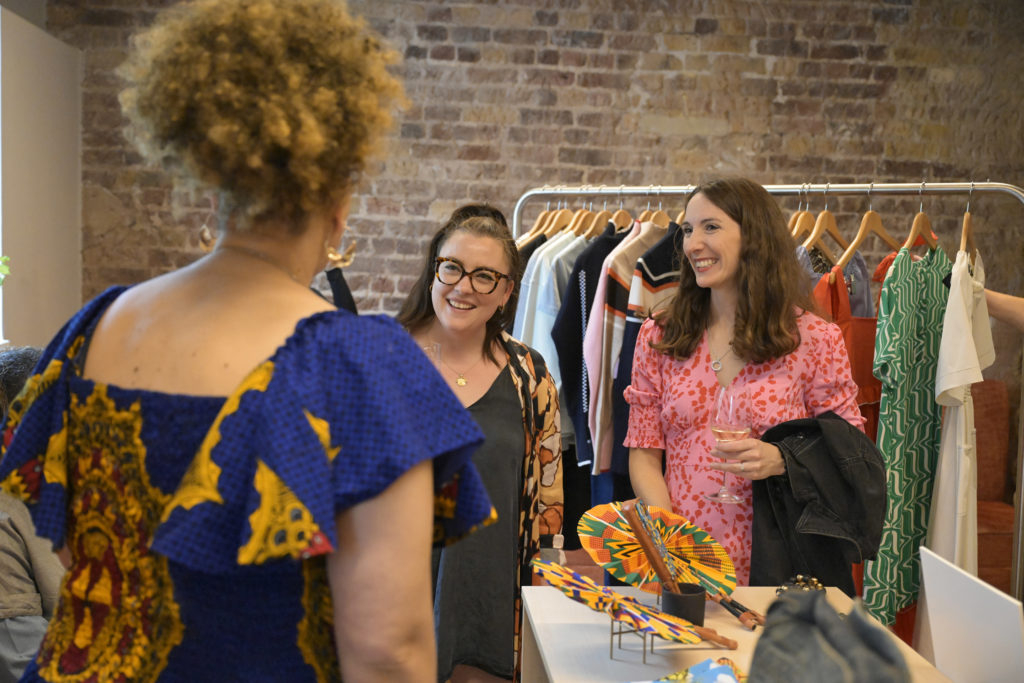
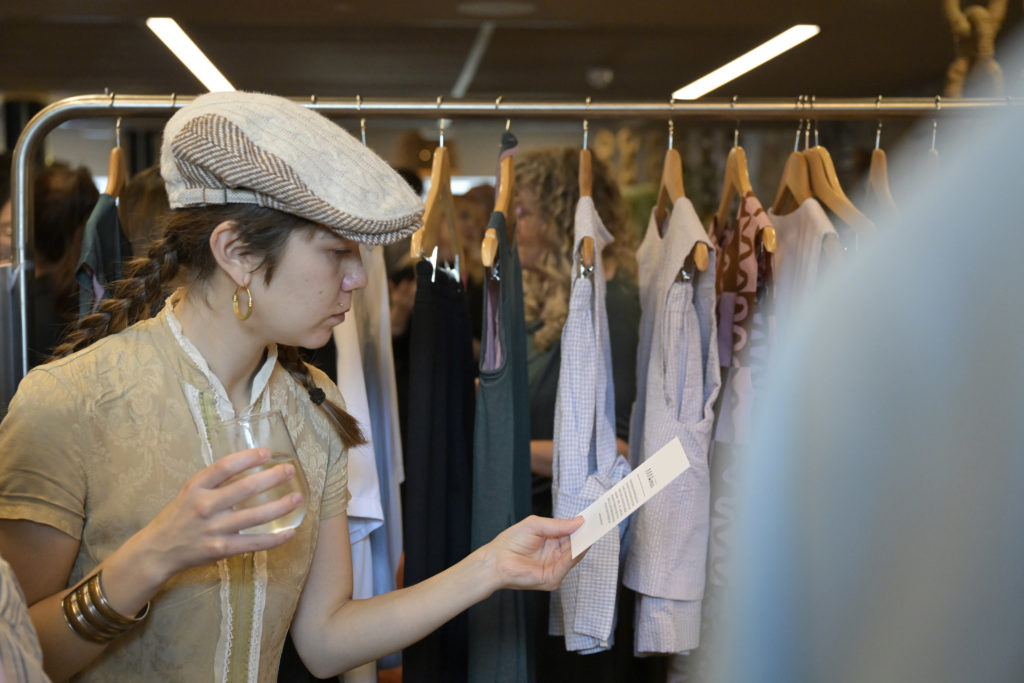
Selected by a stellar judging panel including Vanessa Podmore, Founder of Podmore Consulting; Yvie Hutton, Director of Design Relations and Membership at the British Fashion Council; Charles Armstrong, CEO of The Trampery, and Helen Lax, Director of Fashion District, our 15 participants were chosen based on their potential for business success and their commitment to integrating sustainability into their ventures.
The first Evo Fashion cohort included: Anciela, Asmuss, BEEN London, Clara Chu, Colèchi, Everyday Phenomenal, Fashion Meets Music, Isla de Gar, Kyle Ho, Mirla Beane, NEW STANDARD, OMNISS, Percy Langley, Pomi and Seeds, and ZERØ London.
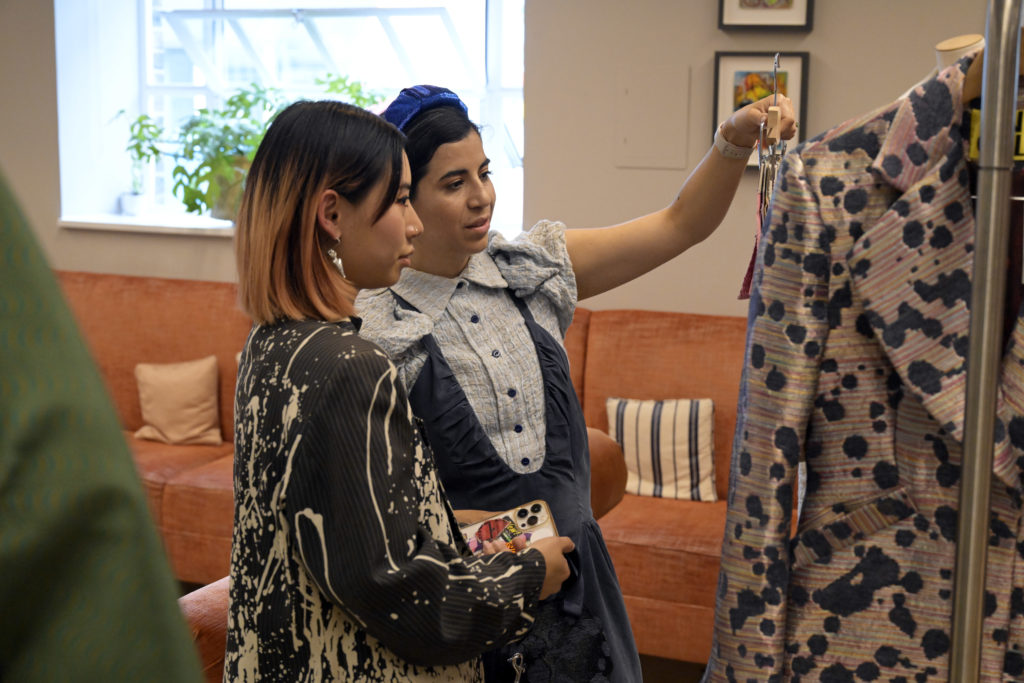
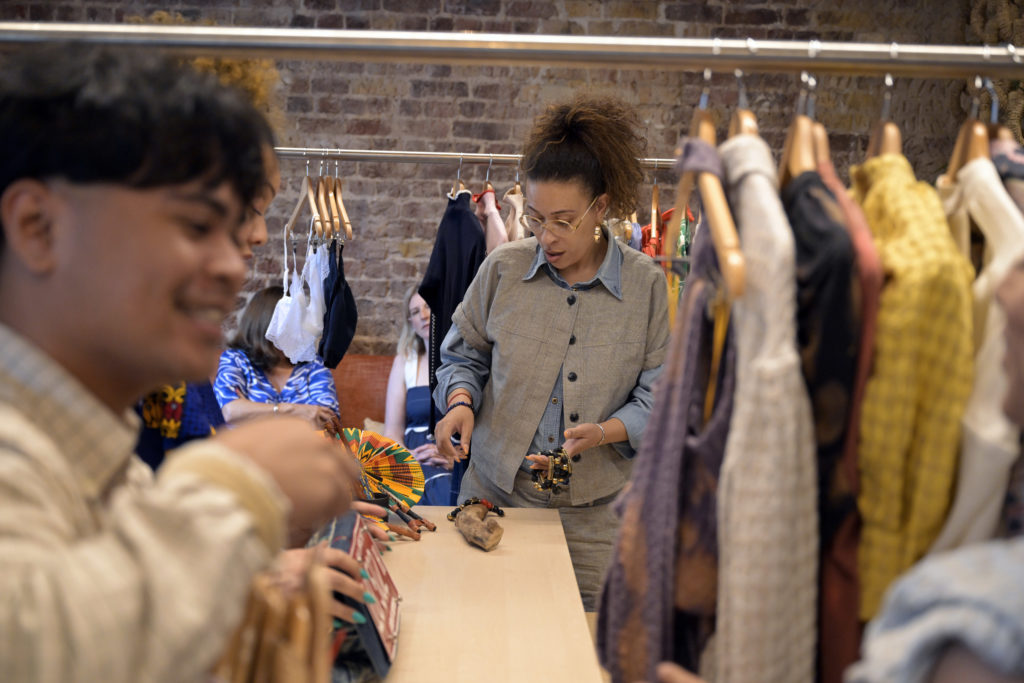
Speaking with Tukiya Mutupa, Founder of Pomi and Seeds, about the programme, she says, ‘I found the course really educational and practical. There aren’t a lot of programmes that help sustainability-focused fashion brands. This is the only one I’ve seen that’s fashion focused. I’ve been on learning programmes before that focused on wider business perspective development, but Evo Fashion was so comprehensive. We covered everything from manufacturing, materials, and product, to hearing from industry leaders and receiving tailored feedback in 1-2-1 sessions. It was amazing.’
Emma Garner, Founder of Isla De Gar, echoed this sentiment. ‘It’s been so valuable,’ she tells me. ‘I’ve been growing my brand organically, but I haven’t put any systems in place and that’s what this course has enabled me to realise. I come from a design background and started out as a designer and maker, so I didn’t really have any kind of goals or plans – I was just obsessed with bags! When I heard about Evo Fashion and its focus on business growth, finance, and sustainability, I realised it was the perfect fit for me. I liked that the programme offered tailored guidance with personalised 1-2-1 sessions and I found the marketing and financing days so useful. Those areas aren’t my forte, but I’ve now realised those are the things I need to hone in on.’
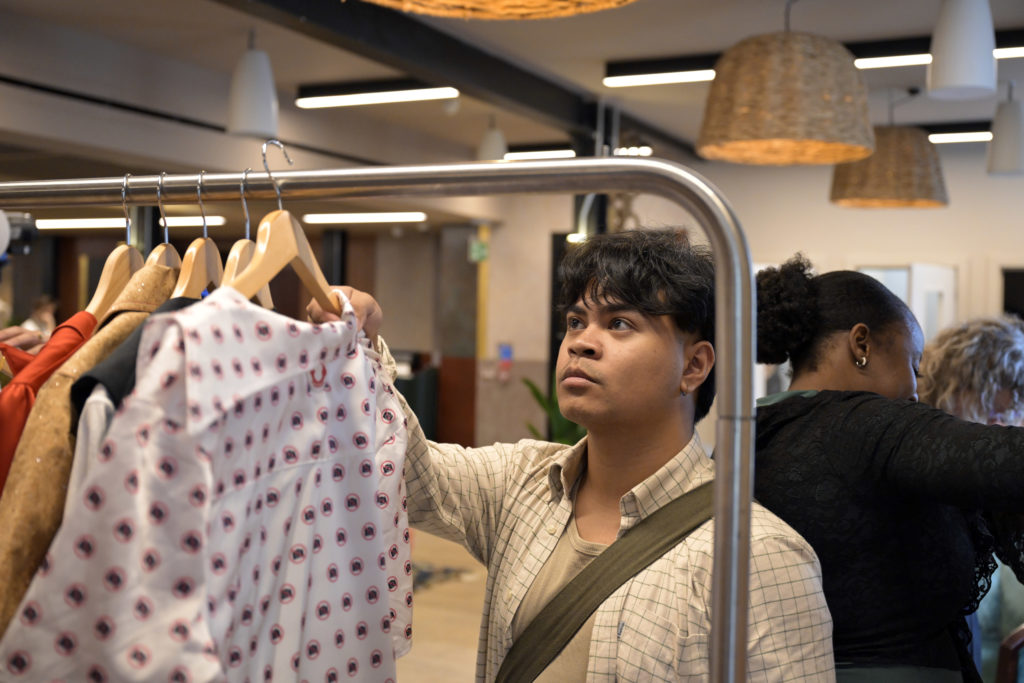
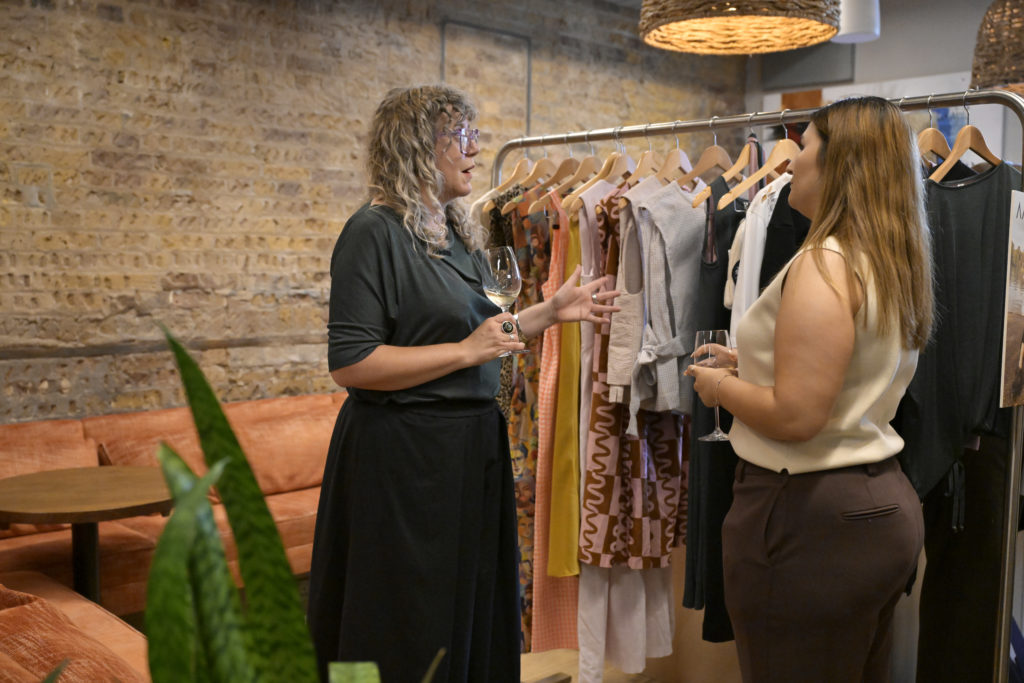
‘What we loved about the Evo Fashion programme was how holistic the content was,’ says Lizzy Lambie, Co-Founder of Fashion Meets Music. ‘There was a lot about personal wellbeing, and for us as a brand that’s really important. Hearing from bigger brands, for example Primark, was also useful. It’s interesting to hear from different kinds of brands and how they’re implementing sustainability into their businesses. We may be SMEs, but it all trickles down to us at the end of the day.’
Clara Chu, multidisciplinary artist and designer, says the course provided her with numerous insights. ‘We discussed the vision for our brands in Vanessa Podmore’s sustainability session, and I came away pondering how to make truly impactful change. After Stuart Balmer’s finance and investment session, I thought about how to keep my business afloat without going bankrupt. Emily Bingley’s marketing and communications session made me consider how to effectively communicate my brand’s message to the public. The course was well-rounded, bringing together various perspectives. Now, it’s time to follow their advice and take the next steps.’
We can’t wait to follow these fifteen brands’ journeys. Stay tuned to hear about Evo Fashion’s second cohort soon!
All images: Christian Sinibaldi
Stay up-to-date on our latest events and opportunities by following us on Instagram and LinkedIn:
- Instagram: @fd_ldn
- LinkedIn: Fashion District – London
Fibe wins Manufacturing Futures Innovation Challenge
Fashion District announced the winner and runner-ups of Manufacturing Futures 2024 at an Awards Evening hosted in The Conduit’s Ubuntu Lounge.
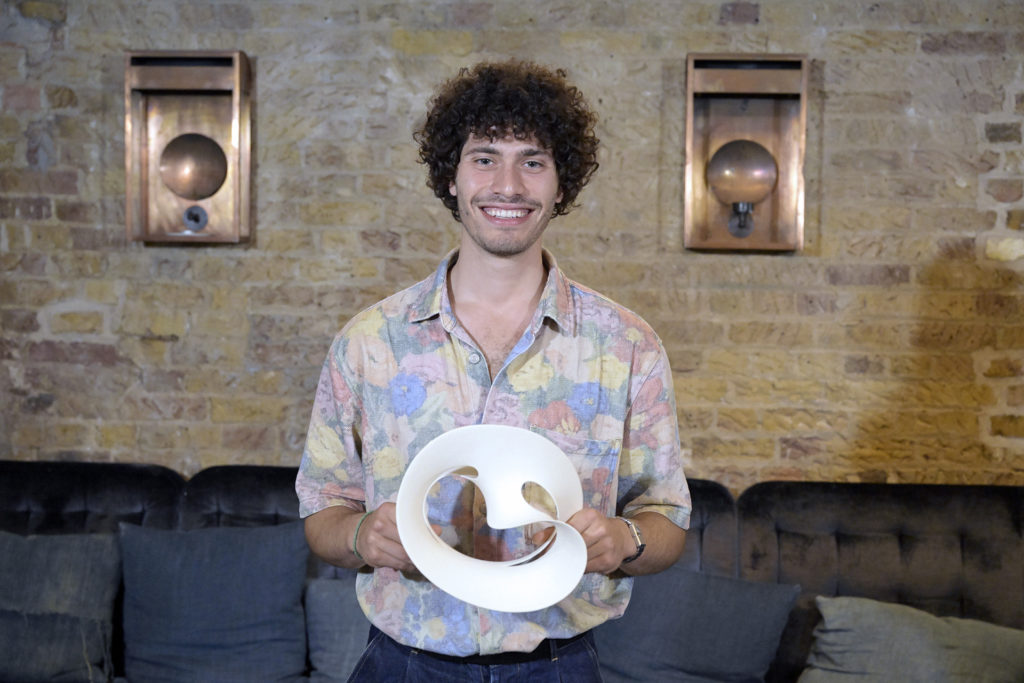
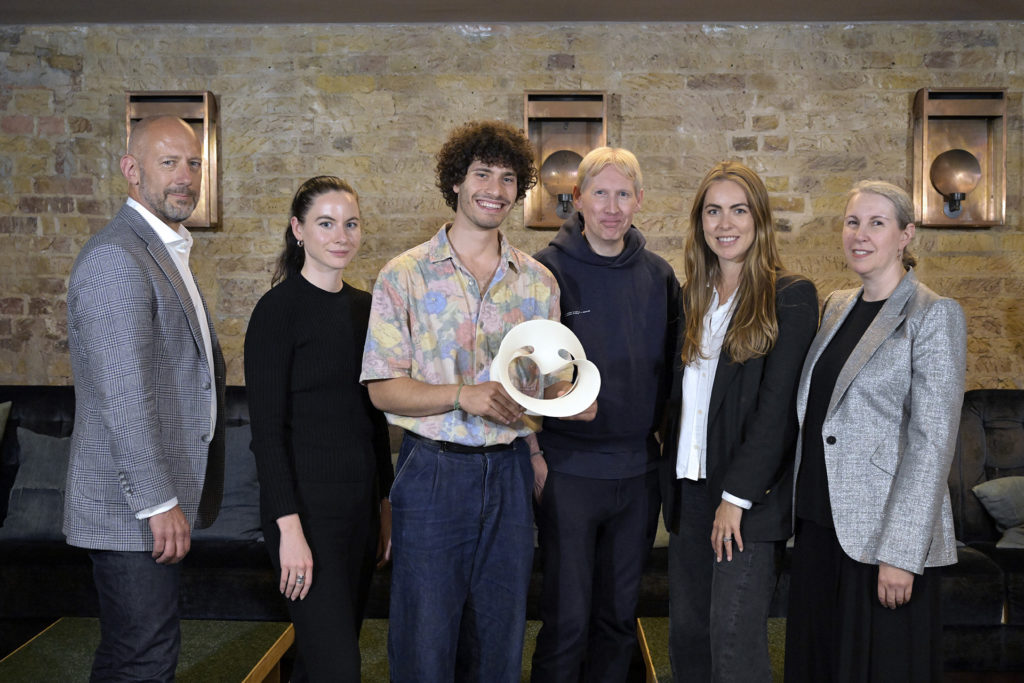
Fashion District has announced Fibe as the winner of its 2024 Manufacturing Futures Innovation Challenge. Fibe is a material science startup developing the world’s first textile fibres out of potato harvest waste. The company is developing the most scale, affordable and sustainable textile fibres with comparable performance to mainstream materials. They will receive £15,000 to advance their innovation and grow their business.
The winner was chosen by a judging panel of industry experts, including Ella Gould, Head of Sustainability and Innovation at Selfridges; Chelsea Franklin, Head of Advanced Concept Design at PANGAIA; Gillian Lipton, sustainability consultant most recently at Alexander McQueen; Matthew Drinkwater, Head of Fashion Innovation Agency at London College of Fashion, UAL; and Adam Mansell, CEO of UKFT.
Ella Gould, Head of Sustainability and Innovation at Selfridges and Manufacturing Futures judge, said:
“I feel so energised and hopeful after seeing such a broad spectrum of pitches solving problems across fashion’s entire value chain. The judges were unanimous in Fibe winning this year’s award. The energy in the room after their pitch was palpable and we so look forward to seeing them take their fiber innovation to the next level. Who knew potatoes were so exciting!”
Idan Gal-Shohet, co-founder of Fibe, commented:
“I’m really excited about winning the Manufacturing Futures prize. I’ve known many of the start-ups in this programme for a long time and have so much respect for them, which is why winning this prize means so much to us. The funding will be used to expand our business, so we are able to harvest a variety of different crops and create better conditions for farmers around the world. Our mission in the end is to create materials that use far fewer environmental resources than what’s currently available. Thank you so much to the judges and organisers for giving us this great opportunity to grow Fibe.”
The runners-up, who will each receive £5,000 for their business, include Sequinova, who are making biodegradable sequins out of cellulose; and Fab Materials, who are converting hard to recycle fashion waste into valuable boards and composites, such as furniture.
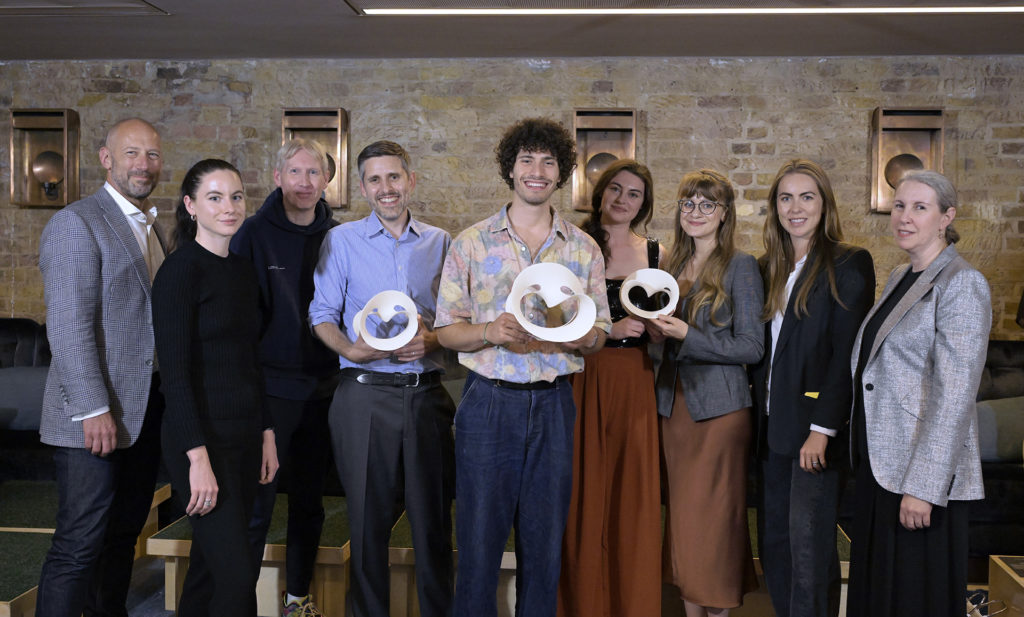
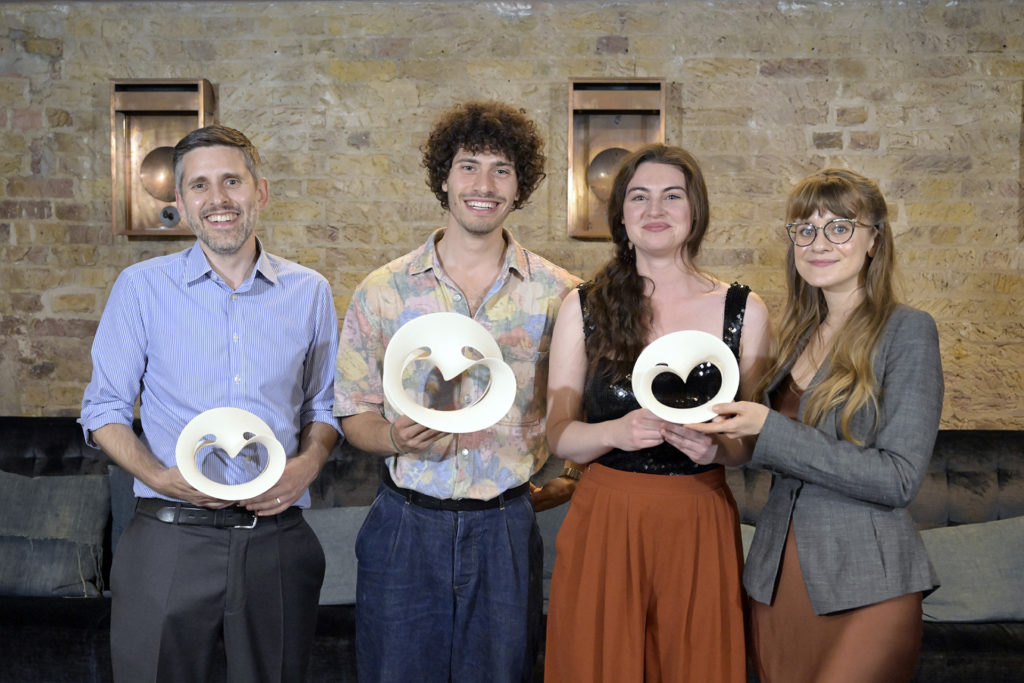
Helen Lax, Director of Fashion District commented:
“Congratulations to Fibe for winning this year’s Manufacturing Futures Innovation Challenge. I am thoroughly impressed by the talent and creativity of all the start-ups who took part in this year’s challenge and am hopeful for the future of the industry. There’s plenty we can do to improve and start-ups like these take us one step closer to achieving tangible change.”
The following brands were also part of the 2024 iteration of Manufacturing Futures: Innovation Challenge:
- Arda Biomaterials – turning spent grain from the beer brewing and whisky distilling industries into a novel, leather-like material
- Fiiba – scaling sustainable materials for the fashion industry made from 100% agricultural waste
- Oxford Biopigments – plant-based dyes that are naturally lightfast and perform like synthetic dyes
- PACT – creating performance and aesthetic ready textiles made from collagen sourced from industrial by-products
- The Seam – the wardrobe care & repair service powered by intelligent tech, that pairs specialist makers with people and brands to keep fashion out of landfill
- TRUSS – simplifying the resale process through instant access to actionable data
- Zori Tex – using the latest technology to optimise the sorting and availability of complex non-reusable textiles
We would like to thank The Conduit for hosting the Manufacturing Futures Innovation Challenge awards ceremony, and everyone that joined us to celebrate.
All images: Christian Sinibaldi
Stay up-to-date on our latest events and opportunities by following us on Instagram and LinkedIn:
- Instagram: @fd_ldn
- LinkedIn: Fashion District – London
Manufacturing Futures 2024 kicks off with Critical Friends Day at Plexal
Last week, we gathered our 10 shortlisted businesses at Plexal’s Innovation Centre for Critical Friends Day, officially launching our 2024 programme.
Taking over the spacious venue, the day was meticulously organised for our 10 shortlisted businesses – Arda Materials, Fibe, Fab Materials, Oxford Biopigments, TRUSS, Sequinova, Zori Tex, Fiiba, PACT, and The Seam – to present their businesses to industry experts and receive valuable feedback ahead of their final presentation to the judges.
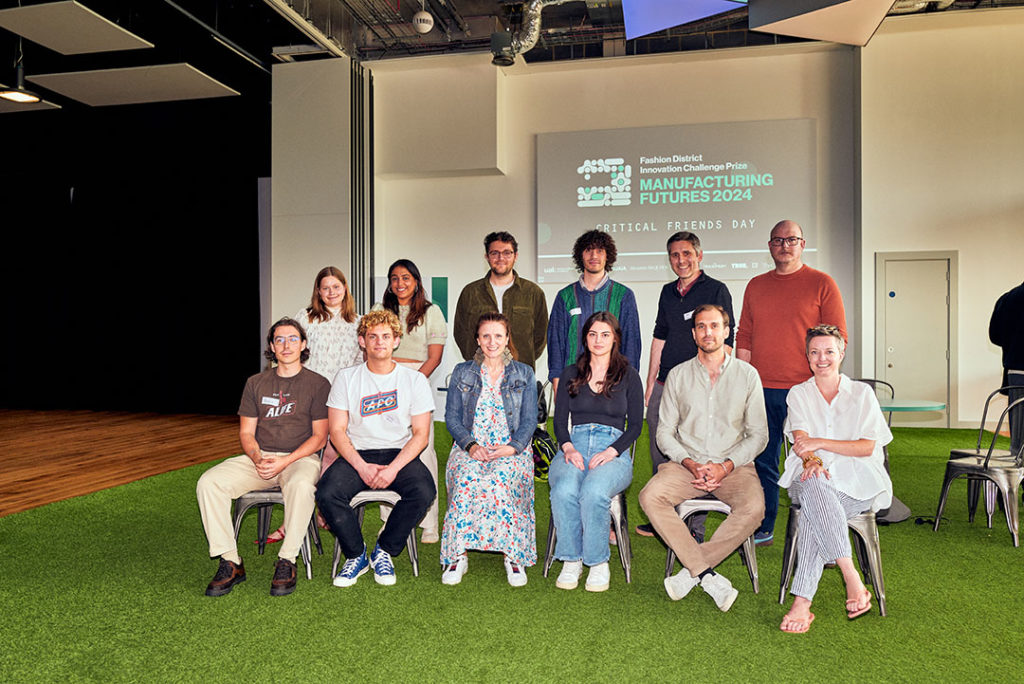
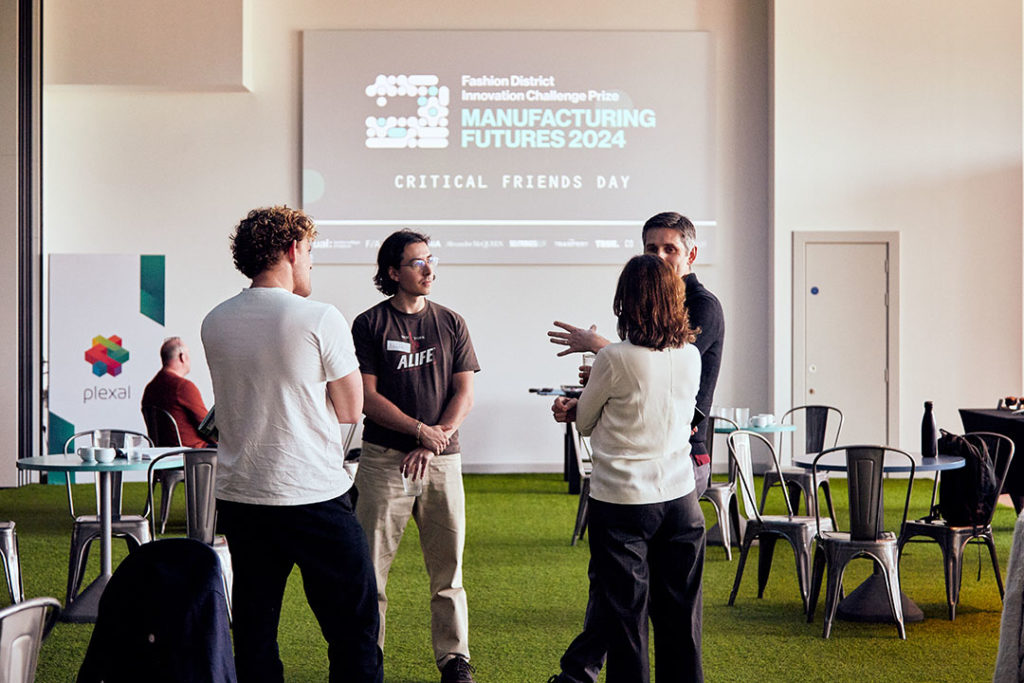
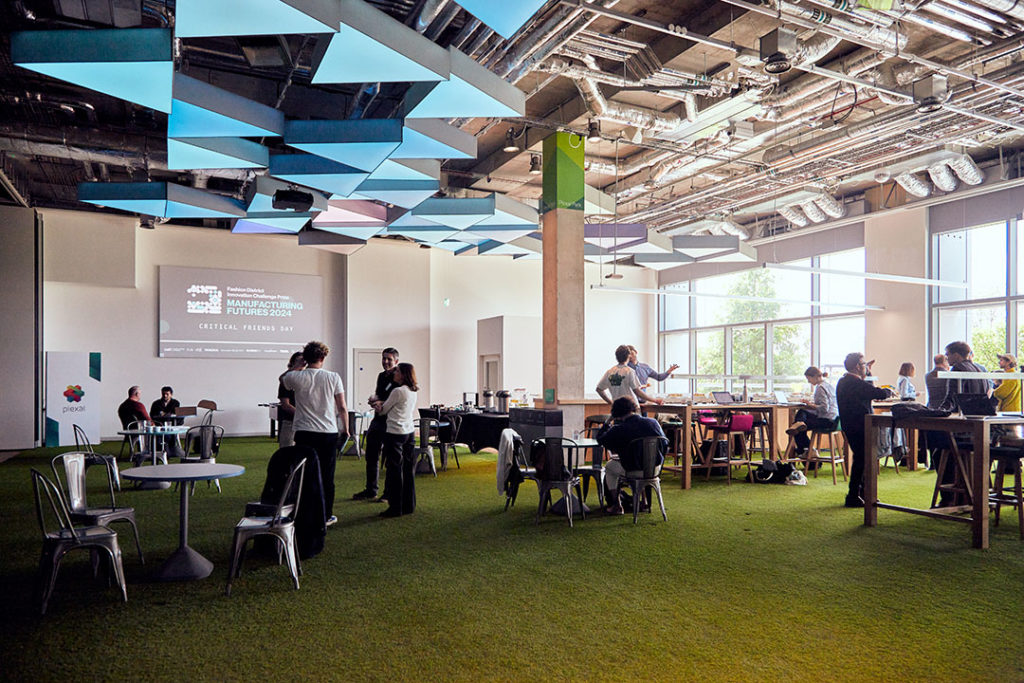
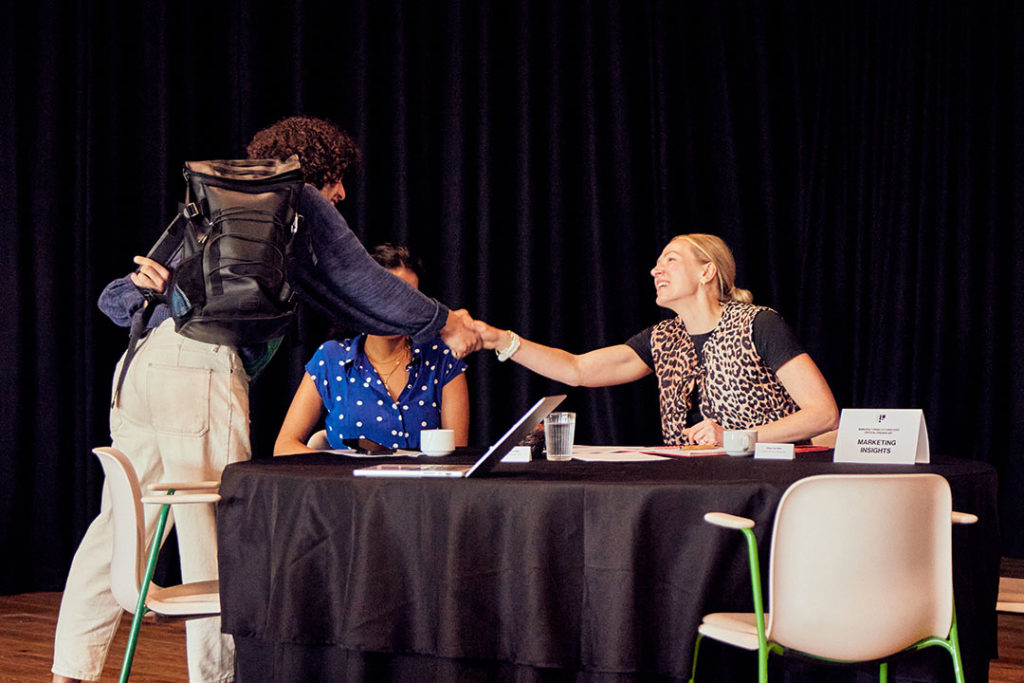
Our Expert Lineup:
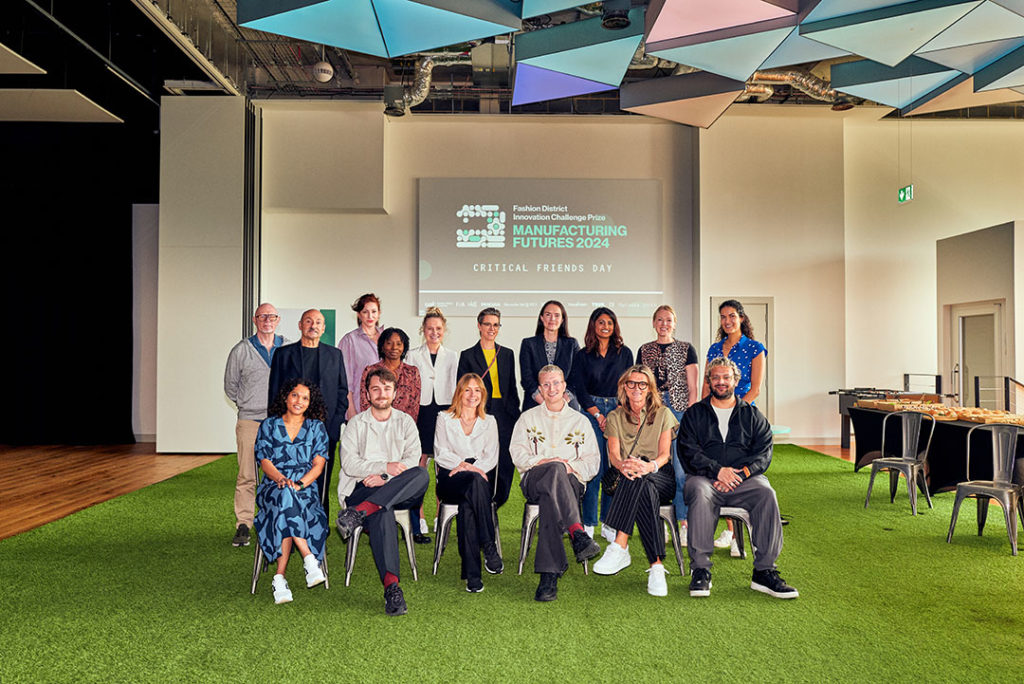
Manufacturing Innovation and Sustainability
- Moin Roberts-Islam | Technology Development Manager, Fashion Innovation Agency, LCF, UAL
- Rory Hugill | Senior Innovation Portfolio Manager, PANGAIA
- Daniel Whitley | Strategic Design Manager, Ellen MacArthur Foundation
- Katarina Rimarcikova | Founder, Fashion Industry Consultant and Senior Lecturer, ALIGN Studio
Manufacturing Production
- Anna Ellis | Head of Business Development, Making For Change, LCF
- Nicola Eibich | Circular Fashion Consultant, M-EASURE
- Gabrielle Shiner-Hill | Co-Founder, Bureau 555
Investment Insights
- Carol Hilsum | Co-Founder of StudioThree, Investment Advisor at TLF Ventures & Imaginary Ventures
- Aarthi Thangavel | Associate – Innovation, TRUE
- Thushara Sabreen | Innovation Strategist, UKRI
Marketing Insights
- Danielle LeToullec | Head of Marketing, True Global
- Elisah van Allen | Head of Social, 33Seconds
Business Growth and IP
- Jo Gregory (Partner) and Sheldon Cordell (Chairman) | Joelson Law
- Stuart Balmer | Fashion and Creative Business Consultant, Stuart Balmer Associates
- Holly Smith | Innovation Lead, Plexal
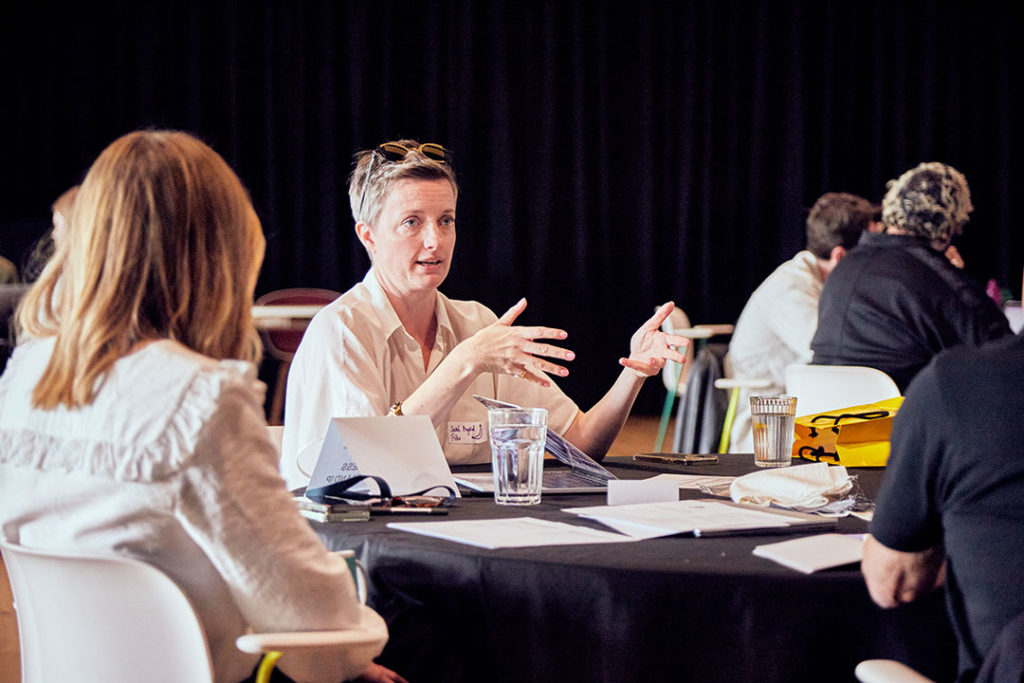
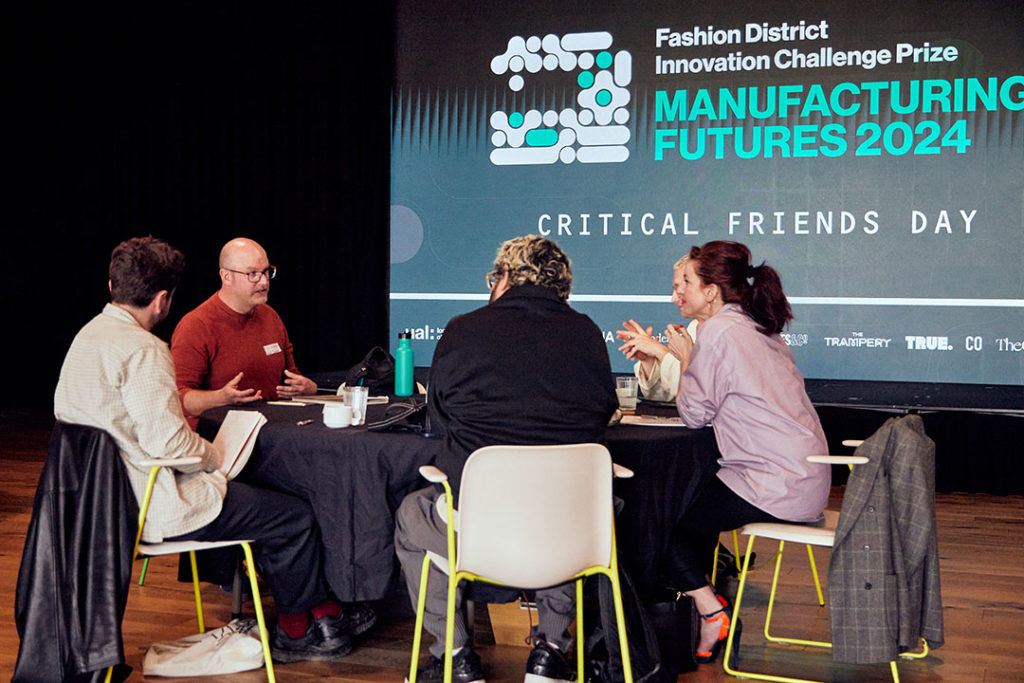
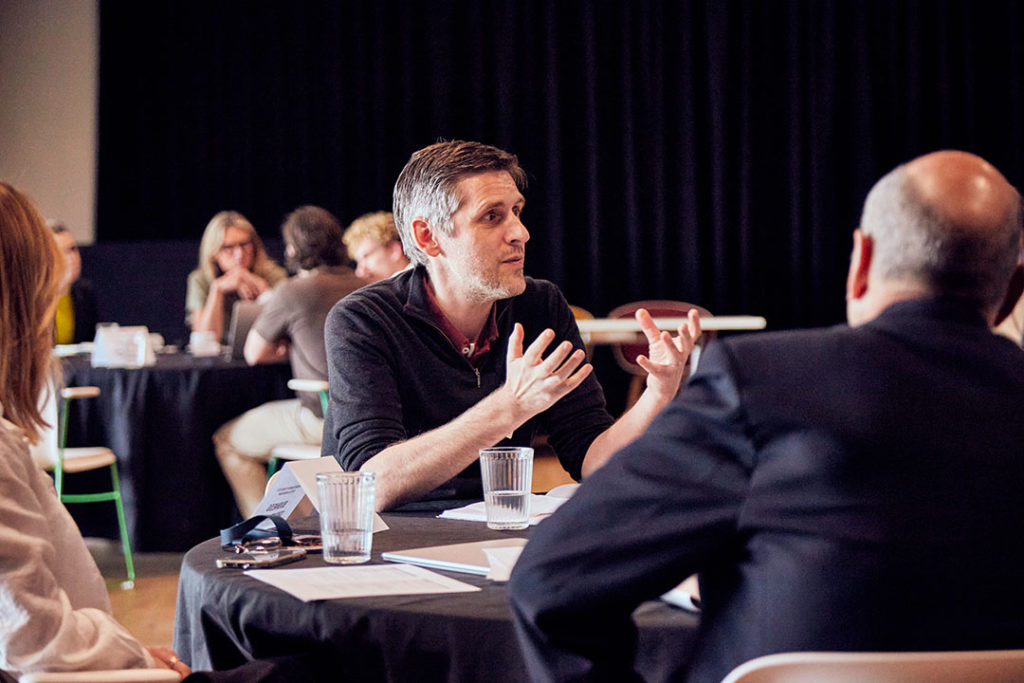
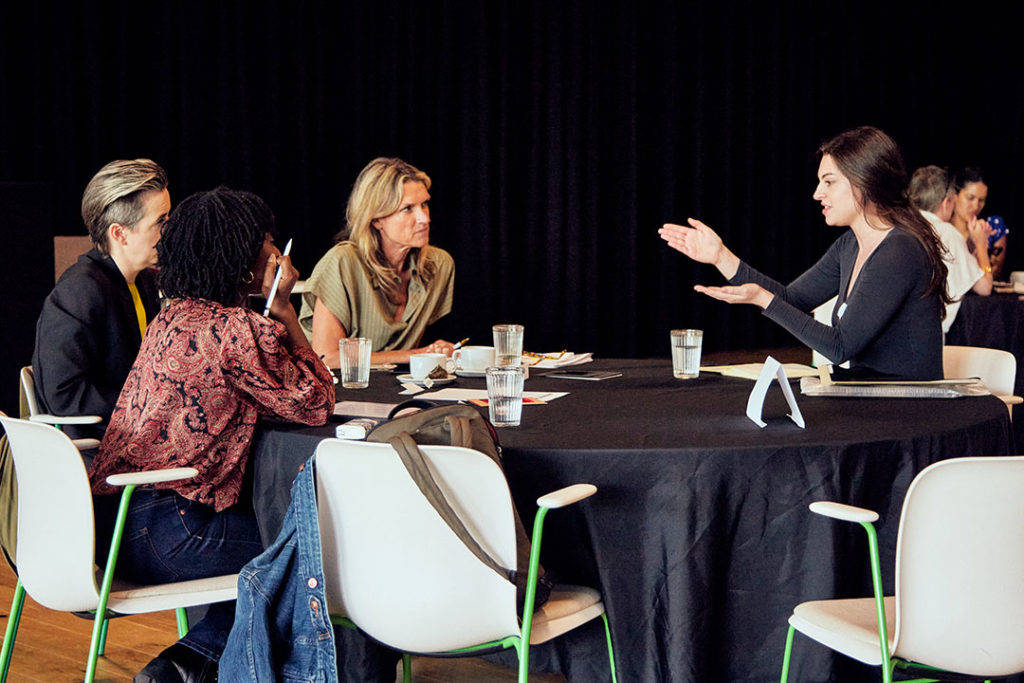
Empowered by real-time feedback on their businesses, many of the startups left with actionable steps outlined by the critical friends to help elevate their growth. Throughout the day, breaks in the timetable provided ample opportunities for the businesses to get to know each other, fostering the exchange of ideas, opportunities, and mutual support.
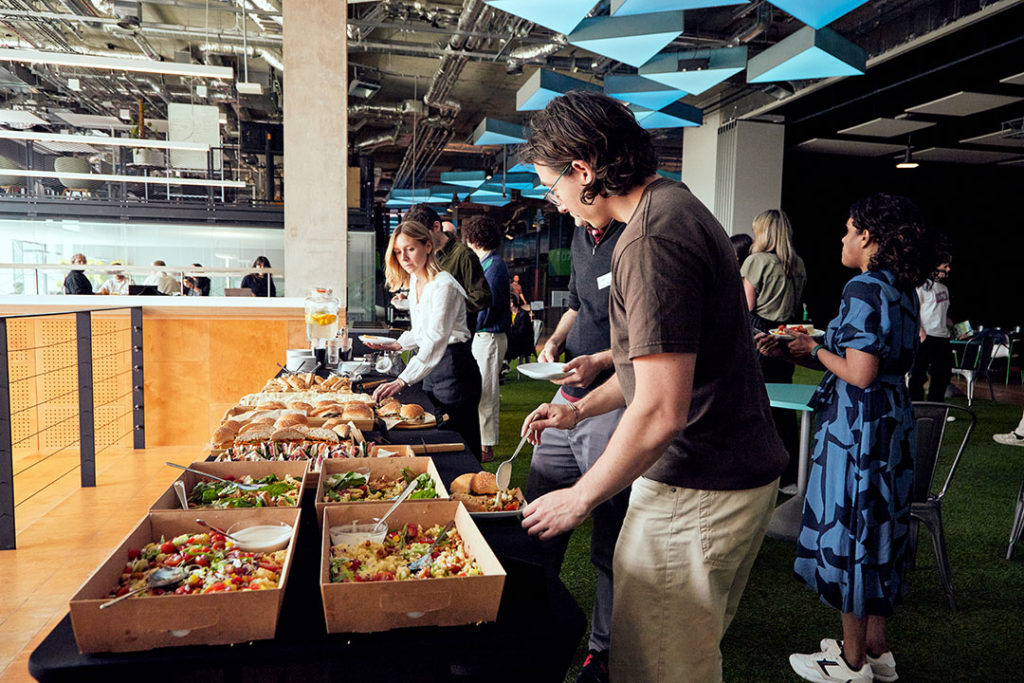
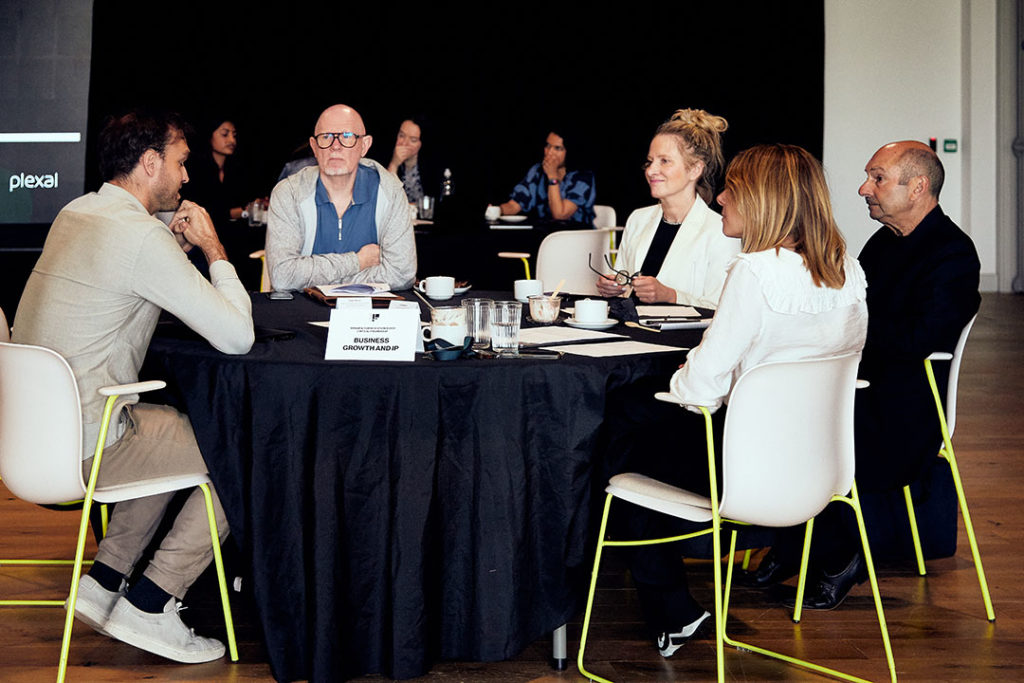
Fuelled by the high energy in the room, the day proved to be a resounding success, leaving our shortlisted businesses eagerly anticipating our upcoming event, the Development Day on 30th May. Closing the event, the startups were given the opportunity to offer feedback about their experience. Woody Lello, CEO of TRUSS, spoke on behalf of them all, saying, ‘It was a really fun day!’
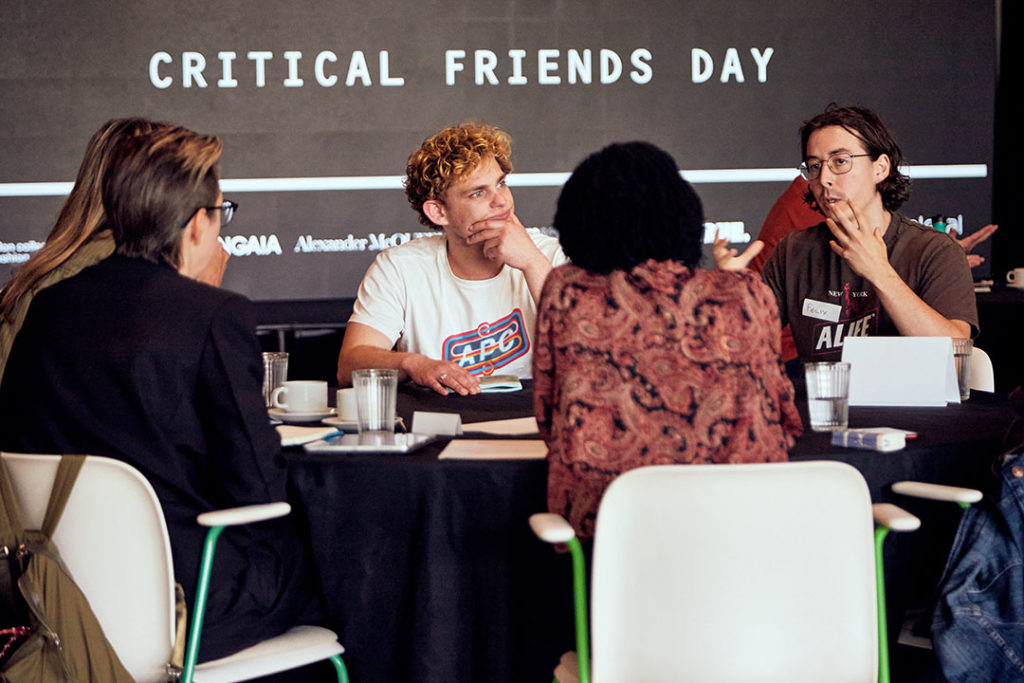
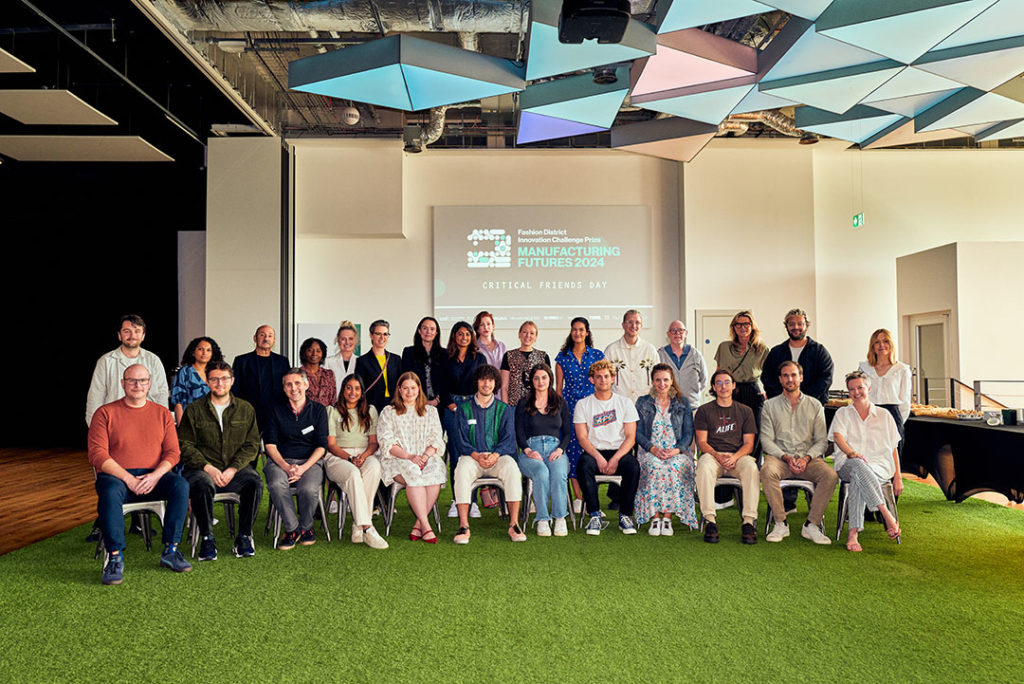
Stay up-to-date on the latest Manufacturing Futures 2024 news by following us on Instagram:
Evo Fashion Applications for Round Two Opened at Tech Talks
Last week, we hosted Evo Fashion: Tech Talks in collaboration with Evo Learning at The Trampery Fish Island Village.
Celebrating the launch of applications for the second round of Evo Fashion, specifically tailored to fashion technology businesses, attendees found out more about the programme and specialist facilitators, experienced rapid-fire talks on all things fashion tech, and connected with industry peers.
Kicking off the evening, we heard from leading industry experts as they discussed the latest trends and developments in fashion technology. From the dynamic intersections between technology and sustainability, to delving into the realms of digital and phygital fashion, read on to find out what went down at this jam-packed evening event.
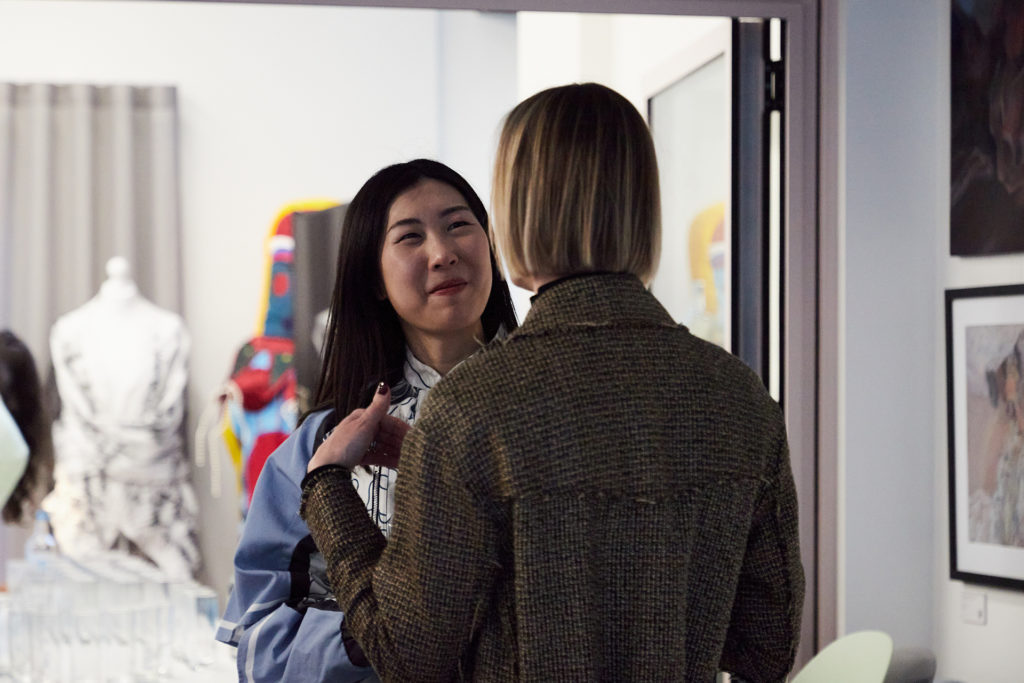
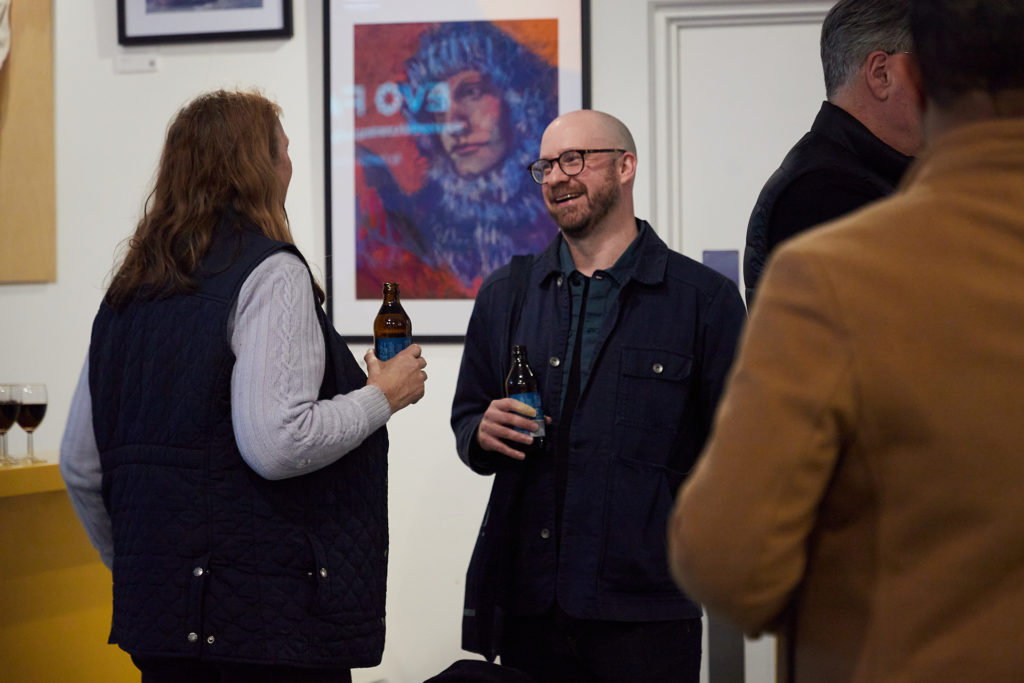
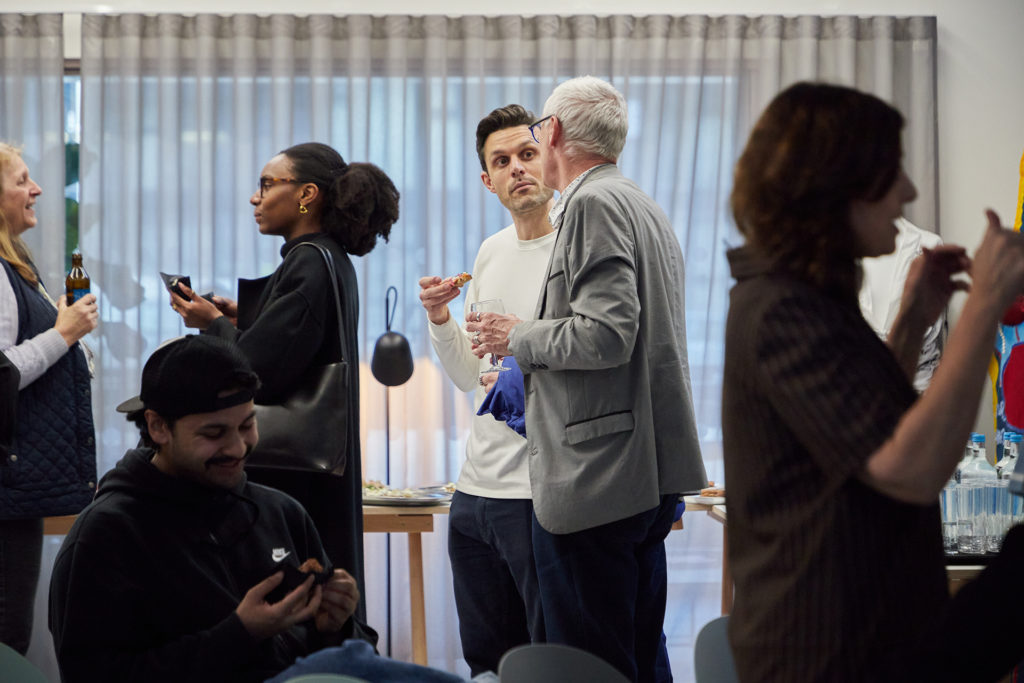
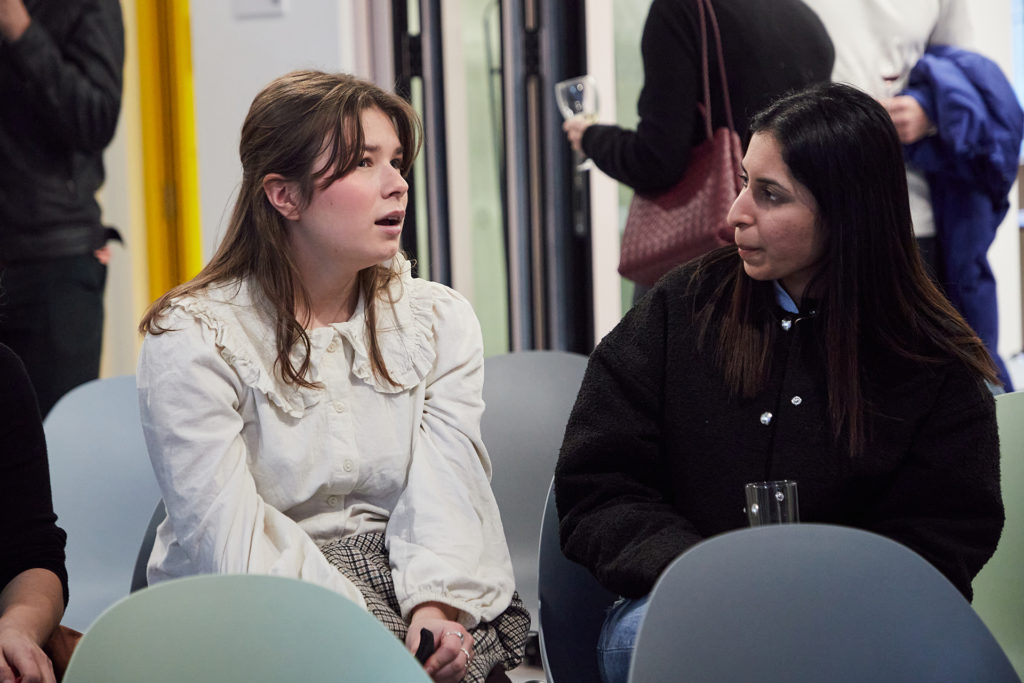
Fashion Tech Trends and Developments with The Fashion Innovation Agency
First up, Lisa Chatterton, Business Manager at Fashion Innovation Agency, took to the stage to present the latest trends in fashion tech with a focus on innovations that could support the transition towards a more sustainable fashion industry.
Speaking about the FIA’s latest work, Lisa dived into a range of topics including photogrammetry, digital humans, deepfake technology and generative AI. ‘You no longer have to fly a model up a mountain, you can do it all virtually,’ said Lisa. ‘By taking a digital asset into a virtual environment, one photoshoot can have endless possibilities.’
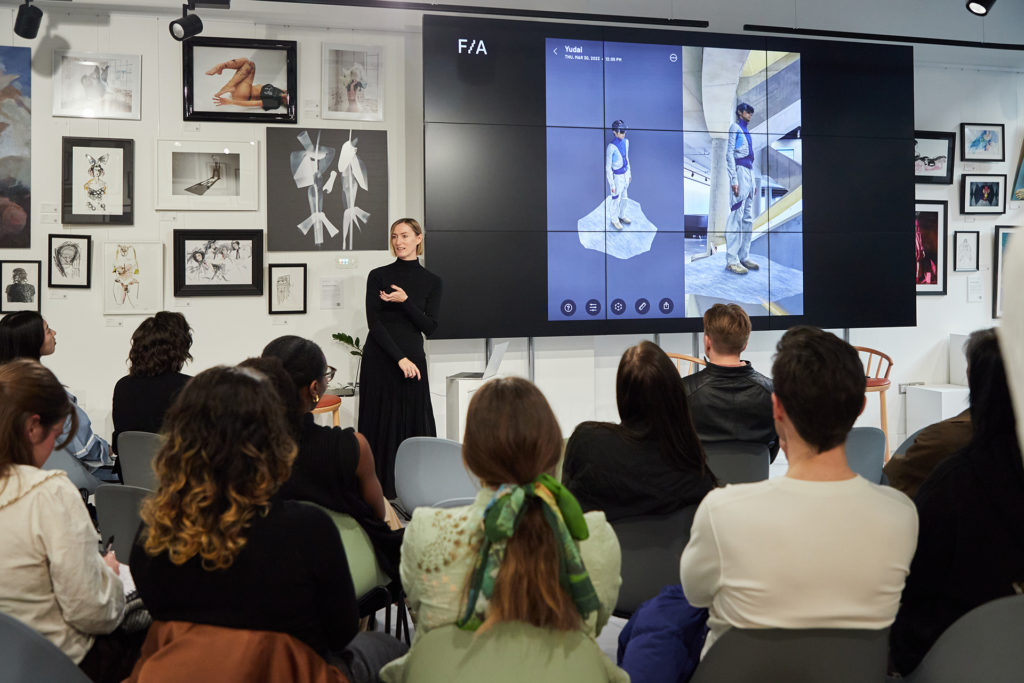
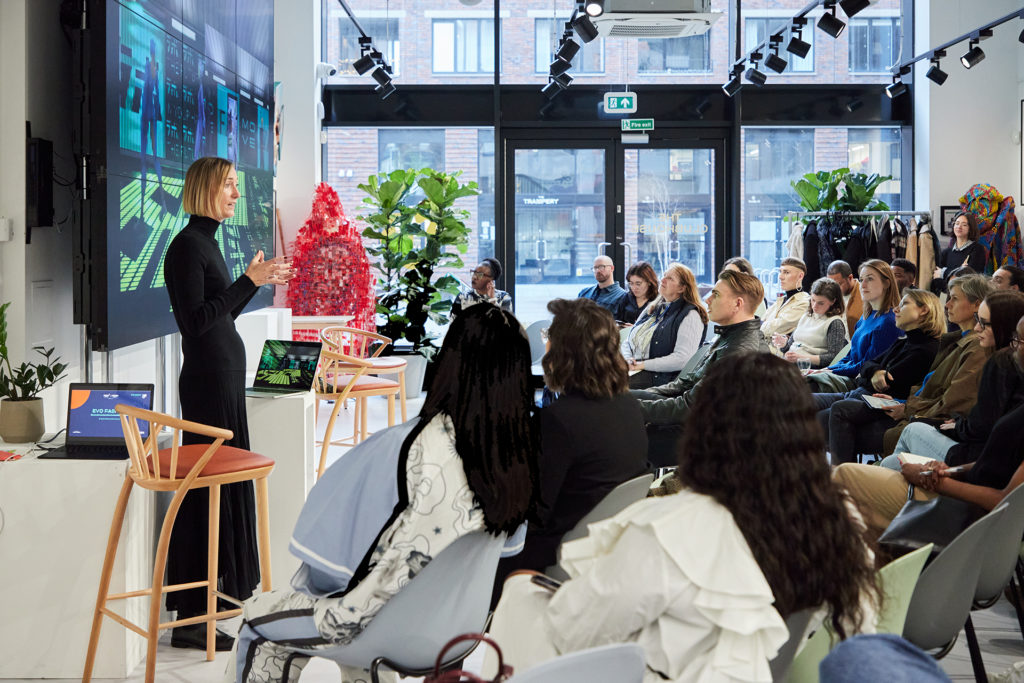
‘With digital fashion improving, exciting virtual experiences will be on the cards. This will lead to expansive fashion communication with potential for widespread impact. For example, moving beyond the walls of physical catwalk shows which are often limited to a certain number of people, designers can have real time AI generated catwalks which can be open to everyone.’
After her presentation, Lisa took questions from the audience. When asked to pick one area of technology that would be most useful for the future of the fashion industry, Lisa didn’t hesitate. ‘Generative AI is going to have the most impact,’ she told the audience. ‘As I’ve shown, it can be used as a creative tool and it can help behind the scenes. You can use it to be an expert consultant in a particular field, whereas previously you’d have to spend thousands of pounds to get that advice.’
‘I think people are nervous of AI because they don’t necessarily understand it and people think it will take their jobs. But at the same time, the genie’s out of the bottle now. If you don’t start getting your head around it and how you can deploy it within your business, you’ll get behind because everyone else will be catching up!’
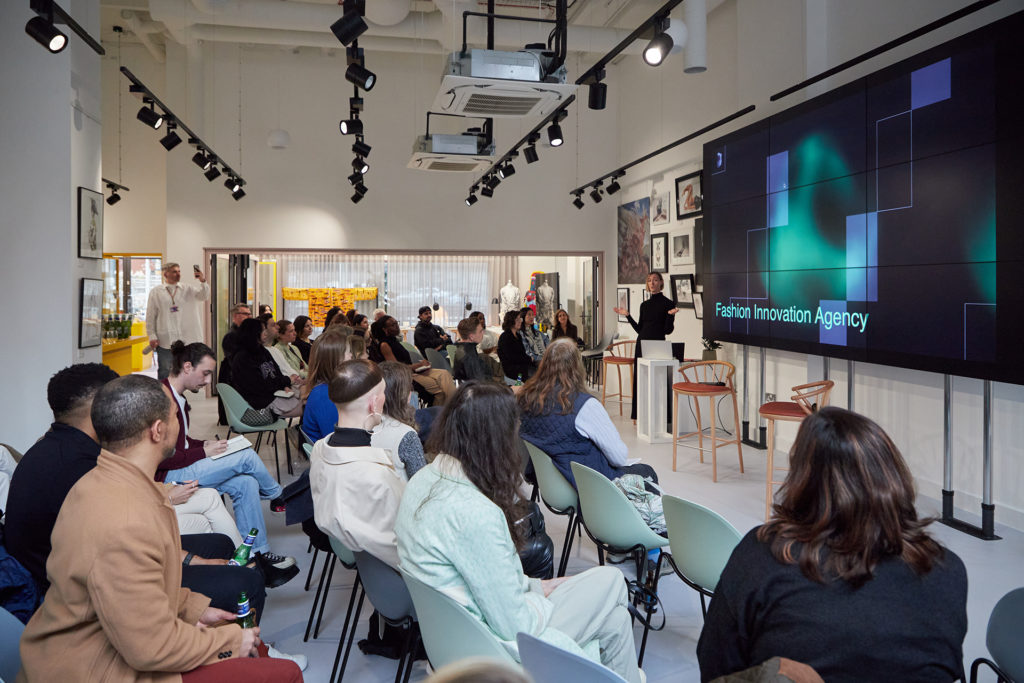
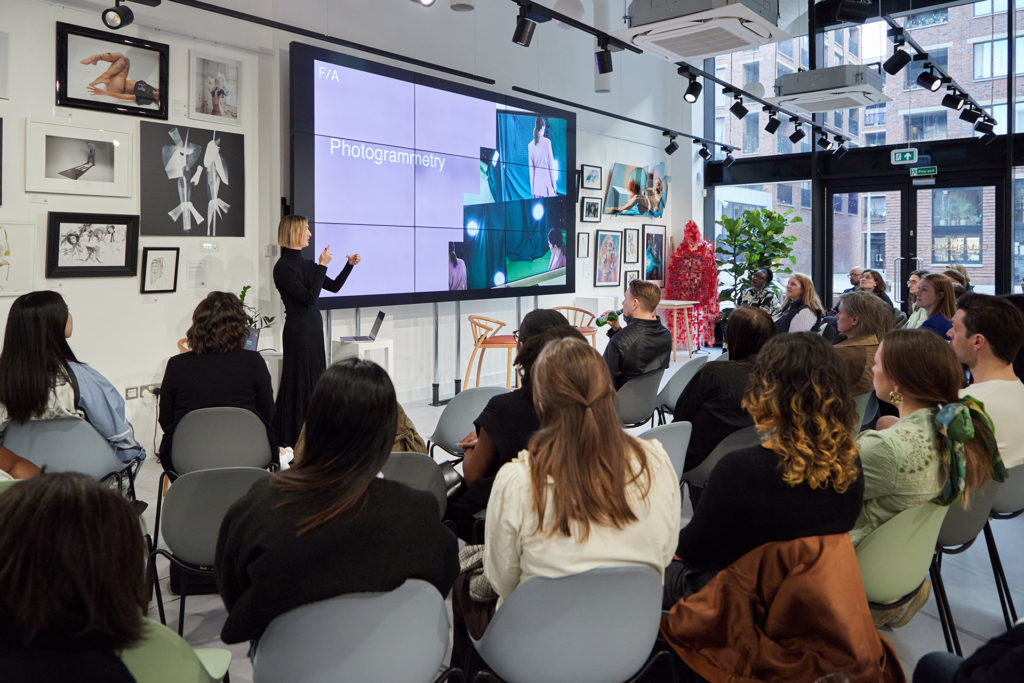
Phygital Fashion with Stephy Fung and Muchaneta Ten Napel
Next, Muchaneta Ten Napel, Founder of Shape Innovate, hosted a conversation with trailblazing digital artist Stephy Fung. Having just been included in Forbes 30 Under 30 list for Art and Culture, Stephy introduced herself by highlighting her USP: ‘digital first, physical second.’
Speaking about her background in graphic design, Stephy said, ‘I did not set out to become a fashion designer, but I took an interest in 3D and 3D animation. I have always naturally gravitated towards animation and storytelling. I think you can see that in my work. The clothes aren’t just garments. I like to put them in a scene and give them a ‘home.’ I love to tell a story.’
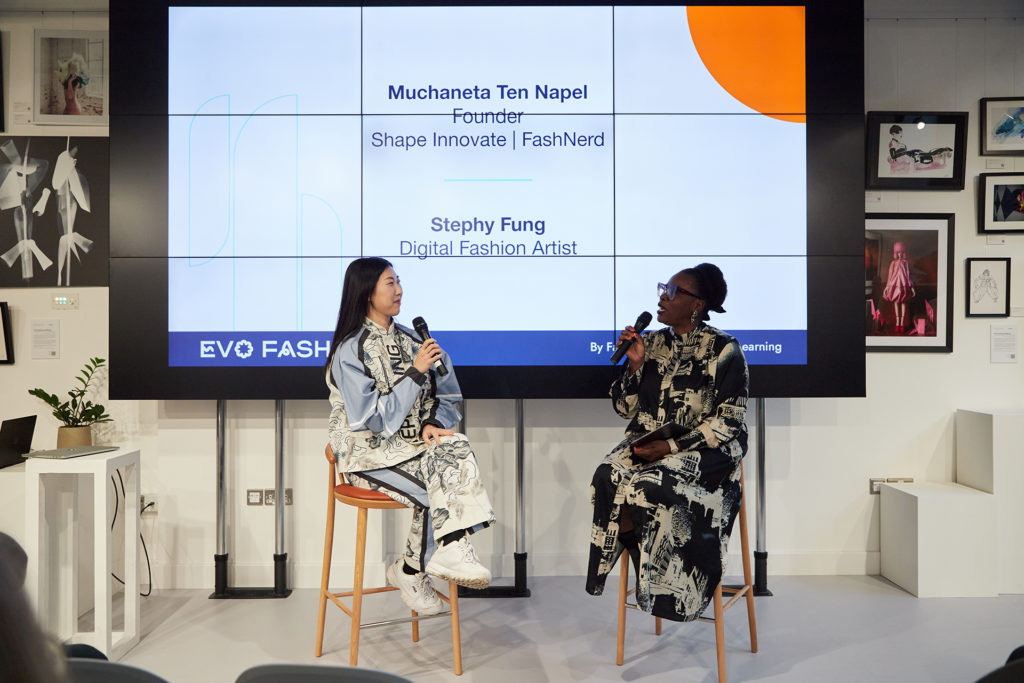
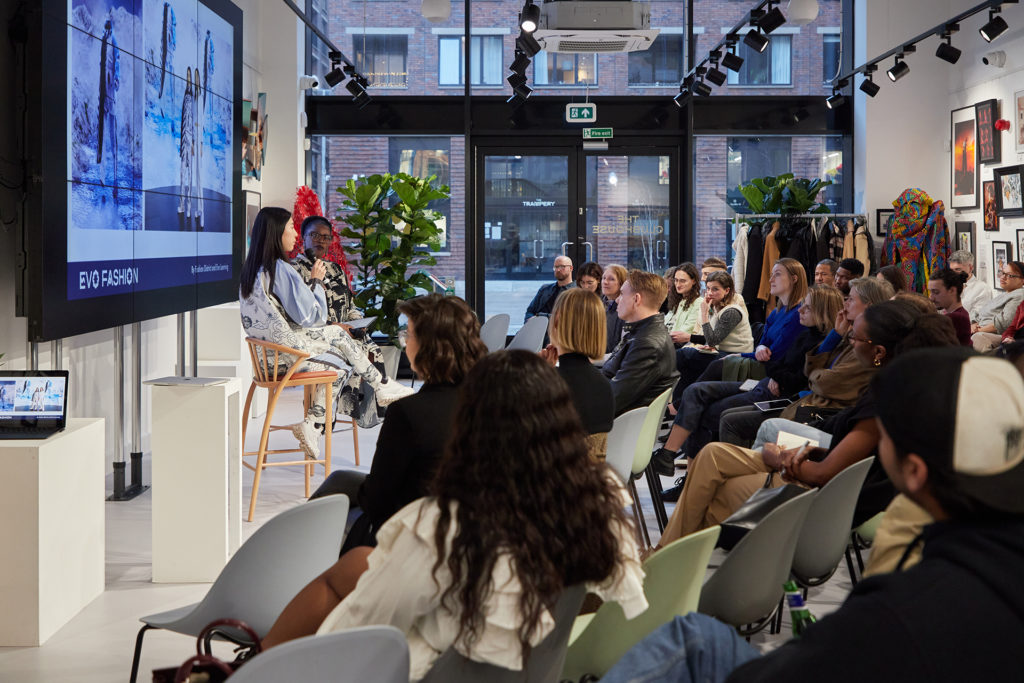
When asked by Muchaneta about challenges she’s faced in the industry, Stephy admitted she’s struggled with turning her 3D animations into physical designs. ‘I’m currently working with a company called Phygital Twin. They’ve got incredible fashion knowledge, from pattern-making to manufacturing connections. Because I don’t come from a fashion background, I need help to make my designs physical. The way I design on a programme might not necessarily work or be practical for physical production. That’s one thing that I’ve struggled with and I’ve had to learn along the way whilst working with Phygital Twin. Also, in my opinion, creating digital pieces will always be a lot cheaper compared to making physical ones, so that’s another challenge.’
In response to Muchaneta’s question about the link between digital fashion and sustainability, Stephy remarked, ‘I think a lot of brands will take on digital and replace some parts of their pipeline to speed up testing or use AI to conceptualise and visualise. Even with 3D avatars, you don’t need to get a model to come in, you can test online or change the cut, it’s a lot quicker and more efficient than the regular process.’
To wrap up the conversation, Muchaneta posed one last question. ‘What about companies who can’t afford to use digital technology, what would you recommend?’
‘There are a lot of free AI programmes out there that you can test out,’ answered Stephy. ‘Before you pay for anything, look for free programmes first and make sure to use all the free trials they offer!’
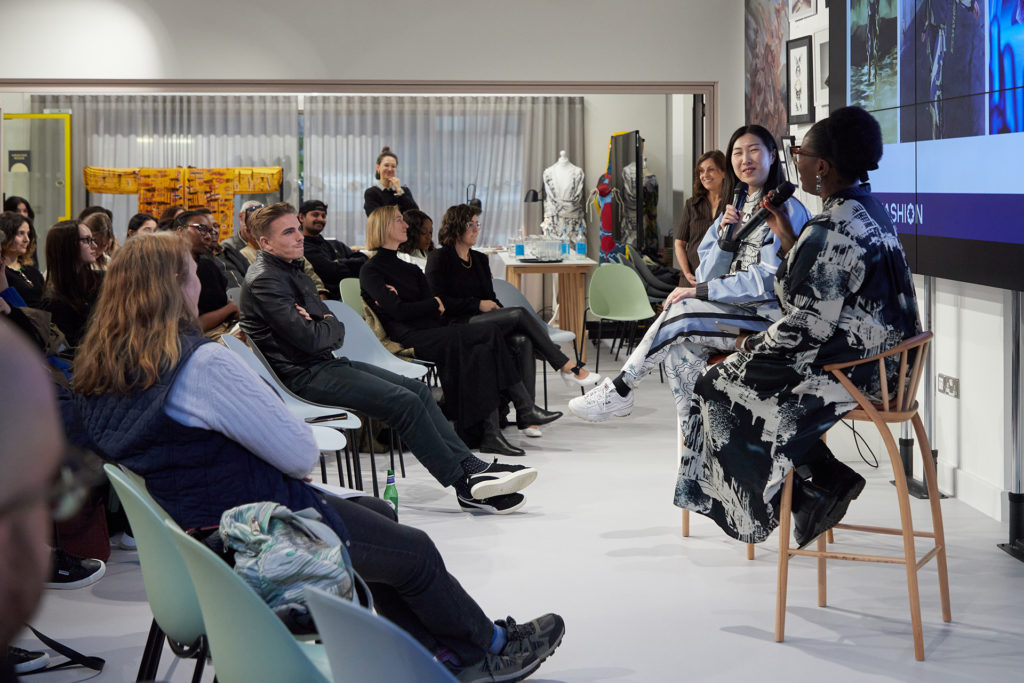
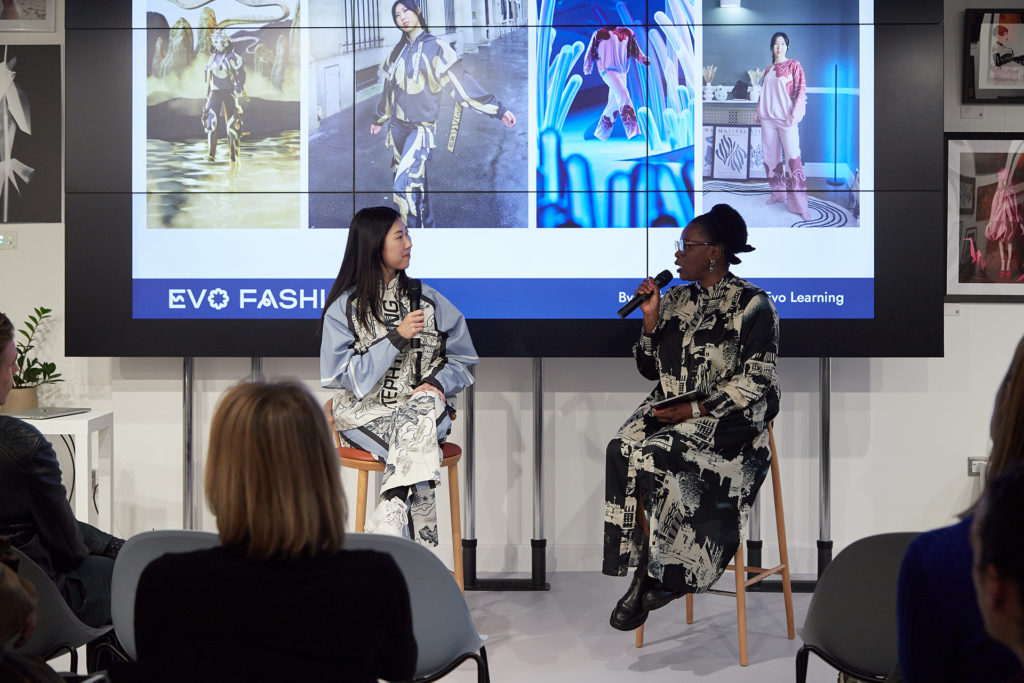
Manufacturing Tech with Shana Chu and Muchaneta Ten Napel
After a quick interval where attendees tucked into delectable canapes and grabbed a drink at the free bar, we were back for another conversation hosted by Muchaneta Ten Napel with Shana Chu, Founder of Tailr, who hopes to redefine garment production by using AI technology.
Having worked as a brand technologist for a number of years, Shana saw first-hand how disconnected brands were from their supply chains. ‘A lot of things get lost in translation,’ said Shana, ‘which is where I got the idea for my business.’
‘Essentially, we digitise the nuances of how the fabric is actually created. We get down to the yarn, the composition, the finishing, the spinning, the weaving, the make of the machine, the tension, the density of the yarn. We even look at where the yarn came from – for example, how was the cotton grown? How was the season? Are things consistent from last season? How is all of that going to affect production for the brand?’
‘Ultimately we aim to reduce waste by making sure nothing goes wrong. Did you know, on average, 20% of production comes in wrong for brands? That 20% is often shipped to landfill. Our goal is to remove that element and we will do that by ensuring that things are perfect at factory level.’
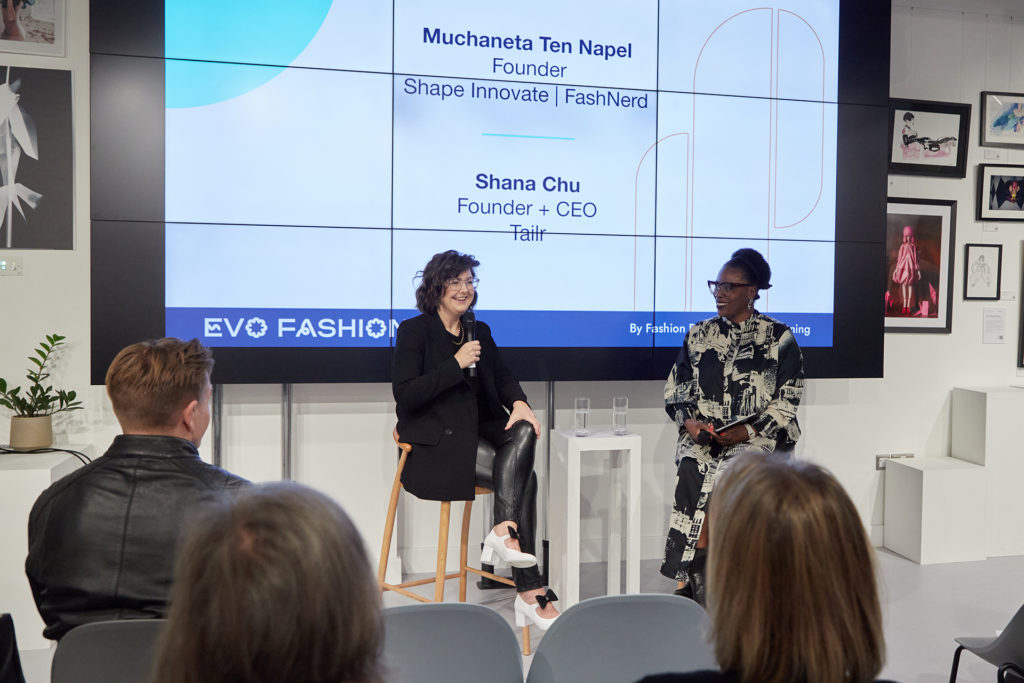
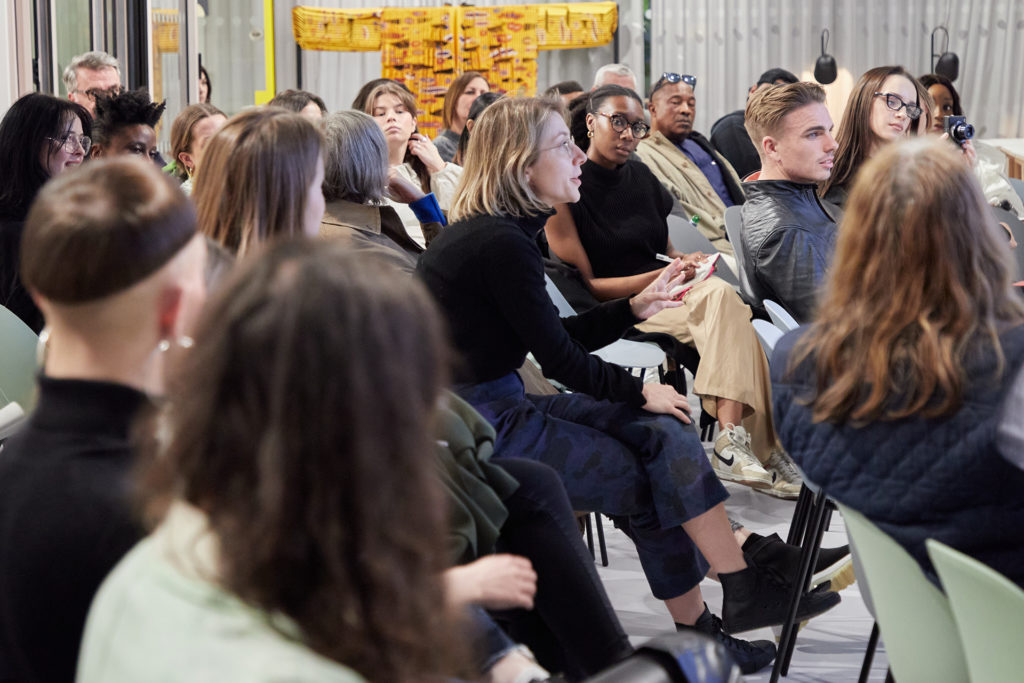
Offering advice for emerging brands and startups, Shana said, ‘Don’t be bullied when you know what’s best for your company. It’s important that you have the guts to say no, I don’t want to do it that way. When you’re starting out, you try to listen to all the advice people want to give you, but it can be overwhelming. Listen to what resonates with you.’
When asked by Muchaneta about emotional challenges she faced, such as imposter syndrome, Shana responded candidly, saying, ‘You know that saying ‘fake it til you make it’? It did help. Sometimes I do have to pretend that I’m super confident. But what I’ve learnt along the way is this: don’t be shy of your vision, don’t be afraid to be ambitious, and don’t be afraid to sell what you want. If AI has done anything, it’s shown us that those big visions are absolutely possible.’
From securing £700,000 as a sole female founder, to assembling a team of eight people and presently raising £5 million, Shana’s insight on funding was invaluable. ‘Before you get to the investor stage, try to take part in competitions. I won the best new startup company in Ireland and I got £50,000. I got that to build my MVP. You don’t necessarily need to go straight to investors to get funding. There are a lot of opportunities out there.’
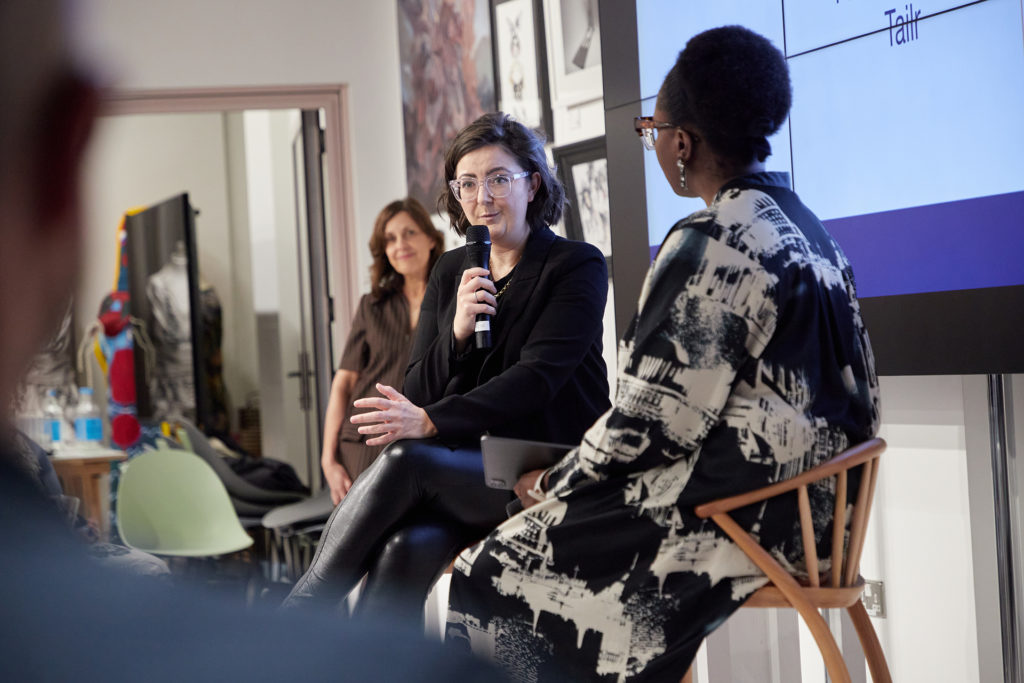
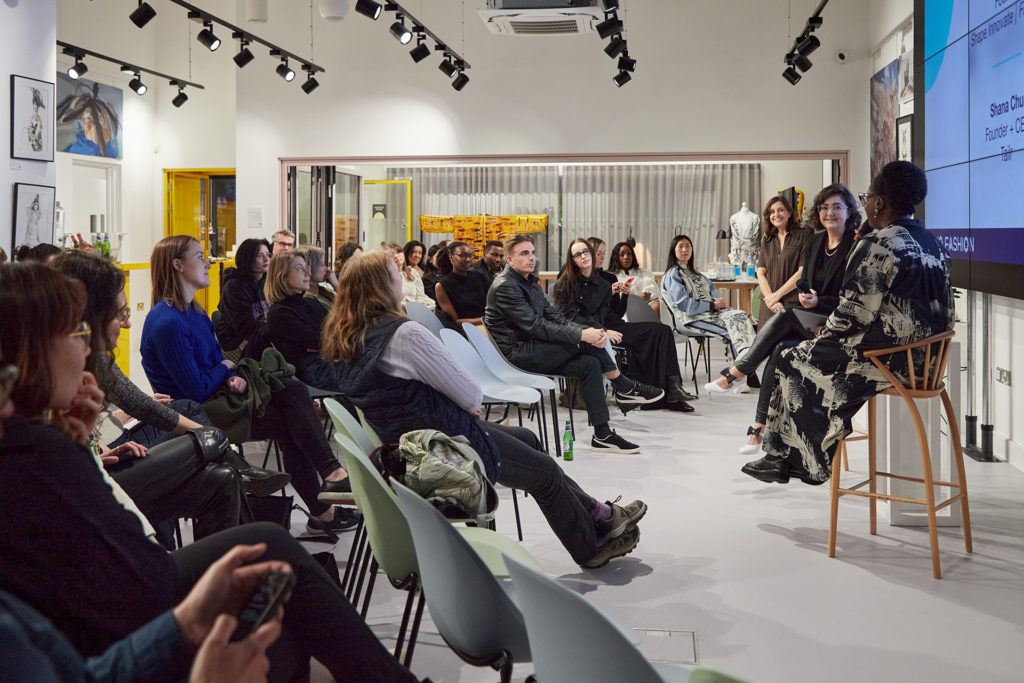
Introduction to Evo Fashion for Fashion Tech Businesses
To conclude the evening, Helen Lax, Director of Fashion District, took to the stage to present a comprehensive overview of the Evo Fashion programme.
Designed to fit in with work commitments and delivered by experts, the fully-funded five-month programme consists of a two-day intensive launchpad and four full-day masterclasses which will focus on different aspects of learning, including environmental and ethical practice, business and financial planning, marketing and storytelling, founder wellbeing, sustainable growth and much more.
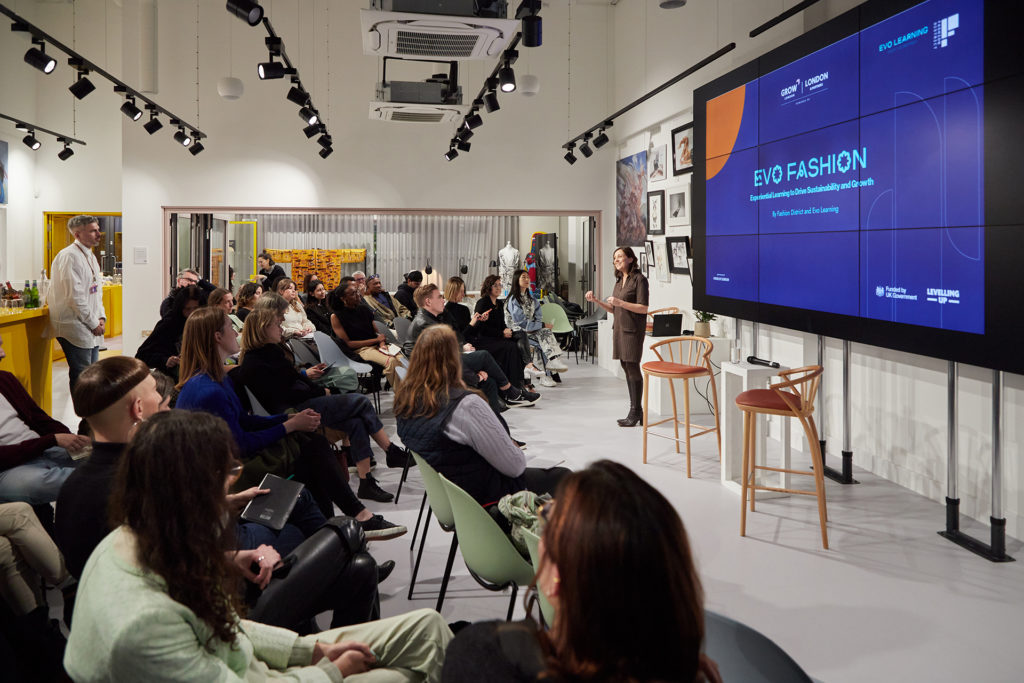
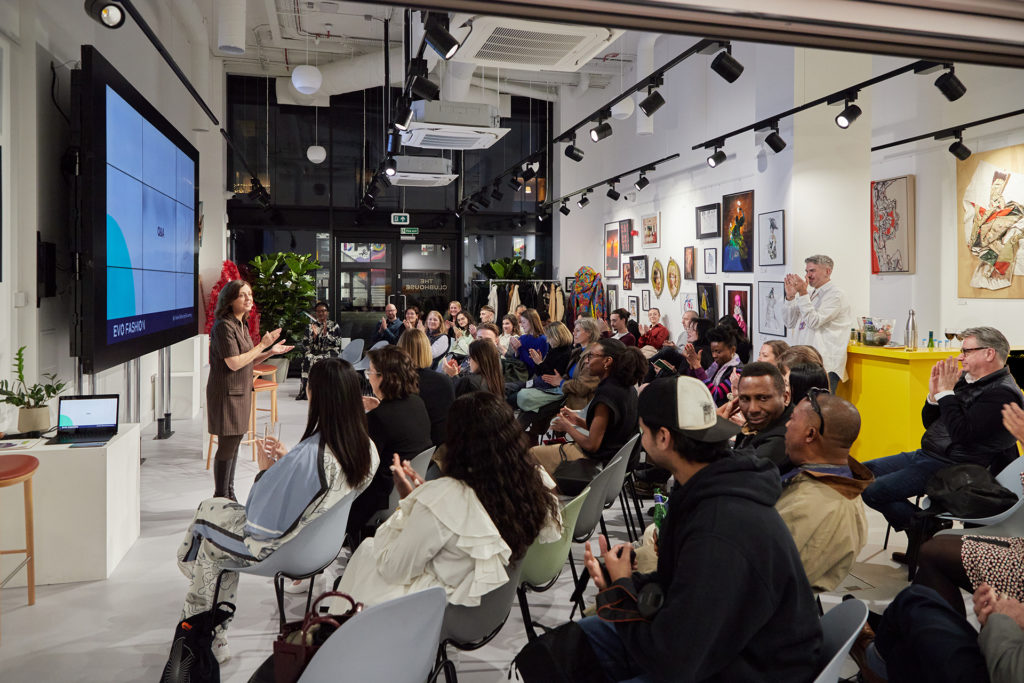
‘Peppered in amongst the sessions and masterclasses,’ Helen told the audience, ‘there will also be panels and talks, a 1-2-1 business diagnostic, three peer-to-peer learning workshops, a creative photoshoot, and the chance to present your brand at an industry showcase.’
‘To be eligible you must be a registered business based in London. You must employ 2-5 people and you must have been trading for 18 months,’ said Helen. ‘You must also have turnover or investment of a minimum of £50k in the last financial year. If you’re unsure about whether you’re eligible, please get in touch with the Fashion District team.’
With an incredible selection panel for the second cohort, including Brooke Roberts-Islam, Founder of Techstyler; Tom Adeyoola, Entrepreneur, Investor and Advisor; Lisa Chatterton, Business Manager, Fashion Innovation Agency; Charles Armstrong, CEO of The Trampery, and Helen Lax, Director of Fashion District, applications are now open and will close at midnight on 3rd June 2024.
Find out more and apply for the second round of Evo Fashion now via the button below.
Got a question? Please get in touch with us at fashion@evolearning.co with any queries about the programme, content, facilitators, application form, and eligibility.
Want to stay informed about the latest developments in the Evo Fashion programme? Subscribe to the Evo Fashion newsletter:

Inside the Launch of Manufacturing Futures 2024
Last week we celebrated the launch of Manufacturing Futures 2024 at a sold-out event at The Trampery.
Marking Fashion District’s sixth innovation challenge, this year the focus is on technological innovations and sustainable solutions that are solving any of the complex fashion manufacturing challenges facing the industry. Helen Lax, Director of Fashion District, described the event as a gathering of individuals that share ‘the same ethos, values and ideas for the future of fashion and sustainability.’
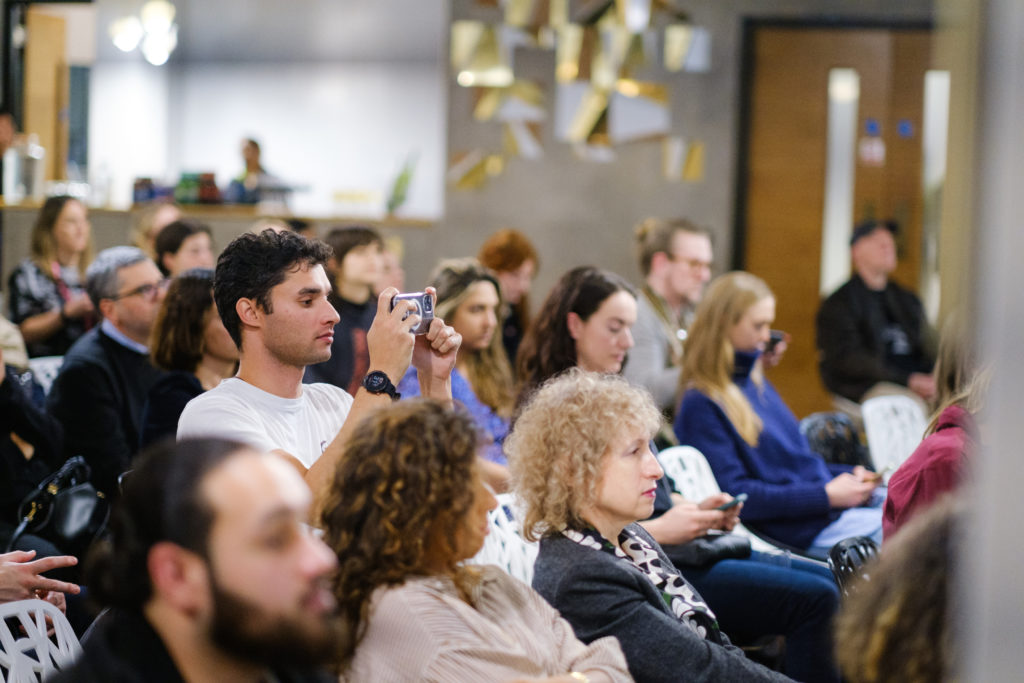
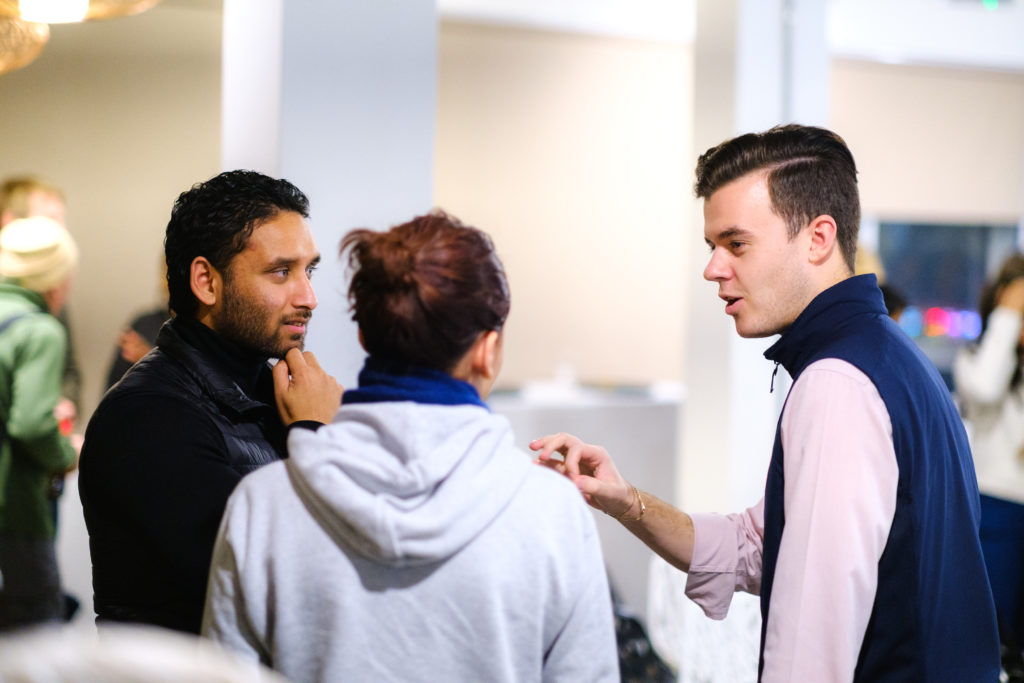
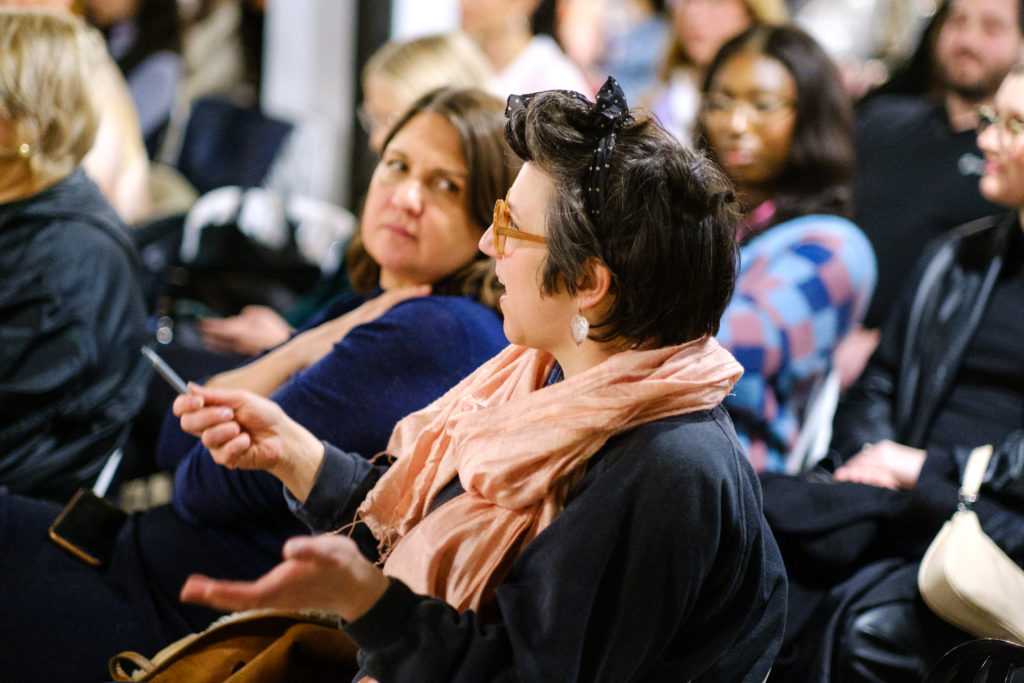
GANNI: Fabrics of the Future
Kicking off the event was keynote speaker Lauren Bartley, Chief Sustainability Officer at GANNI, who gave insight into GANNI’s strategy and how they work with innovation. ‘GANNI has a very very ambitious goal to reduce its carbon emissions by 50% by 2027,’ Lauren said. ‘The materials we use account for 50% of our carbon impact, making this our primary window of opportunity. It’s also where Ganni should focus as materials represent one of our most significant decarbonisation levers.’
Lauren also highlighted GANNI’s Fabrics of the Future initiative. ‘Fabrics of the Future is an internal research and development hub that scans the market for fabrics that will change the industry. At this point we’re working with thirty different material creators that have solutions or new innovations for materials. By 2025 the goal is that 10% of our materials should be coming from fabrics of the future.’
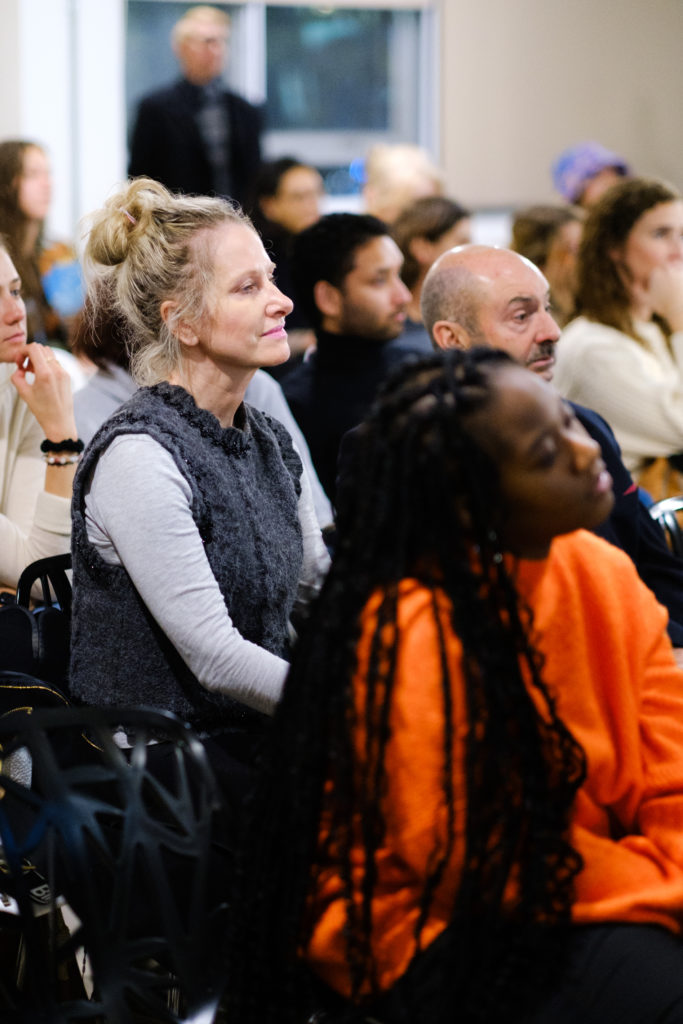
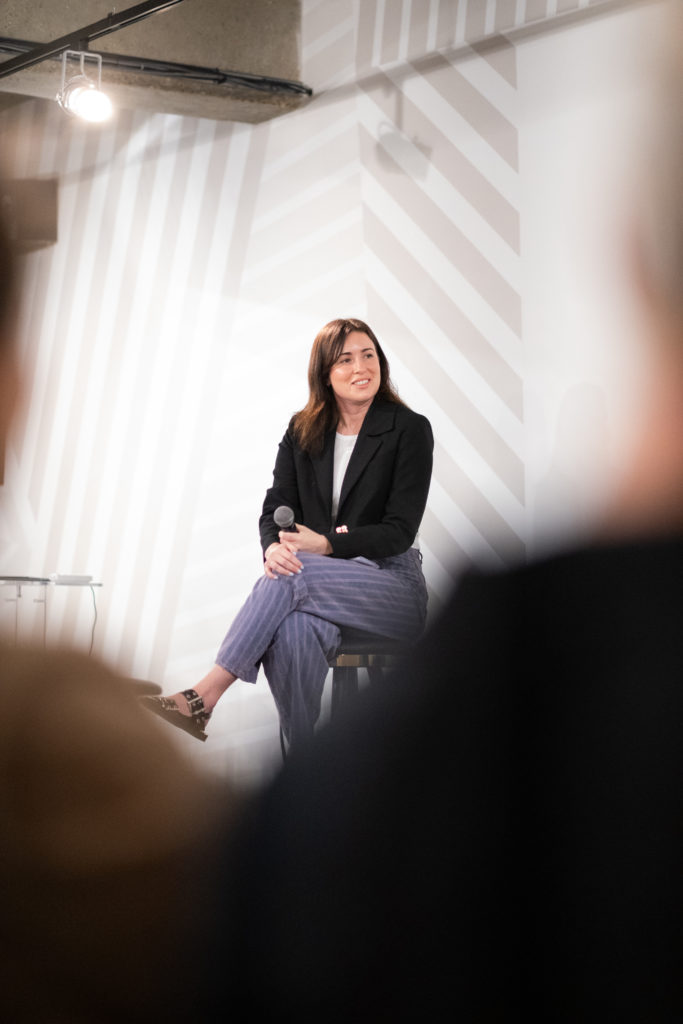
The Need for Partnership: Modern Synthesis x GANNI
One of the material creators GANNI have collaborated with is London-based biotech company Modern Synthesis. Lauren invited Jen Keane, CEO of Modern Synthesis, on stage to discuss their recent partnership.
Having developed a new class of biomaterials, Modern Synthesis works with bacteria to produce a type of non-woven textile that can be used to displace materials like leather, and in the future replace a wide variety of coated textiles. Modern Synthesis partnered with GANNI to reimagine their staple Bou Bag in their new innovative bacterial nanocellulose material. The handbag was unveiled at the London Design Festival 2023.
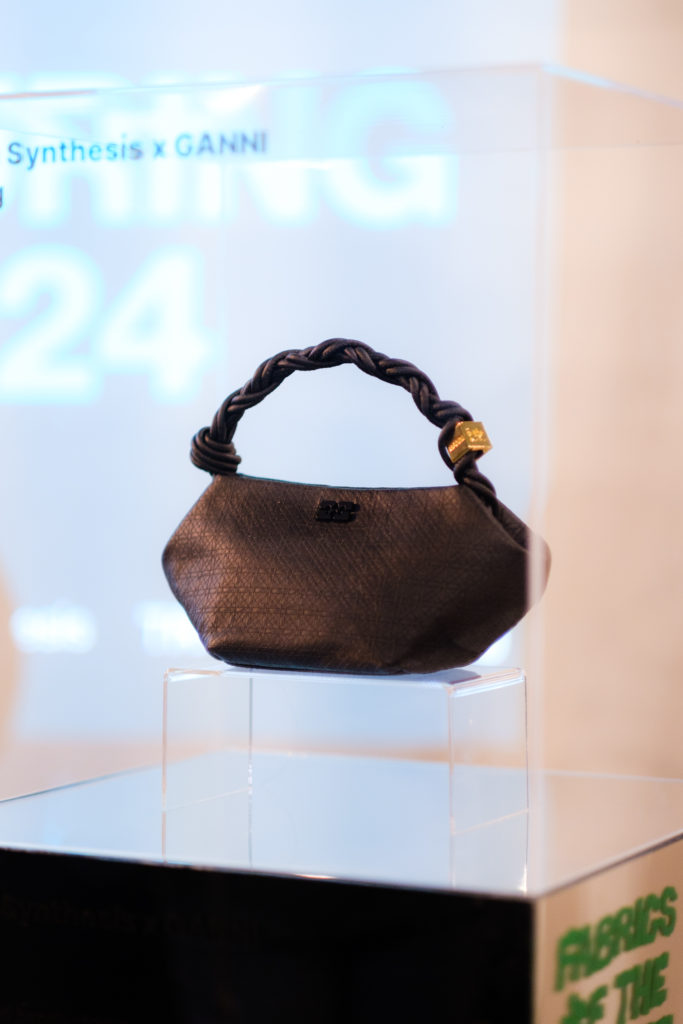
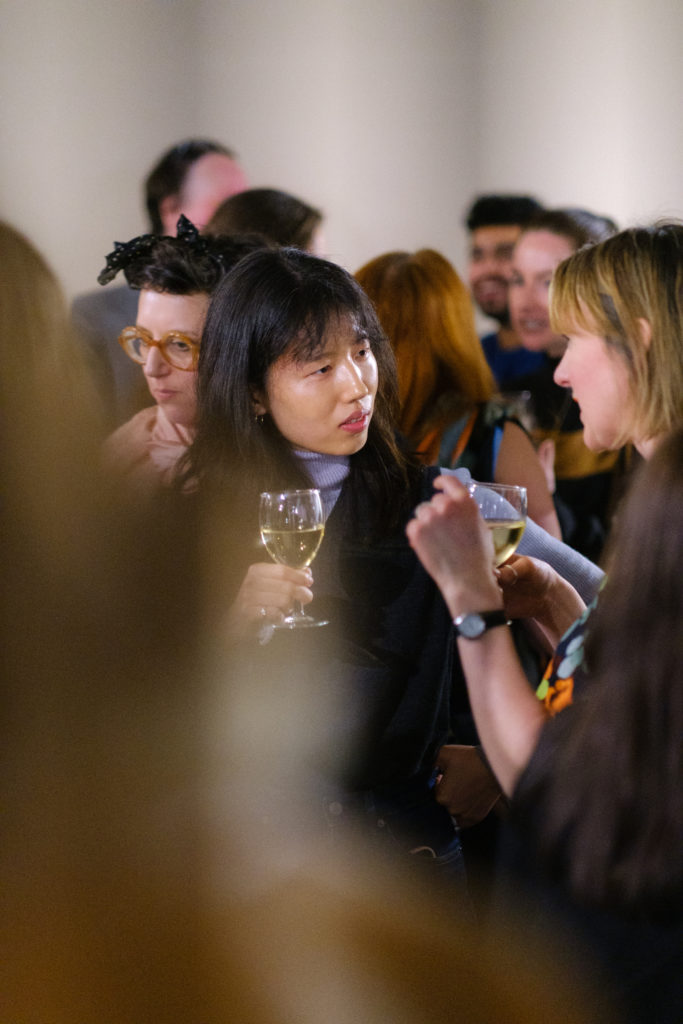
Explaining why Modern Synthesis reached out to GANNI to propose a potential collaboration, Jen said, ‘As a startup that makes materials, we can’t do it all. We need to actually make the impact that we want to drive and so we have to get it into a product. We need brands and partners across the whole supply chain to make that possible. We contacted GANNI because they have such a strong perspective in this space and actually take action. Very few brands have innovation departments.’
Lauren rounded up the conversation by saying: ‘I hope that what you’ll take away from our talk today is that GANNI relies heavily on innovations like Modern Synthesis to meet our sustainability goals, and vice versa. Jen needs brands like GANNI to secure investment and effectively implement these technologies. It’s important not to underestimate the value of partnership.’’
Offering one final tip to the audience Jen said, ‘Don’t give up! It’s hard but we’re gonna get there. My biggest advice is to collaborate as much as possible. You can’t do everything yourself. Figure out what you’re good at, what you’re not good at, and find friends to do the things you’re not good at.’
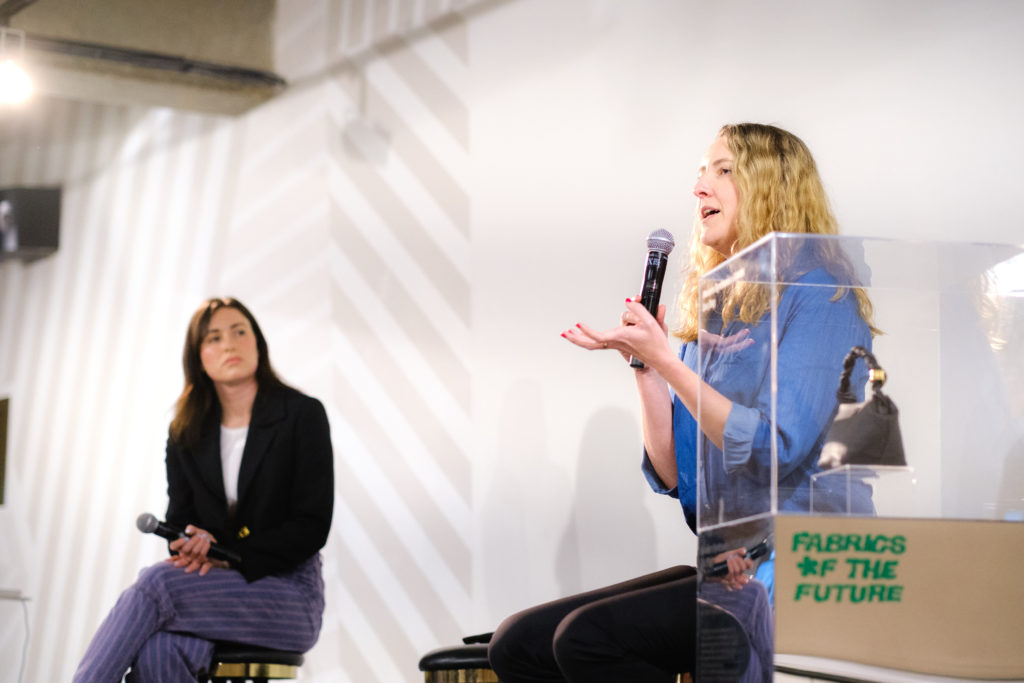
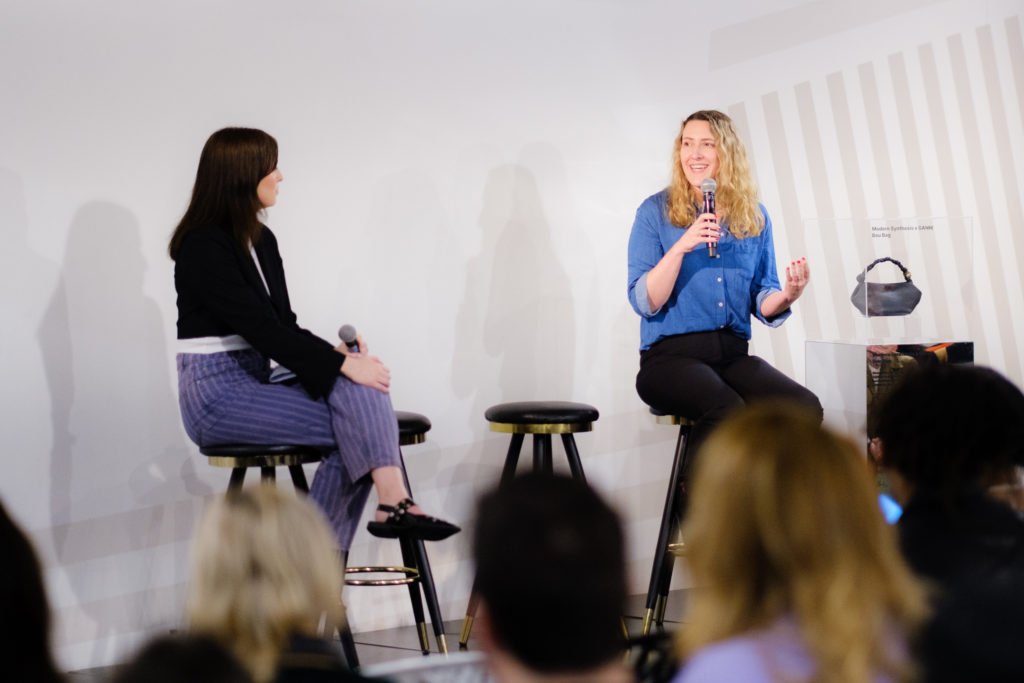
Introduction to Manufacturing Futures 2024
Helen Lax then took to the stage to introduce this year’s innovation challenge, Manufacturing Futures 2024. ‘This year, we’re seeking innovative ideas, businesses, and startups that can benefit the fashion industry by offering sustainable solutions for various aspects of the supply chain.’
To be eligible for the challenge, applicants must have a tech-based solution, be a registered business, and either be operating in the UK or have plans to pilot or operate in the UK. The winner will take home £15,000, as well as receiving business support from PANGAIA, one-year complimentary UKFT membership, one-year workspace membership at The Trampery and one-year platform membership from Common Objective. The runners-up will receive £5,000 each, one-year UKFT membership and one-year platform membership from Common Objective.
Finalists will attend a one-day event in May where high-level industry professionals will act as ‘critical friends’ to support and challenge their business proposition, and provide constructive feedback; as well as two Development Days focused around production and investment. Finalists will also be invited to join the celebratory Fashion District Innovation Awards and Investment Supper in July, attended by influential members of the fashion, tech and investment industry.
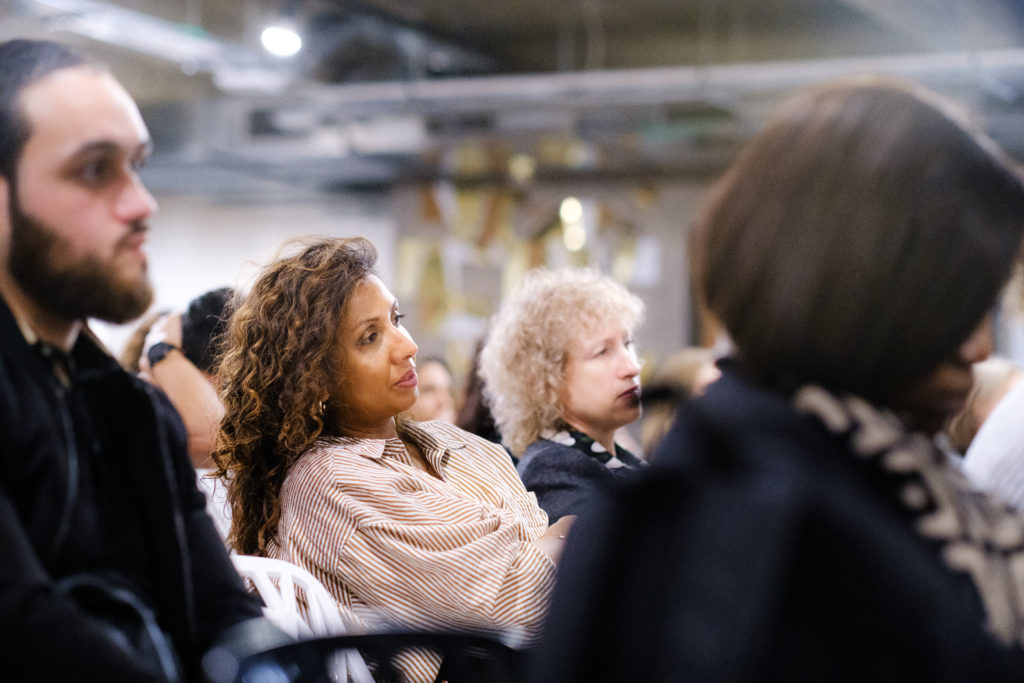
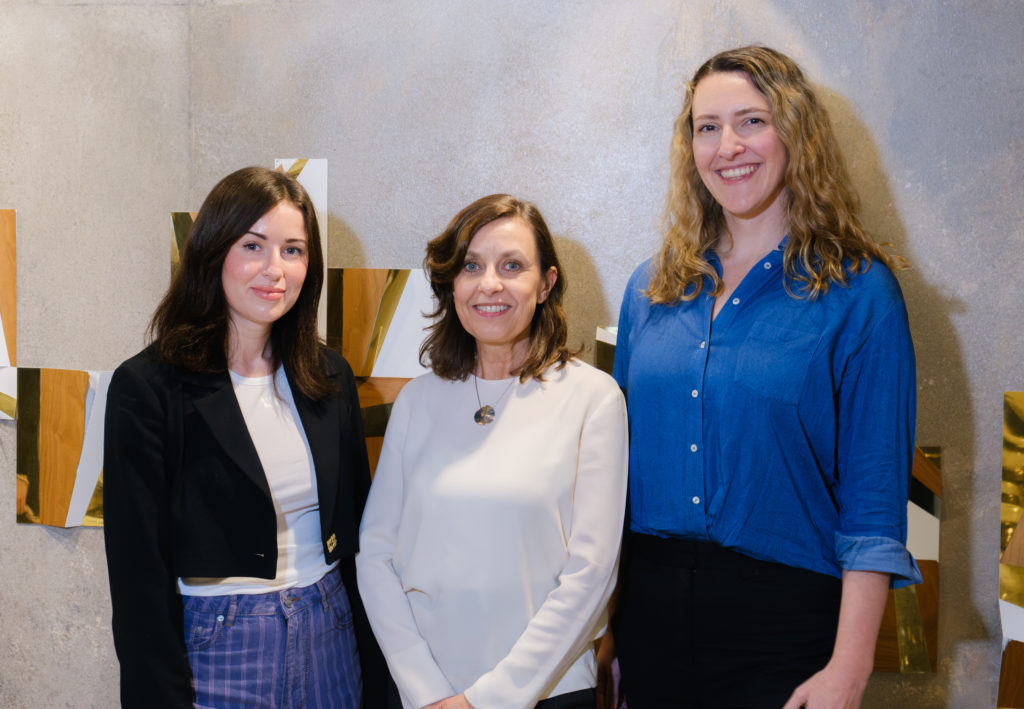
Meet The Judges
After running through the details of this year’s manufacturing challenge, it was time to hear from our incredible judging panel: Chelsea Franklin, Head of Advanced Concept Design, PANGAIA; Adam Mansell, CEO, UKFT; Gillian Lipton, Head of Sustainability, Alexander McQueen; Ella Gould, Head of Circularity and Innovation, Selfridges, and Matthew Drinkwater, Head of Fashion Innovation Agency, UAL: London College of Fashion.
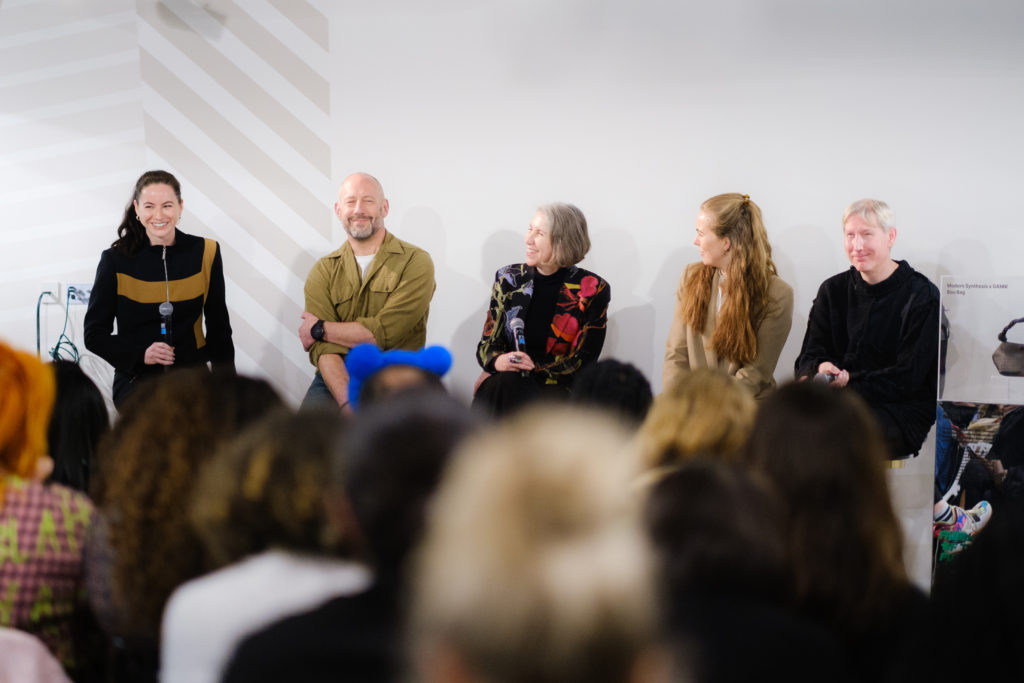
Discussing their criteria for the challenge, Matthew Drinkwater said, ‘Above all, I want to feel excitement for an application that I’m reading. It’s that magical moment…you want to transform the innovation into a real thing.’
Ella Gould added, ‘I’m always sceptical when someone comes to me with big tech and they only talk about the technology. Come to me with a problem, tell me the problem that you’re solving or why you’re doing something better. That for me is when the juices start flowing and I get really inspired.’
Gillian Lipton stressed the importance of time. ‘For me it’s all about finding a solution that is scalable, but also that I don’t have to wait too long for. I’m aware that things take time, in terms of innovation and new materials, but we don’t have time!’
Adam Mansell stated the biggest problem for him was volume. ‘I love new materials, new materials are fantastic, but if someone came up with a concept that would allow us to take all the cotton, polyester, and wool that we use, capture it, recycle it, get it manufactured in the UK, that gets my vote. You’d get lifetime membership to UKFT if you can solve that! But genuinely that’s where the problem is. That’s where the focus really needs to be.’
Chelsea Franklin urged applicants to consider the customer. ‘Functionality is obviously very important in terms of innovation performance, but also understanding how to convince a consumer to buy something, such as an alternative fabric – why? If the price is so much more significant, why should they purchase it? How do you tell that story? Build that narrative?’
The event concluded with key advice from the judges. Matthew Drinkwater advised applicants to think about clarity of message. ‘What problem are you solving? Answer all of those questions fully and critically, and you stand a really good chance of getting through.’
Chelsea Franklin echoed this. ‘Articulating your vision is a skill in itself. We want to know what problem you’re solving, problem solution framing, and why we should care. If you can answer that clearly and visually that’s my top tip.’
‘Don’t bring me something that’s been done five years ago,’ Adam said. ‘Do your homework. Do proper market research. Also read the application questions carefully and answer them clearly. Look at the finances bit, because it’s really important that you’re thinking beyond the initial. Think about what the future looks like, and don’t tell me that you’re going to be a billion pound turnover company in five years time. It’s hard work. It takes a lot of effort and collaboration and that should not be why you’re in this space, you should be in this space to solve a problem.’
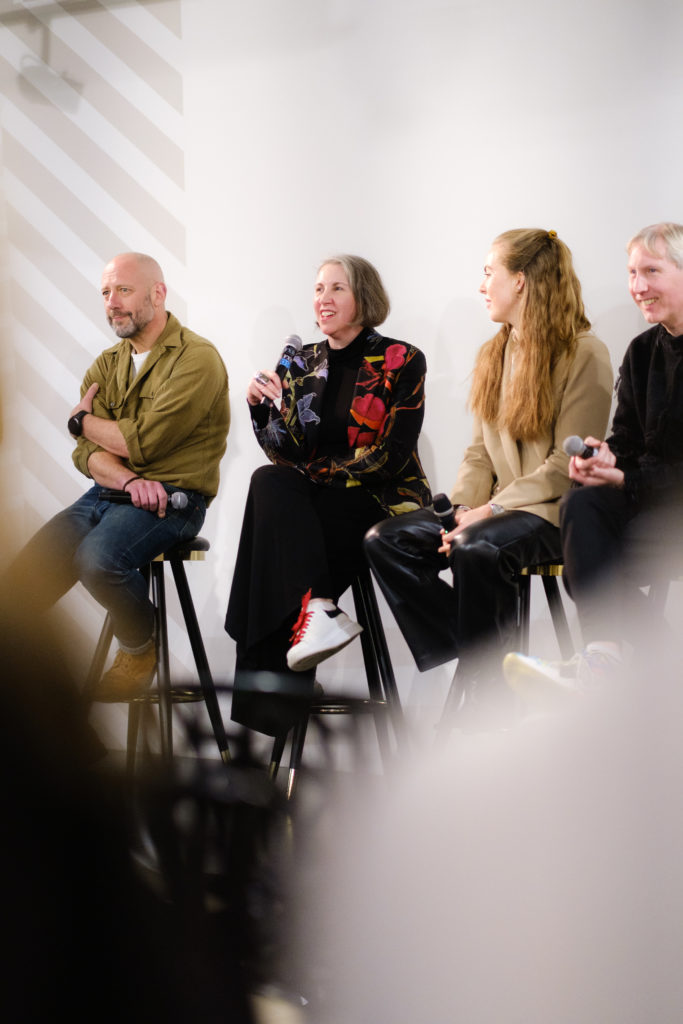
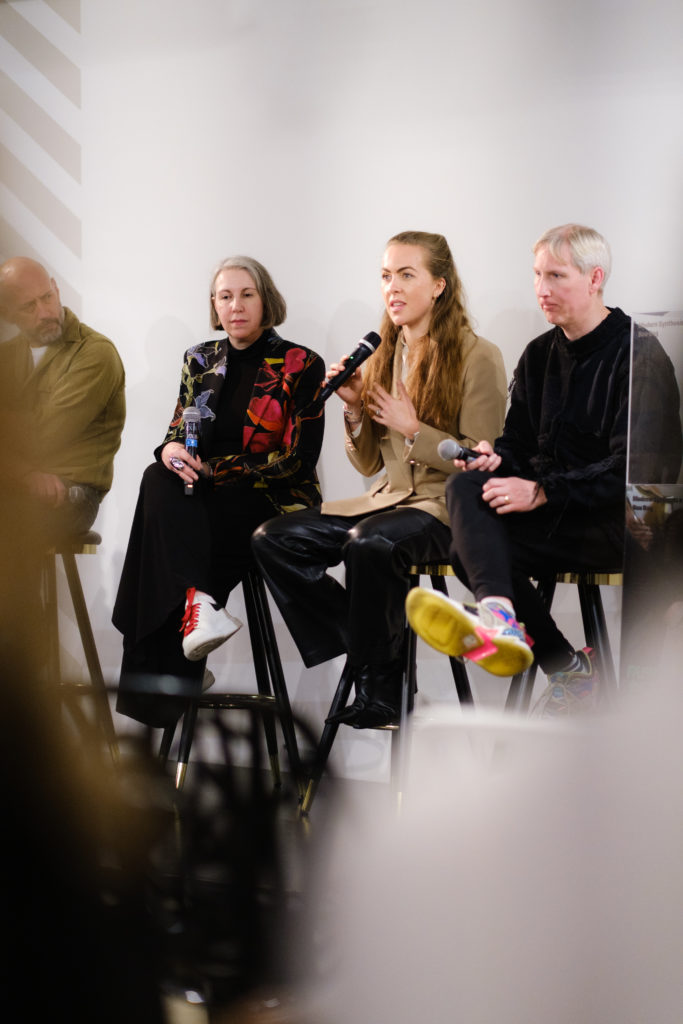
Do you think you’ve got what it takes to manufacture a new sustainable solution? Want to be in with a chance of winning £15,000? Applications for Manufacturing Futures 2024 are now open!
Follow us on Instagram, LinkedIn, Facebook and Twitter to stay update-to-date on our latest events and opportunities:
- Instagram: @fd_ldn
- LinkedIn: Fashion District – London
- Facebook: Fashion District London
- Twitter: @fd_ldn

Come to the launch of our new Innovation Challenge: Manufacturing Futures 2024
Thursday 8 Feb | 18:00 – 20:30
The Ballroom, The Trampery, 239 Old Street, London, EC1V 9EY
We’re delighted to announce the launch of our next innovation challenge Manufacturing Futures 2024, hosted in partnership with The Trampery, a purpose-led enterprise providing workspace, training and management for London’s trailblazing businesses. Join us on 8th February to find out more about next year’s challenge, hear from leading figures in fashion sustainability, and network with London’s fashion, tech and innovation communities.
To help us launch the challenge, we’ll be hearing from Lauren Bartley, Chief Sustainability Officer at GANNI and Jen Keane, CEO of Modern Synthesis, one of our Manufacturing Futures 2021 winners. Lauren will present a keynote on embedding innovative sustainable solutions into a large brand, followed by a discussion with Jen about how the GANNI x Modern Synthesis partnership came about.
Afterwards, we’ll launch next year’s challenge brief, followed by a ‘meet the judges’ panel, where attendees will get the opportunity to learn more about our judges and find out their criteria for selecting the winners. The evening will conclude with networking, drinks and nibbles.
Agenda:
- 6:00pm – Drinks and canapés
- 6:30pm – Welcome and intro by Helen Lax, Director of Fashion District
- 6:35pm – Keynote speech with Lauren Bartley (GANNI) and Jen Keane (Modern Synthesis)
- 7:05pm – Introduction to Manufacturing Futures 2024
- 7:20pm – Meet the Judges
- 7:35pm – Q&A
- 7:45pm – Wrap up and close
- 7:50pm – Networking and drinks
About The Challenge
Fashion District’s annual Innovation Challenges are designed to find solutions to current industry issues, while supporting new innovations and SMEs. Next year, we’re running our second ‘Manufacturing Futures’ challenge, to support technological innovations and sustainable solutions which are solving any of the complex fashion manufacturing challenges facing the industry. This could include anything from:
- Materials innovation
- Digital innovation
- Manufacturing processes
- Waste management
- Supply-chain and logistics
- Transparency and traceability
- Circular economy
- End-of-use
We also seek to encourage tech solutions, perhaps from other sectors, that could be applied to fashion manufacturing and create interdisciplinary connections between technologists and engineers, and fashion creatives and manufacturers.
Applicants will be in with the chance of winning cash prizes, business support, and the opportunity to pitch to some of the industry’s leading brands and innovators.
MEET OUR JUDGES
Manufacturing Futures 2024 brings together high-profile fashion, technology and sustainability experts committed to supporting the next wave of innovation. Come along to the launch to hear from our esteemed judging panel, including:
- UKFT (Adam Mansell, CEO)
- Selfridges (Ella Gould, Head of Sustainability and Innovation)
- Alexander McQueen (Gillian Lipton, Sustainability Director)
- Fashion Innovation Agency (Matthew Drinkwater, Head of FIA at UAL: London College of Fashion)
- PANGAIA (Chelsea Franklin, Head of Advanced Concept Design)
Follow us on Instagram, LinkedIn, Facebook and Twitter to receive updates about this exciting event!
- Instagram: @fd_ldn
- Facebook: Fashion District London
- LinkedIn: Fashion District – London
- Twitter: @fd_ldn

Evo Fashion Launch at The Trampery, Fish Island Village
Last week we launched Evo Fashion, our free five-month business support programme that will be running throughout 2024.
Taking place at The Trampery Fish Island Village, the event offered attendees the chance to hear from industry experts, learn more about the Evo Fashion programme and network with London’s sustainable fashion community over drinks and delicious canapés from Palm Greens.
Speaking to the crowd, Helen Lax, Director of Fashion District, said ‘We are looking forward to the next evolution of fashion and the power of fashion designers and fashion technology businesses who are thinking about embedding sustainability into all of their business practices.’
The programme, which is part of the Grow London Early Stage programme by London & Partners, and funded by the UK Shared Prosperity Fund, is designed to help early stage fashion businesses drive growth and integrate sustainability into every aspect of their businesses.
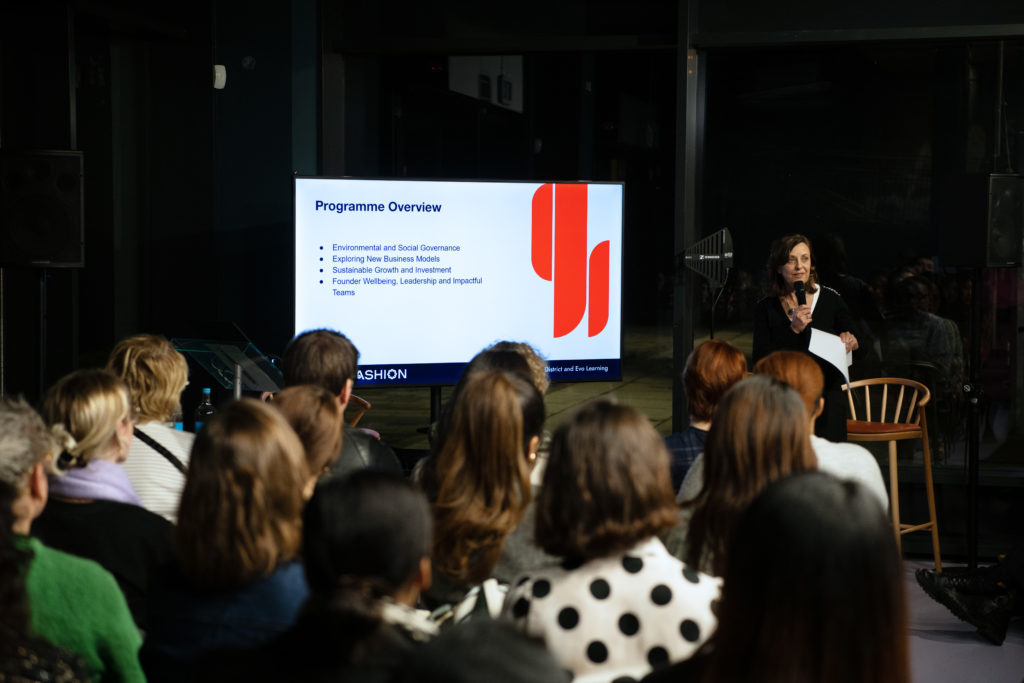
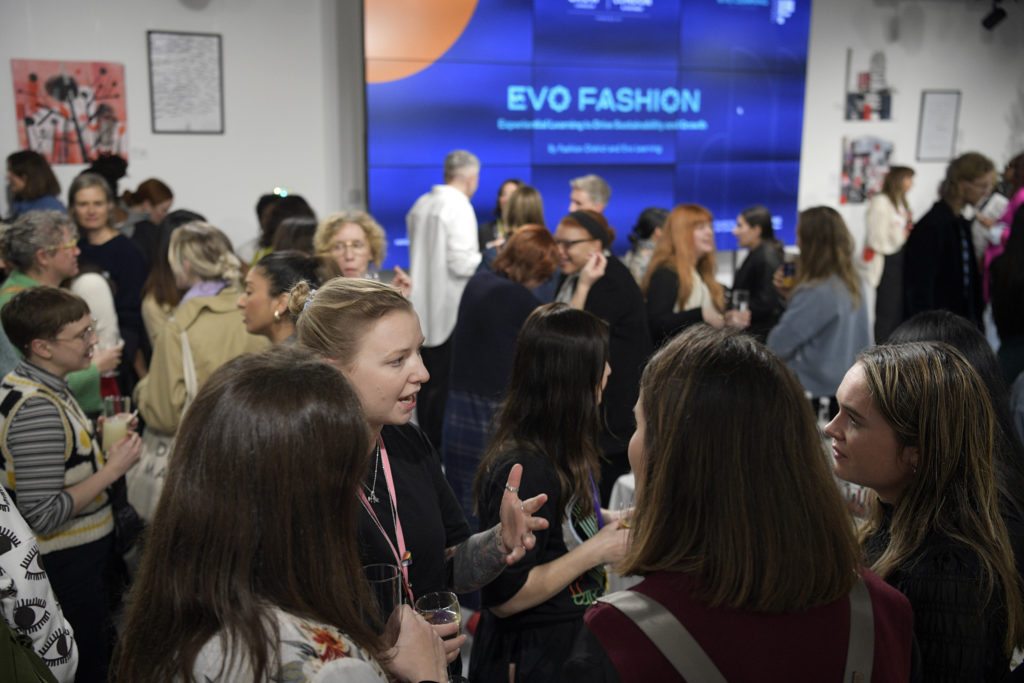
Image credit: Christian Sinibaldi
Evo Fashion in Action
Kicking off the event, Safia Minney, Founder of Fashion Declares, took to the stage with Debbie Luffman, Director of Think Circular, and Ngoni Chikwenengere, Founder of We Are KIN, for the ‘Evo Fashion in Action’ conversation.
Giving context to the need for sustainable innovations, Safia spoke about fashion’s impact on climate ecosystems. ‘We all know that overconsumption is driving a desperate situation. Currently, five percent of greenhouse gas emissions are said to be produced by the fashion and textile industry. That’s set to increase to twenty-five percent by 2050. We can’t let that happen. Fashion needs to move now.’
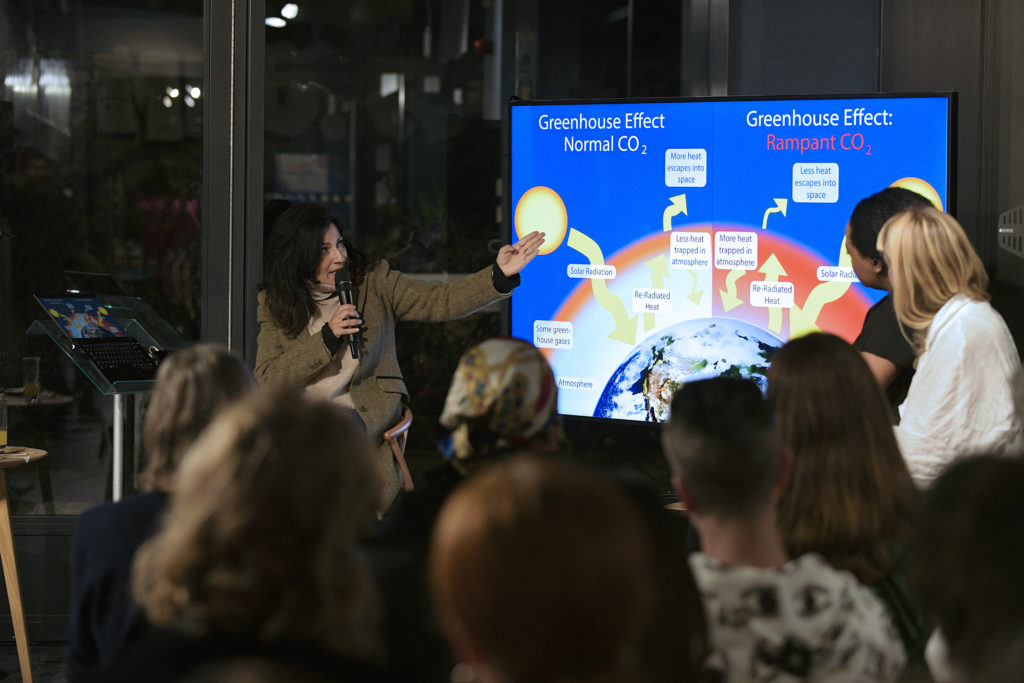
Talking about the ethical and sustainable practices she uses in her clothing brand, We Are KIN, Ngoni Chikwenengere told the audience, ‘One of the first things I wrote down when writing my business plan was my mission statement: ‘people and planet over profit.’ That’s my ethos and it’s what the entire brand is built on.’ Since launching five years ago, Ngoni is still staying true to her brand’s message with all of her clothes being manufactured in East London. ‘I want to know exactly what’s going on so I often drop by the factory because I want to see the conditions people are working in. The people who work there are paid a living wage, they look happy and the environment is clean. In terms of the fabrics, the cotton, linen, and wool are all sourced in the UK. We also use deadstock fabrics.’
When asked for her tips on securing deadstock fabric, Ngoni said, ‘If you don’t ask, you don’t get. It’s important to talk to people and ask lots of questions.’
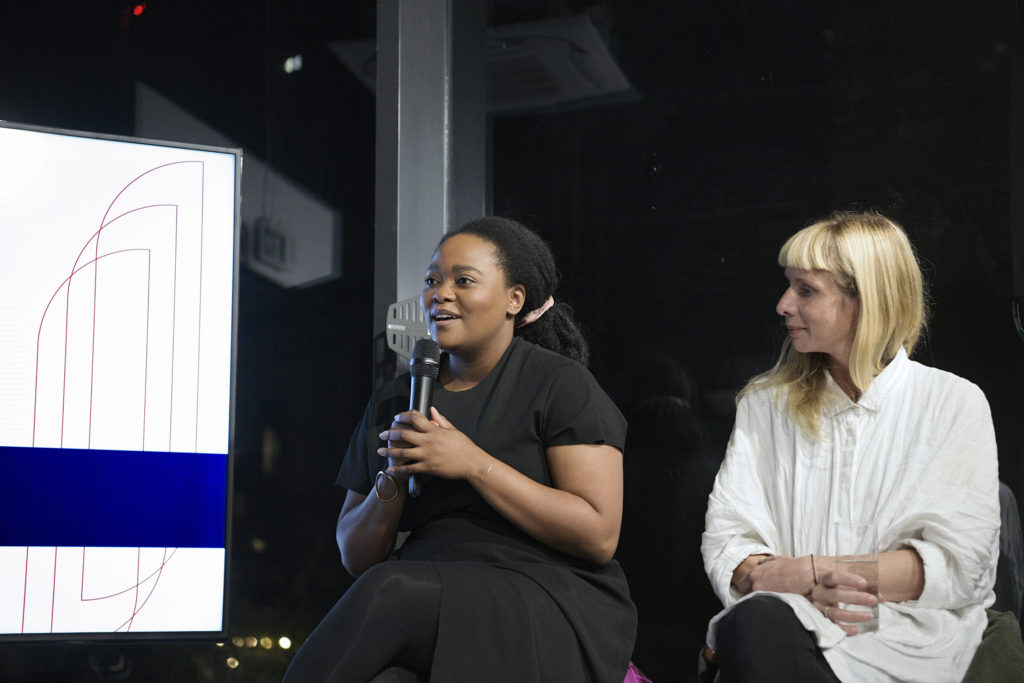
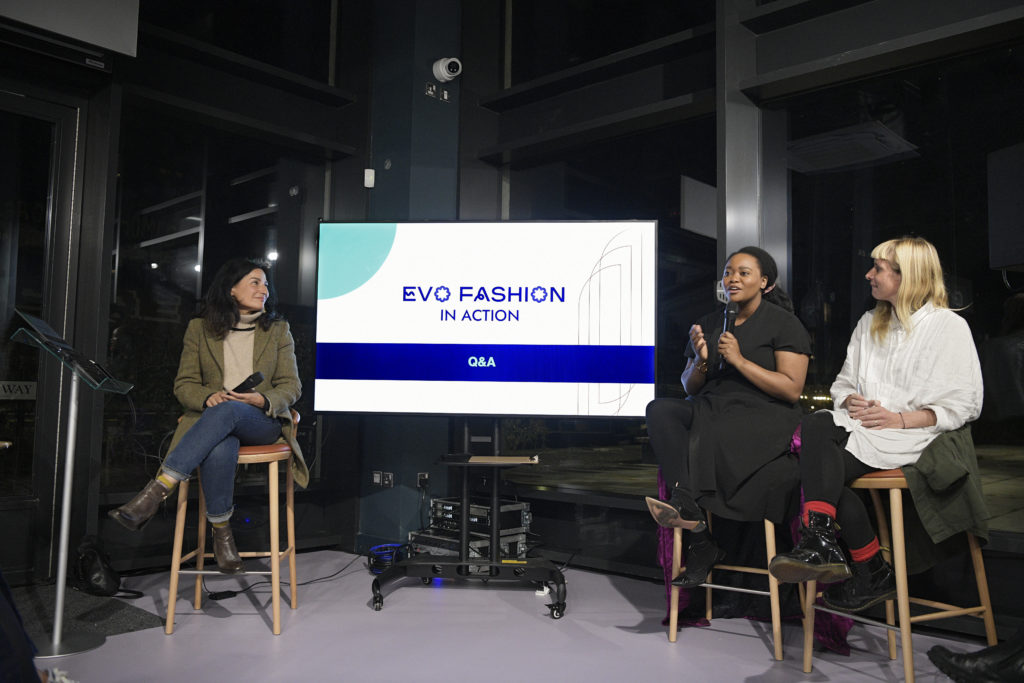
Debbie Luffman, Director of Think Circular, echoed the same sentiment. ‘To become fully sustainable as a brand you have to ask questions and refuse to settle for anything less.’
‘Change in our industry needs to be louder, because the larger organisations are listening – they really are well aware of the issues – but it can be harder for them to change. That’s why I say don’t rush to be a professional outfit too soon. This is your moment to get things right from the beginning stages of your brand and think about embedding sustainability into every aspect of your business, which many big brands are struggling with now.’
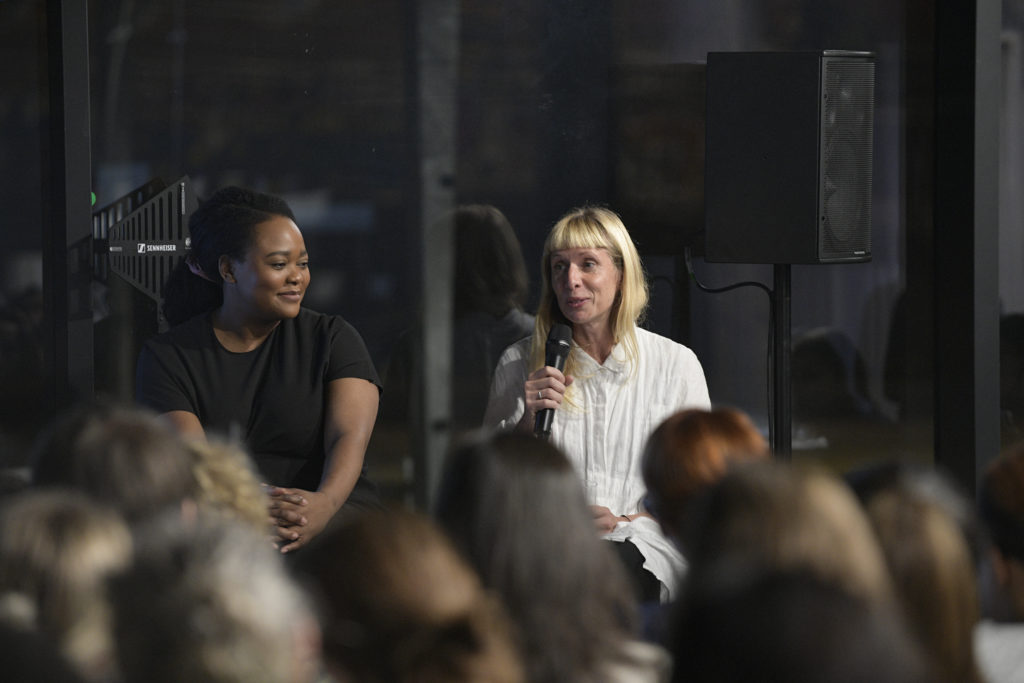
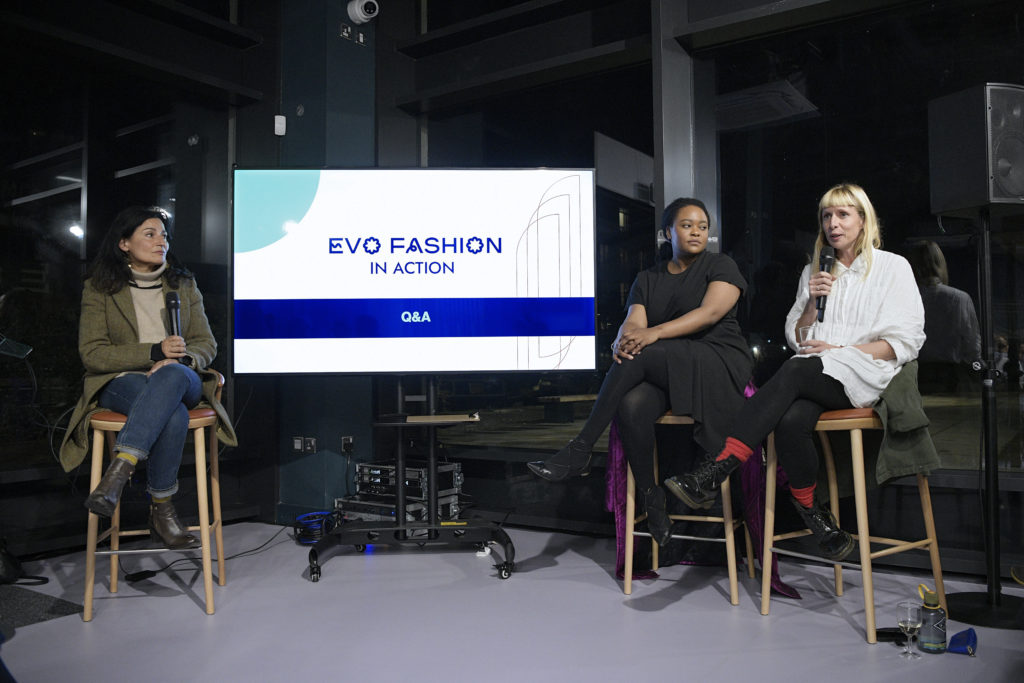
Afterwards the floor opened to questions, with one audience member asking whether consumers were ready for change. ‘Consumers are definitely ready,’ Ngoni said. ‘Shoppers love being at the forefront of innovation. If someone is offering you something new, shiny and sustainable or the same old thing, we all know we would choose the first option. Last November, I sold 800 units in one month, all made to order. The demand is there.’
Debbie said, ‘I think you have to think about the way you make your customer feel. I’m not sure if they care about fabric if I’m really honest with you, but how does it make them feel? Your job is storytelling. Tell the story. Where did it come from? What’s the provenance? What’s it going to do for them? That’s the narrative.’
Another audience member asked whether the panel thought there was competition between small sustainable fashion brands which creates contradiction when setting out to build a better planet. ‘If you share the same value models then you shouldn’t be in competition,’ Debbie answered. ‘In my opinion, IP doesn’t make sense anymore. We should have open source material that’s shared and serves each other. Different brand identities is the creative difference. I think we need to unpack the word ‘sustainable’ and have that open source collaborative mentality to break down those boundaries. You need to build opportunities where you both win.’
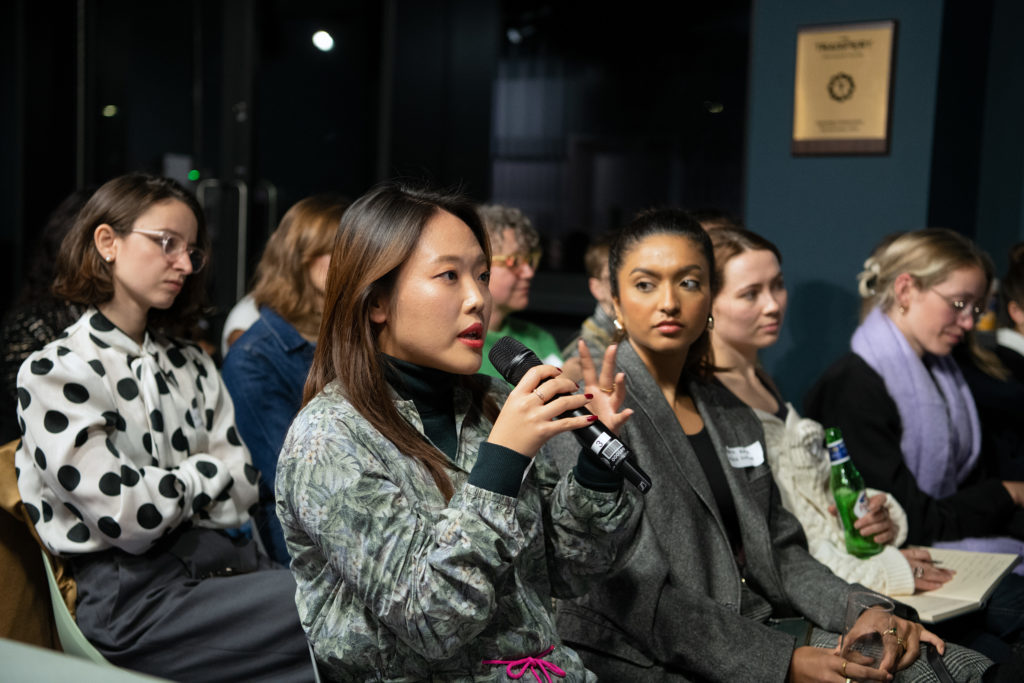
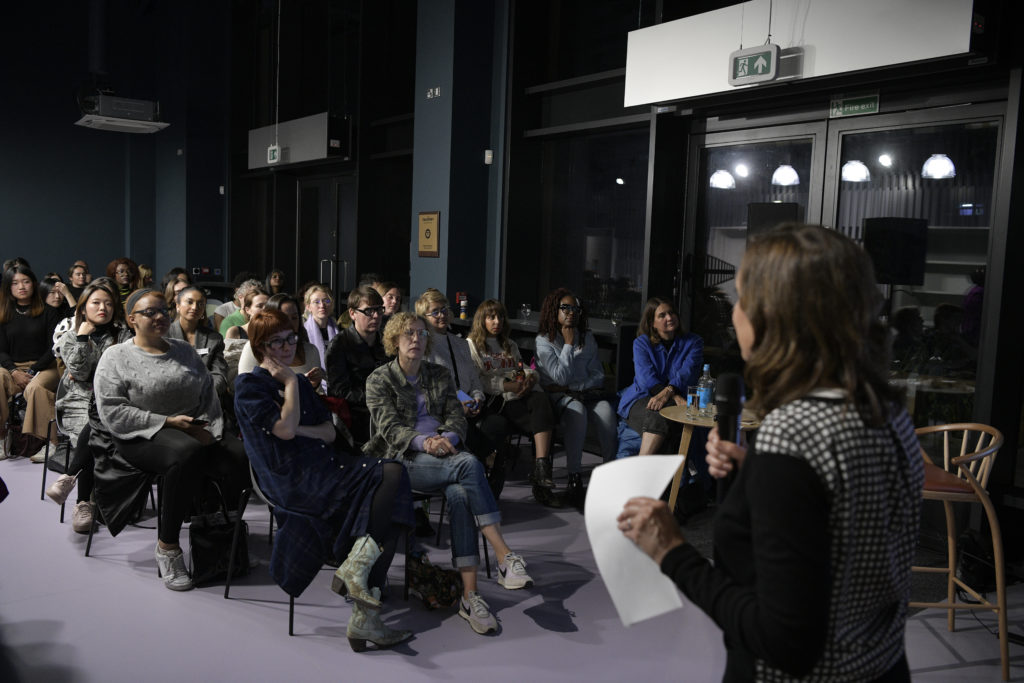
Introduction to Evo Fashion
Next up, Helen Lax took to the stage to present a comprehensive overview of the Evo Fashion programme. ‘There will be two programmes running throughout the year,’ explained Helen, ‘the first for fashion designers and the second for fashion technology businesses. Both are tailored to support innovation across the different subsectors of fashion.’
Designed to fit in with work commitments and delivered by experts, the programme will consist of a two-day intensive launchpad and four full-day masterclasses which will focus on different aspects of learning, including environmental and social governance, exploring new business models, production and innovation, sustainable growth and investment, finance and business planning, and founder wellbeing, leadership and impactful teams. Peppered in amongst the sessions and masterclasses, there will also be panels and talks, a 1-2-1 business diagnostic, three peer-to-peer learning workshops, a creative photoshoot, and the chance to present your brand at Fashion District’s Manufacturing Futures 2024 Industry Showcase to a room full of investors, brands, startups and innovators.
‘In terms of eligibility, you must be a registered business based in London. You must employ 2-5 people and you must have been trading for 18 months,’ said Helen. ‘We have to be able to tell from the application that you want to grow. By this I mean, growing to the scale that you want to grow to in the way that you want to grow. We want to see that you’ve got the ambition to make your business work and succeed sustainably and financially.’
With an incredible selection panel for the first cohort, including Vanessa Podmore, Founder of Podmore Consulting; Yvie Hutton, Director of Design Relations and Membership at the British Fashion Council; Charles Armstrong, CEO of The Trampery, and Helen Lax, Director of Fashion District, applications opened last Wednesday and will close at midnight on 18th January 2024.
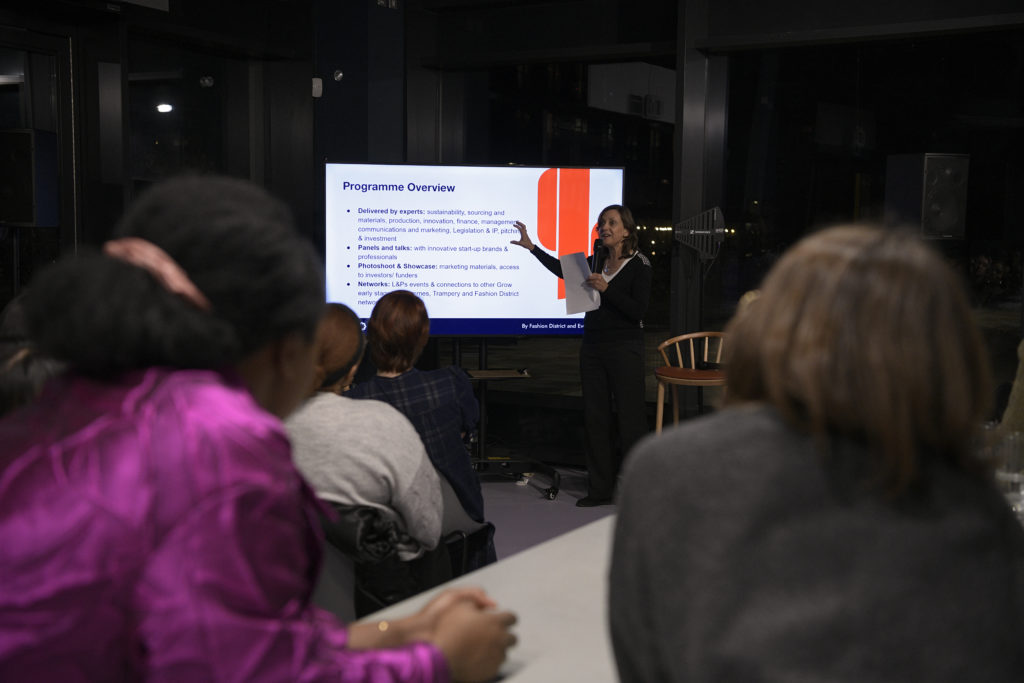

Closing the event, Deborah Latouche, founder of luxury modest wear brand SABIRAH, joined Helen on stage to discuss her experience of our previous sustainable accelerator programme. ‘Despite being held during the pandemic, the programme was really great,’ said Deborah. ‘It solidified for me a lot of the things I was already thinking about. I had always questioned the wholesale model, and so after doing the course I knew it was right for my brand to continue being demi-couture – made to order, made to measure. The fabrics are also all predominately end of life too.’
Speaking about her experience with Vanessa Podmore, who will be one of the Evo Fashion mentors next year, Deborah said, ‘My 1-2-1 masterclass with Vanessa was mind-blowing. She has a world of knowledge and I definitely think the course is well worth applying for.’
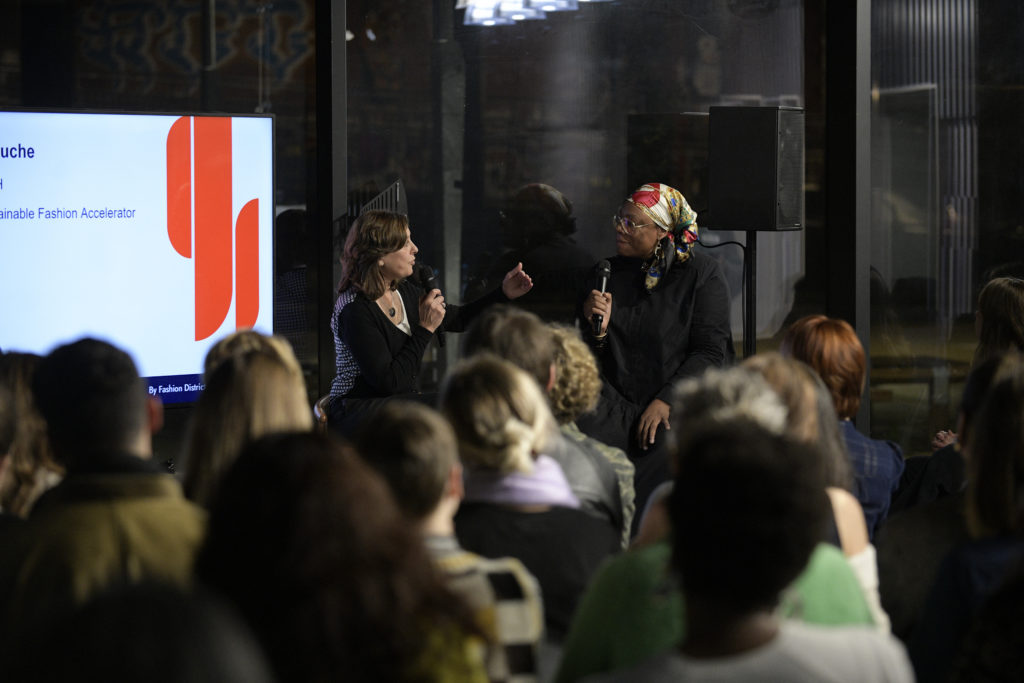
Are you ready to take your business to the next level? Applications for Evo Fashion are now open!
Follow us on Instagram, LinkedIn, Facebook and Twitter to keep up with future events and announcements!
- Instagram: @fd_ldn
- LinkedIn: Fashion District – London
- Facebook: Fashion District London
- Twitter: @fd_ldn
All images by Christian Sinibaldi
Fashion District Festival: Live Showcase – Watch Now!
The Fashion District Festival kicked off in true style with an extraordinary showcase that illuminated East London’s emerging creative talent. Elevating the traditional catwalk experience with physical and digital runways, the showcase also featured interviews with participating designers and creators about the future of the fashion industry. Scroll down to watch the full live broadcast below.
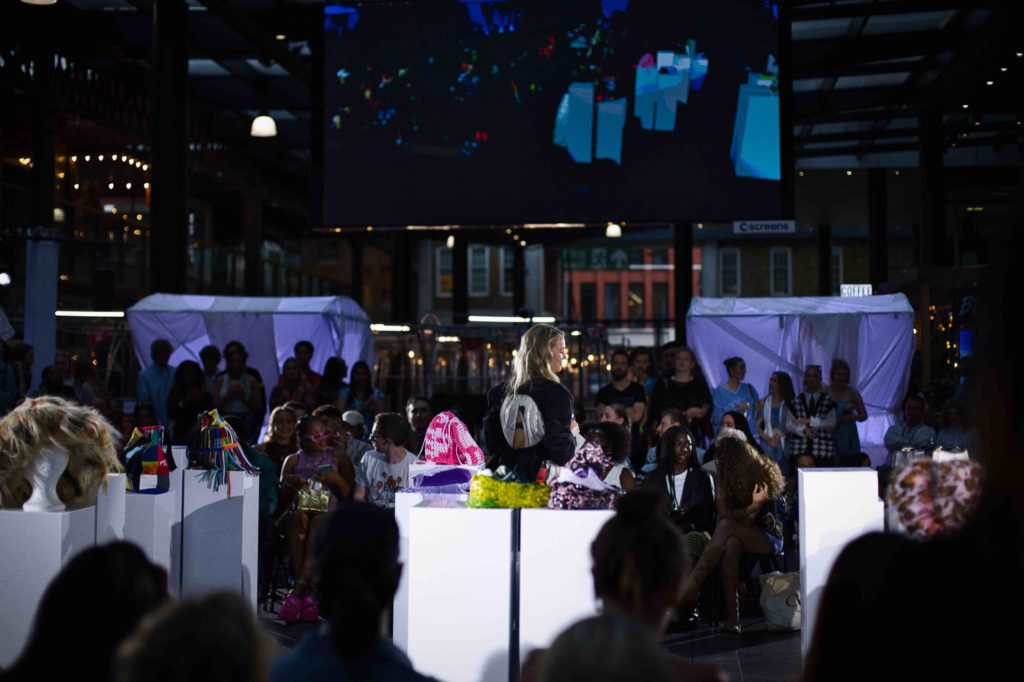
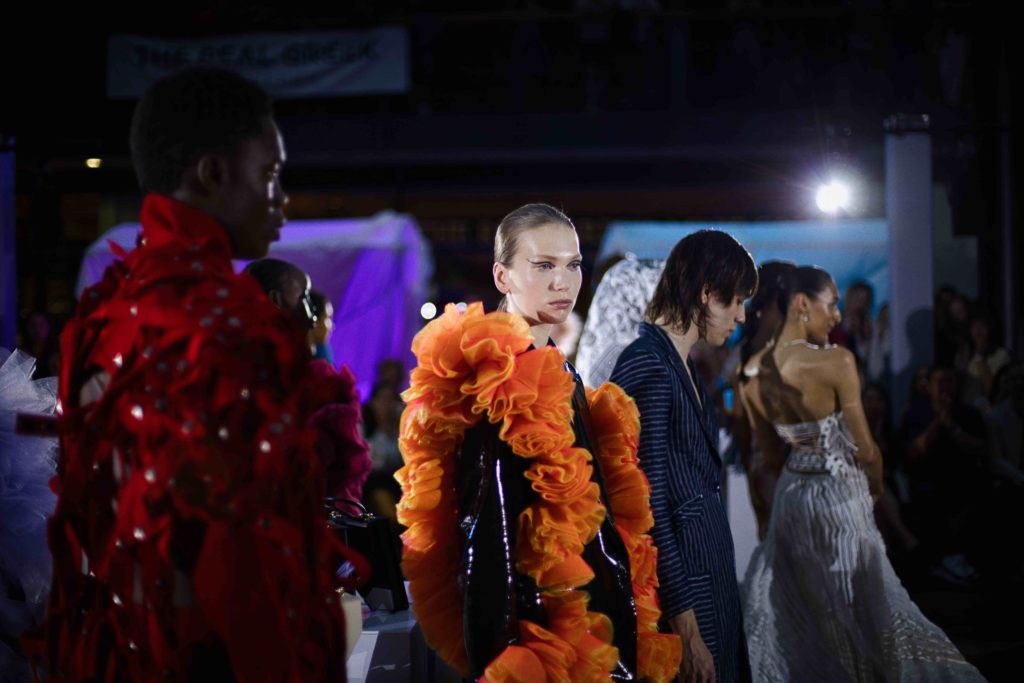
@papi_oyp
Hosted by the fabulous Gemma Care, styled by George Oxby and Angus Cockram from AGRO Studio, and featuring Tanya Tan from Flair Fashion and Joy Craig from Alterist (who were featured in our Festival Pop-Up Shop), the iconic Spitalfields Market set the stage for an unforgettable display of artistry.
Curated by AGRO Studio and Lee Lapthorne from ON/OFF, the show featured London’s most promising emerging designers, showcasing their upcycled, recycled, and sustainable creations.
Lee Lapthorne said, “The ambition of the show is to really support East London talent. We’ve done that by creating a showcase that brings together the true creativity of East London… with a vision of upcycling, recycling, and sustainability. That’s what the industry is driving towards – supporting the planet and the talent that’s here.”
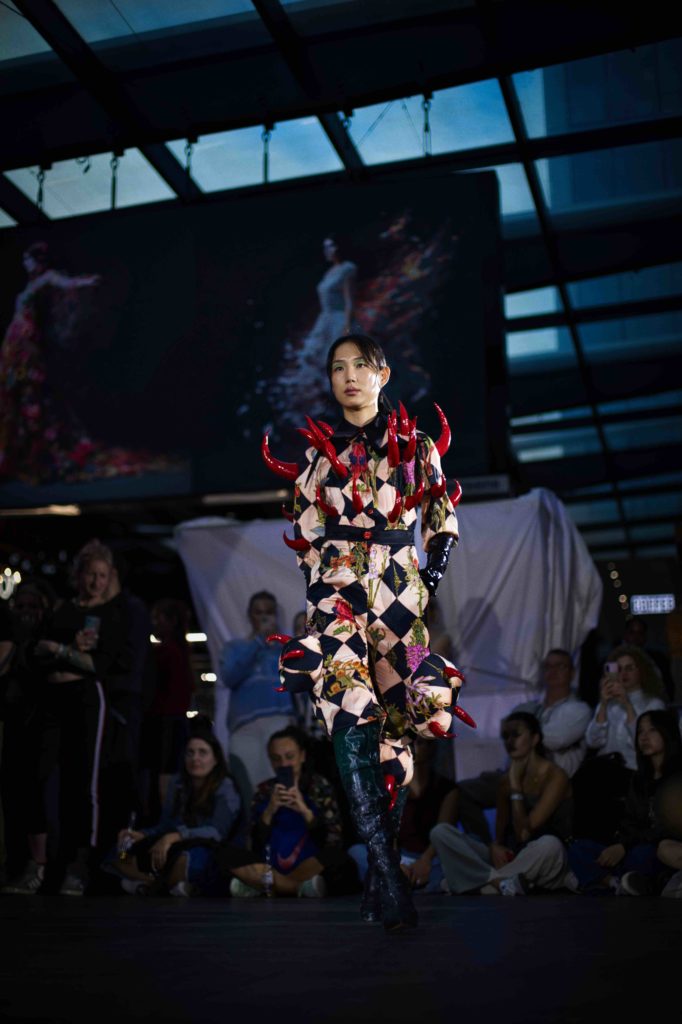
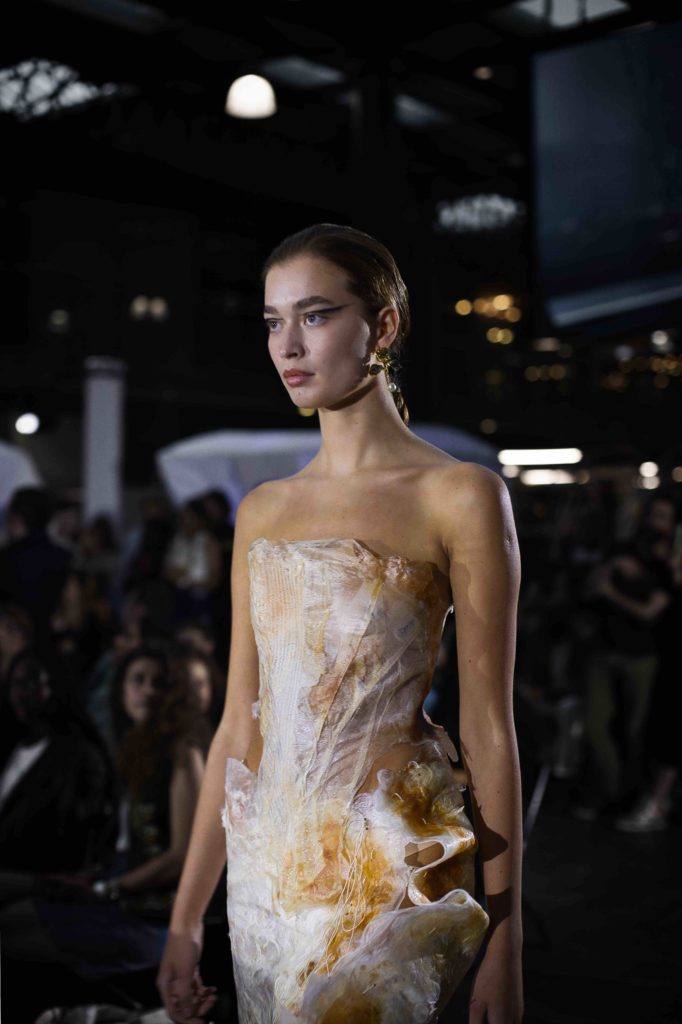
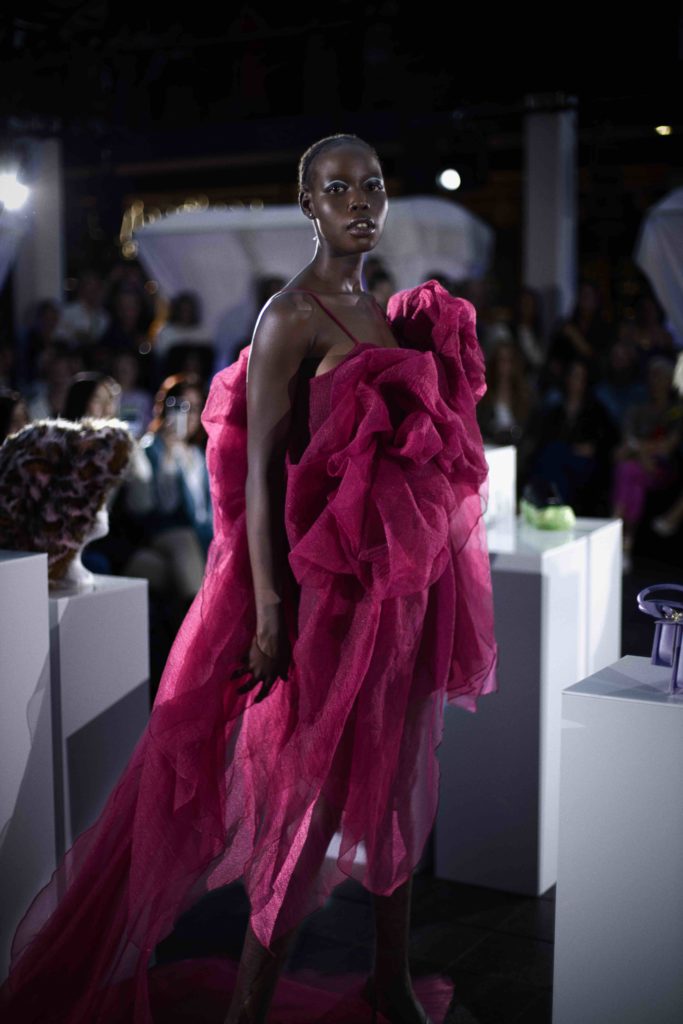
@papi_oyp
Not stopping there, the event also celebrated visionary designers from the rapidly developing digital fashion space. Filmmaker Oscar Keene curated a digital runway, presenting stunning garments from emerging digital designers.
Janey Park, the brilliant brand strategist and content creator, shared her insight into the future of fashion, emphasising collaboration, co-creation, and community. “It’s just fashion at the end of the day. It’s going to be the norm,” Janey remarked, envisioning a seamless blend of digital and physical fashion.
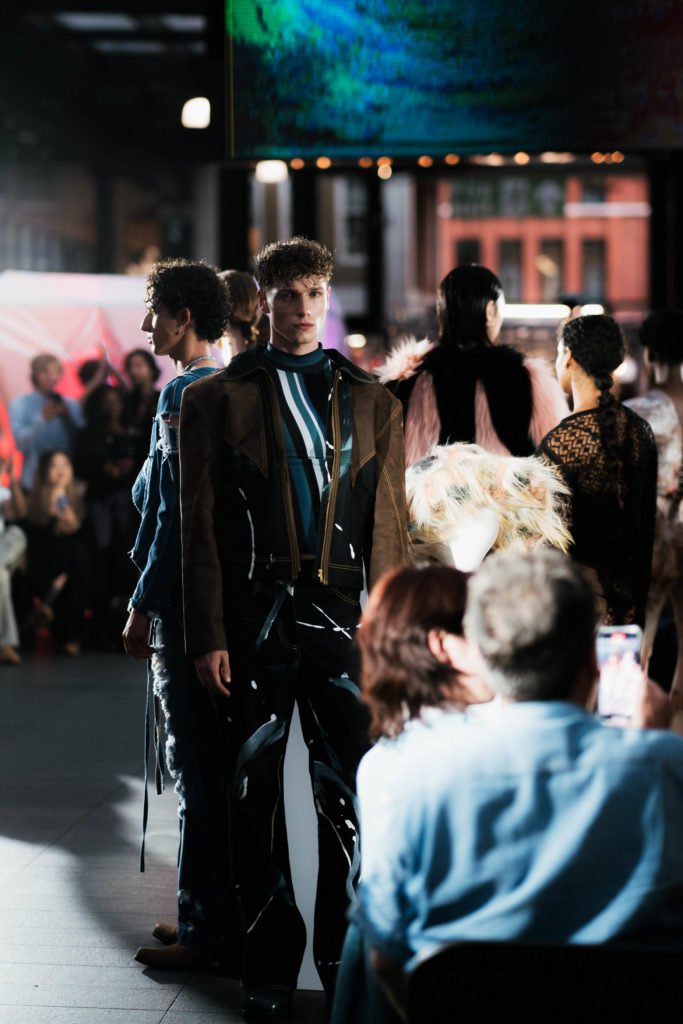
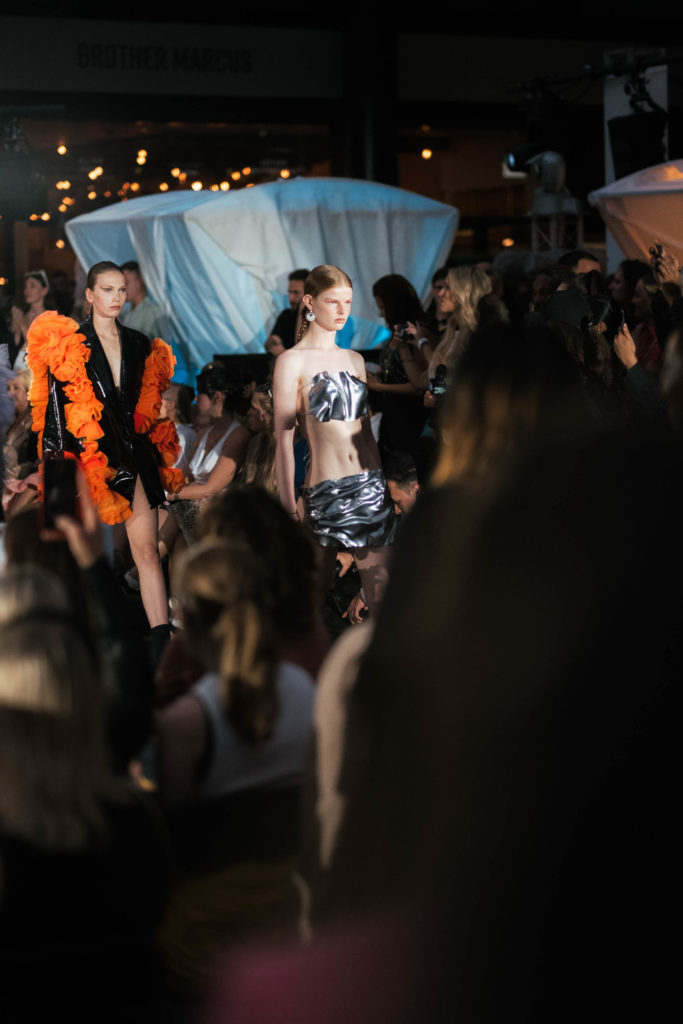

Matt Flynn
The showcase featured interviews with the designers and creators, all united in their mission to revolutionise the future of fashion. Passionate about combining community, processes, techniques, and technology, their dedication to helping create a better industry and world was truly inspiring.
Hannah from Alterist said, “We hope to be a home for all emerging designers within the upcycling space. We want to continue our mission to reduce textile waste and build a positive impact on the planet.”
George Oxby and Angus Cockram from AGRO Studio shed light on the joy and challenges of repurposing materials. “It’s definitely a fun challenge because our job is multifaceted,” Angus added, illustrating their creative process.
Watch the full showcase video here:
Credits to the brilliant minds behind the showcase:
Art direction: Lee Lapthorne, ON/OFF; Styling: AGRO Studio – George Oxby and Angus Cockram; Casting: Sarah Whisker; Production: Congo Blue; Digital Film: Oscar Keene; DJ Set: Jono Jury; Hair by Mark Woolley, Electric Hair, and L’Oreal Professionnel ID Artists; Make-up by Mus Emin.
Designers:
Clementine Baldo, Joshua James Small, Maximilian Raynor, Gyouree Kim, AGRO Studio, Master Bunny, Raquel De Carvalho, Anciela, Buerlangma, Ewelina Szymanska, Florentina Leitner, Kata Haratym, Brian De Carvalho, Maison Lumiere, Paloma Suarez, Cameron Hancock, BELLADONIS, Oscar Keene.
Digital garments:
Oscar Keene, Stephy Fung, Institute of Digital Fashion, Diane Wallinger, House of Autonomy, Roksanda.
Digital Videos / Stills:
Institute of Digital Fashion, The Fabricant, Syky, Stephy Fung, House of Autonomy, Diane Wallinger, Pearl, Sam J, Jacqueline Jade, Morchen, Kapers, Leanne Roksanda, Selene, Miss Mojo, Chrryt, Laura Troncota, Magdalena Mitusinska.
A huge thank you to Feral Film and Broadcast, UAL: London College of Fashion, and our core partners C-Screens and Spitalfields for making this amazing event a reality.
Fashion District Festival Returns for 2023!
The Fashion District Festival is making a highly anticipated return for its second iteration at Spitalfields from 11-16 July 2023.
Taking over the vibrant east London destination, the six-day festival will be a celebration of fashion, sustainability, innovation, and community. Featuring over 40 events, including pop-ups, swap shops, styling masterclasses, upcycling workshops, and interactive experiences, visitors will have the chance to explore, learn, create, and network with leading conscious brands and digital fashion businesses.
This year’s festival covers four themes — WATCH, SHOP, MAKE, and GROW.
The Fashion District Festival will kick off on Tuesday 11 July. As part of the WATCH programme, the launch show, curated by Lee Lapthorne from On|Off and AGRO Studio, will introduce some of London’s most promising emerging designers, combining physical and digital installations, to create a truly unforgettable experience. The week will see further digital showcases and styling events from charity partner Give Your Best.
The SHOP series will feature a collaborative retail pop-up located in a brand-new building at Number 1 Lamb St in Spitalfields – the first event to take place in the contemporary building designed by Foster + Partners. Featuring emerging and planet-positive designers and start-ups, the brands on show specialise in preloved, swapped, rented, and upcycled fashion, such as The Alterist, Loanhood, The Cirkel, Verte London, Circular Threads and The Seam.
SHOP events:
- Rental app Loanhood will host a ‘Get Ready With Us’ event at the pop-up shop, where fashion enthusiasts can try on pieces available for rent or purchase, and curate their weekend wardrobes.
- Clothes swapping company Verte will organise two swap shops for children and adults to refresh their wardrobe.
- Specialist wardrobe care and repair service The Seam will host an open house, where visitors can witness the art of garment restoration and submit items for repair or alteration.
- South Asian preloved and rental fashion platform, Circular Threads, will host a day-long event with the chance to try-on outfits for the wedding season and join in upcycling workshops.
The MAKE space offers a diverse program of interactive events and workshops for all ages, encouraging participants to explore sustainability and innovation in fashion via the three Rs: Repair, Reuse, and Recycle.
MAKE talks and workshops:
- Slow-fashion designer Lydia Bolton will offer visitors the chance to learn hand embroidery techniques to breathe new life into old garments.
- Upcycled fashion marketplace The Alterist will host workshops by talented designers from their community.
- Making for Change will host engaging workshops for families and children, which will keep the little eco-warriors busy for an entire afternoon.
- Slow fashion brand Revival London will share ways to re-work preloved denim into unique and stylish pieces
The GROW programme is dedicated to supporting fashion start-ups and SMEs through a series of roundtables, talks, and workshops that delve into the ideas and innovations driving change within the industry, including themes such as the circular economy, regenerative materials, digital fashion, design for the metaverse, early-stage investment and more.
GROW talks and workshops:
- The week will hear from an exciting line-up of speakers including: Fashion (Minority) Report, Innovate UK, UKFT, ReLondon, Fashion Innovation Agency, The Trampery, True., and The WIP.
- Captivate Communications will be running pitching workshops, offering valuable insights and guidance for aspiring fashion entrepreneurs looking to secure funding.
- In collaboration with True Global, the festival will host an investment event featuring a panel discussion with angel investors, VCs, and established brands. The interactive session will provide start-ups with an overview of what investors and brands seek and offer valuable tips for success.
- Fashion Innovation Agency will host a fash-tech meet-up, discussing AI and the most promising and innovative applications in the fashion industry.
- Social enterprise The Trampery will come together with Fashion District to host Fashion Circle, a dynamic event on preloved fashion including a brunch, two panel events with pioneering industry figures, and a speed networking session.
Jason Dervin, General Estate Manager at The Spitalfields Estate, says, “We are proud to host the ever-inspiring Fashion District Festival and donate four spaces for the events in our newly created units and basement studio space. Celebrating and supporting multiple sustainable start-ups, emerging talent and brands in this dynamic way sits perfectly alongside our existing retail and F&B operators, and we hope to see everyone at the Festival in Spitalfields this July.”Bookings are now open! Don’t miss your chance to secure a spot at each of the incredible events – click here to see the lineup so far. Stay tuned for more event announcements and exciting speakers coming soon!
Bookings are now open! Don’t miss your chance to secure a spot at each of the incredible events – click the button below to see the lineup so far.
Follow our socials to stay tuned for more event announcements and exciting speakers coming soon!
- Instagram: @fd_ldn
- Facebook: Fashion District London
- LinkedIn: Fashion District – London
- Twitter: @fd_ldn

